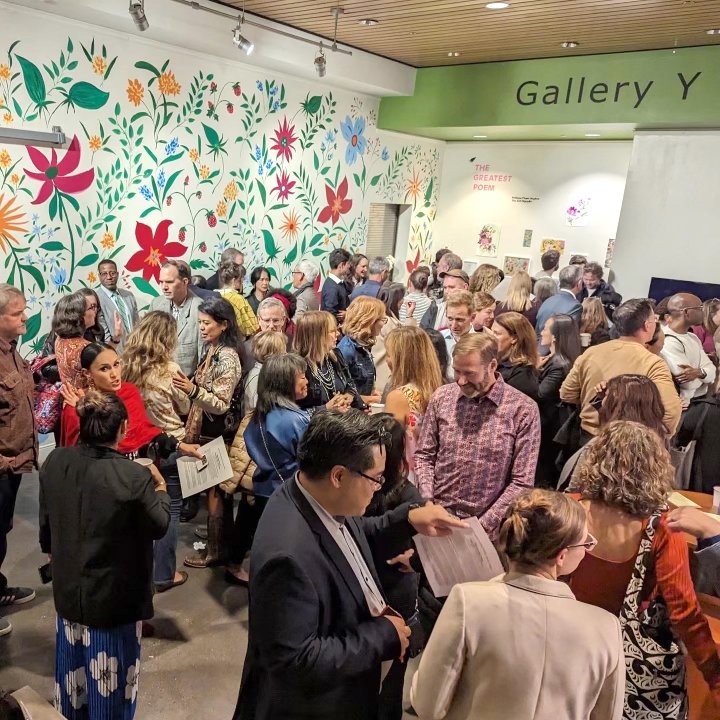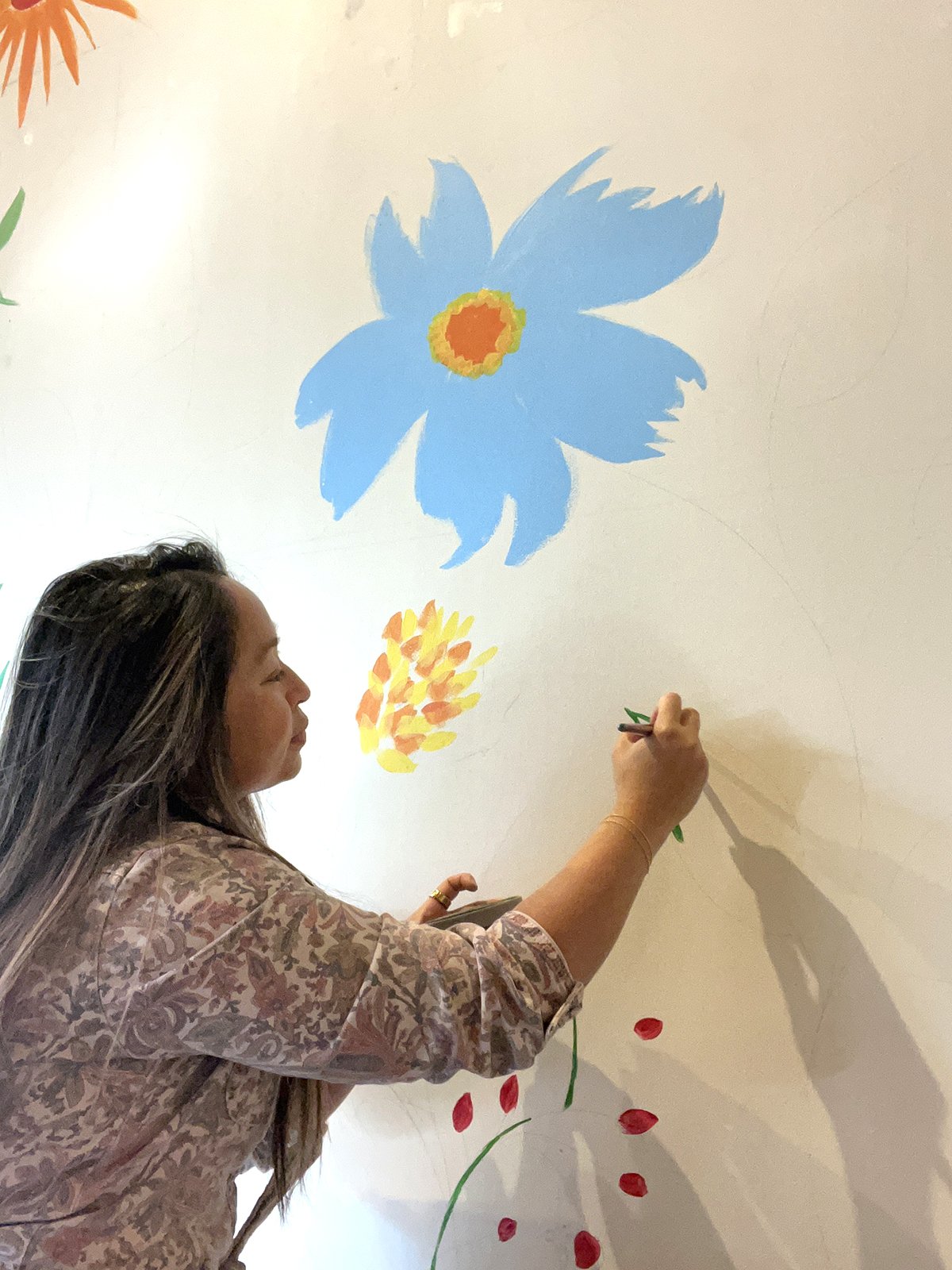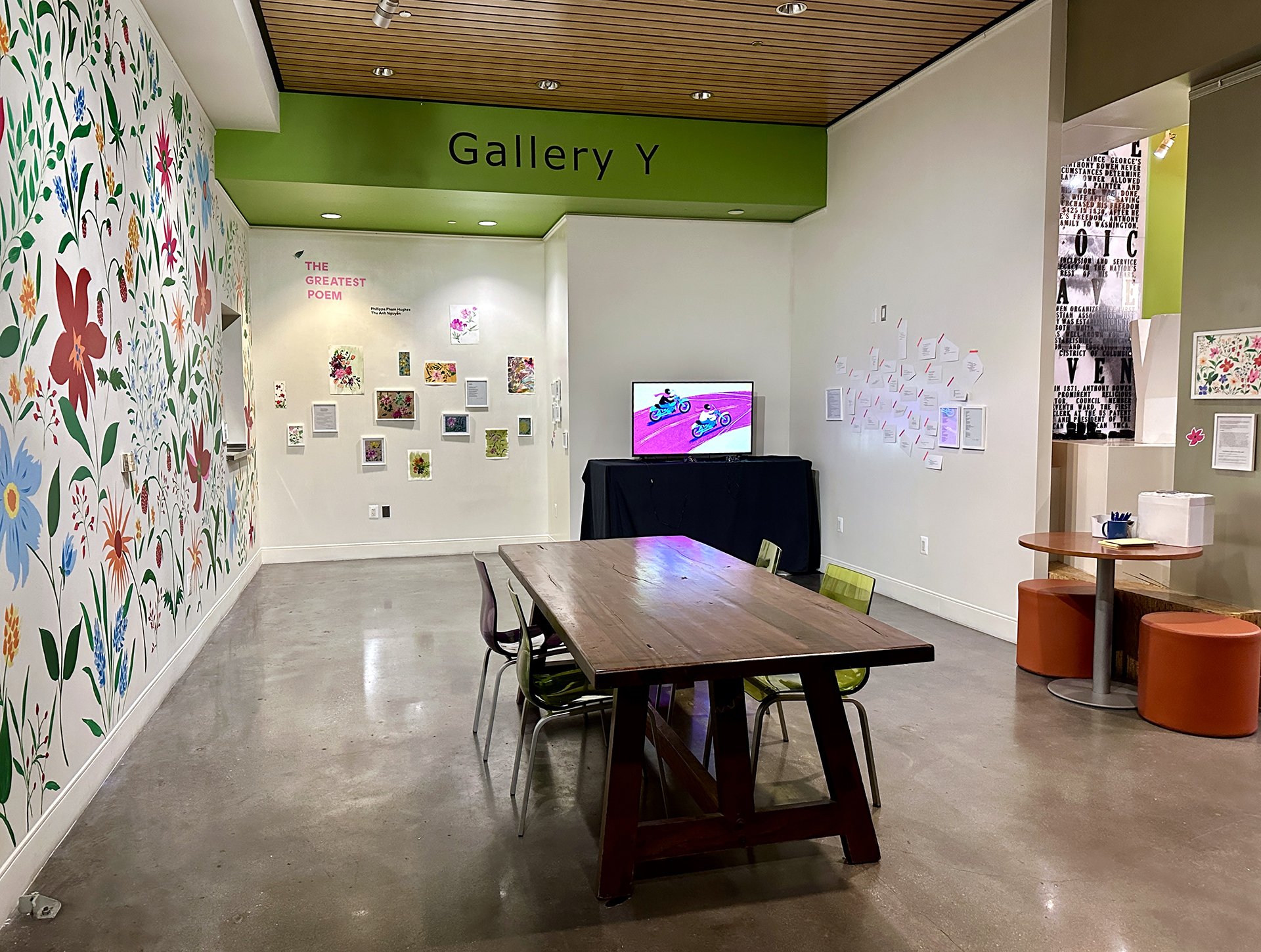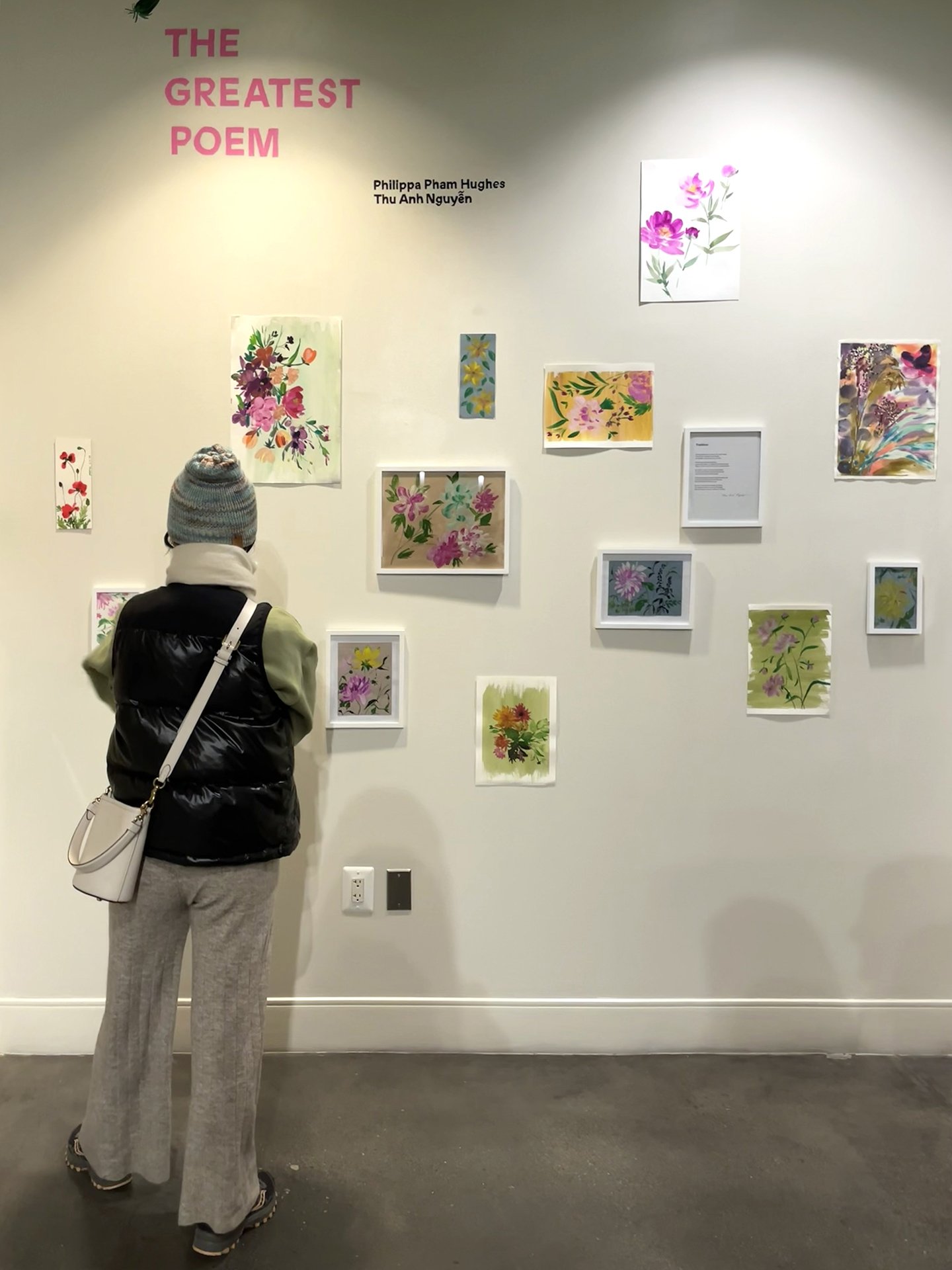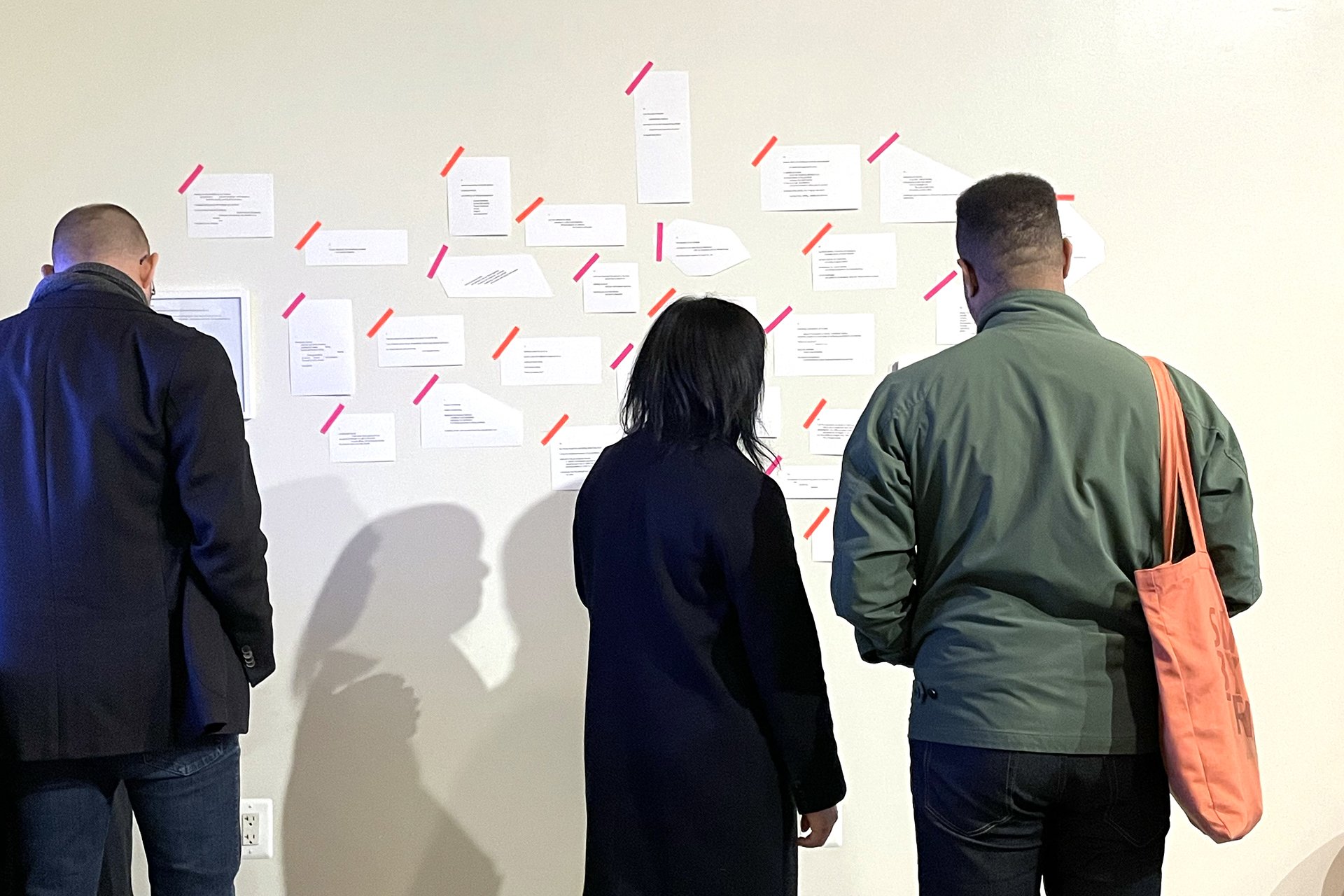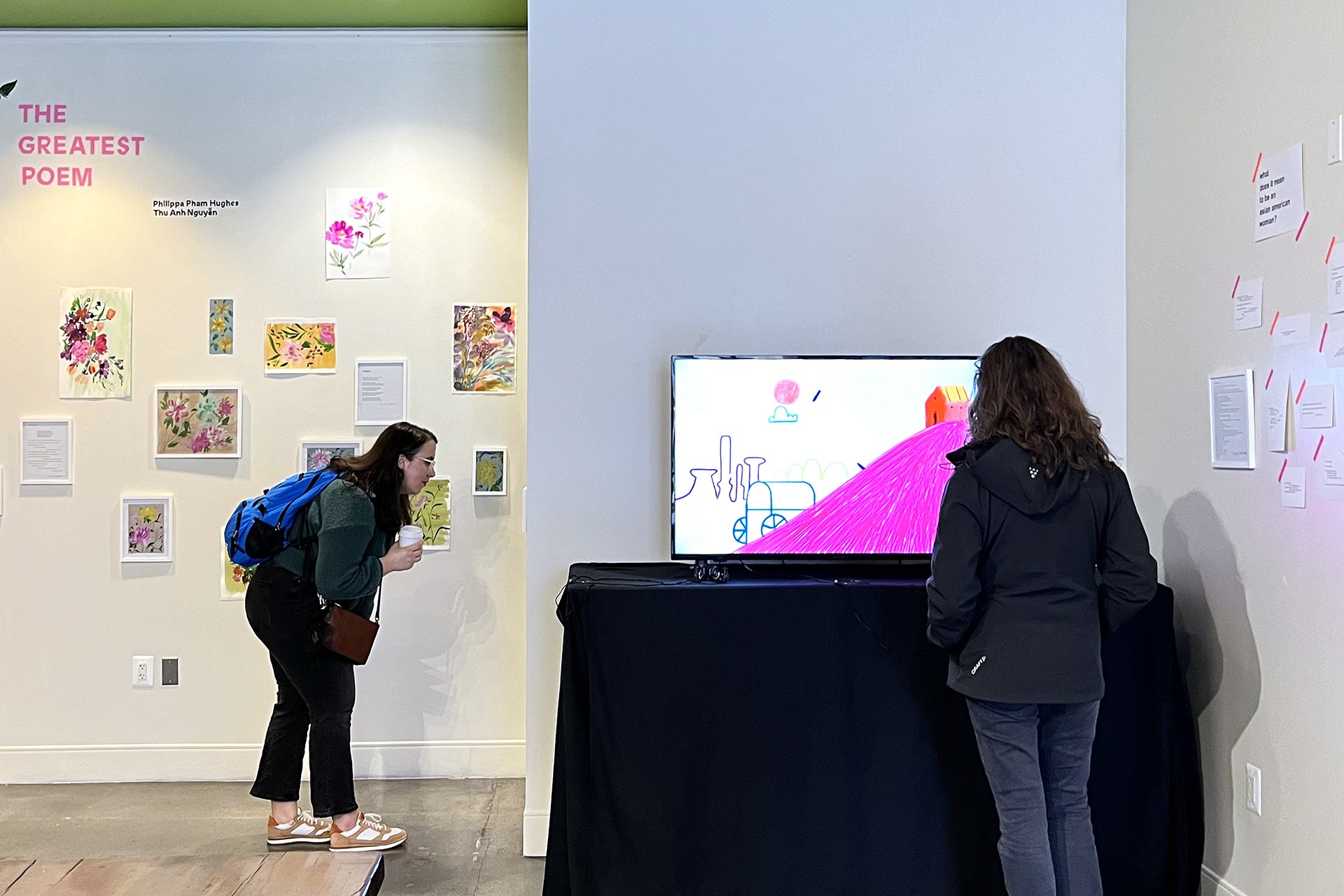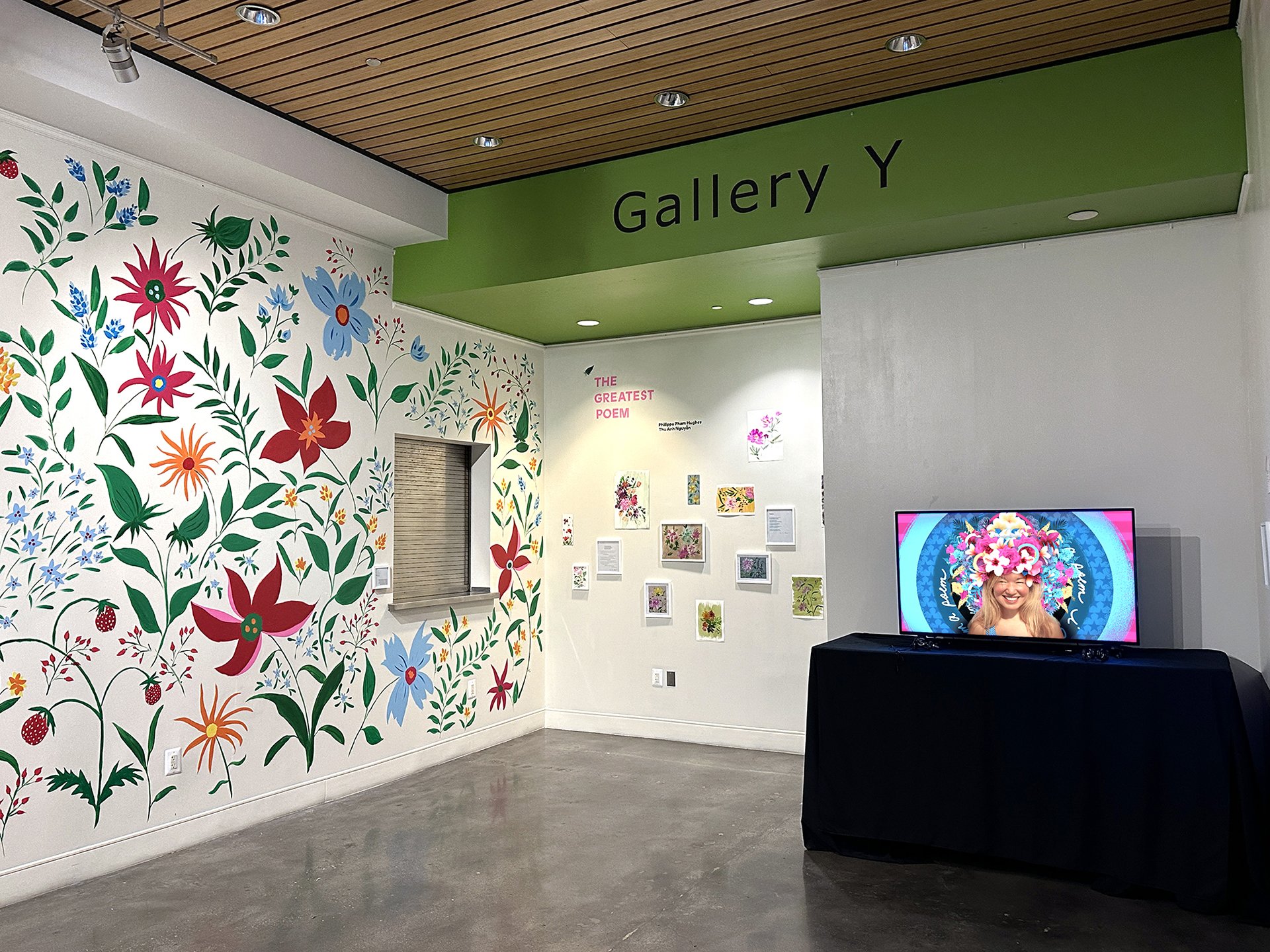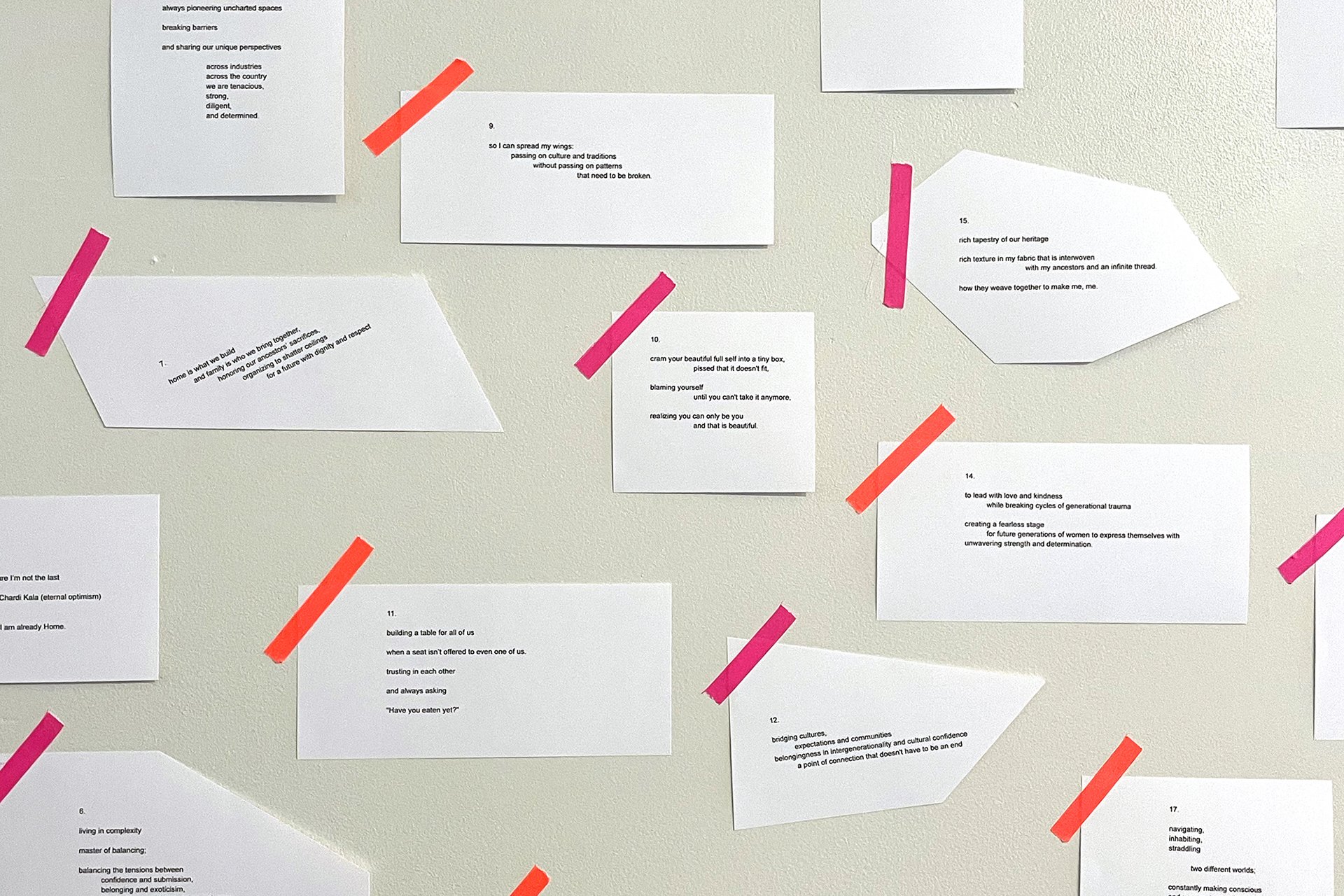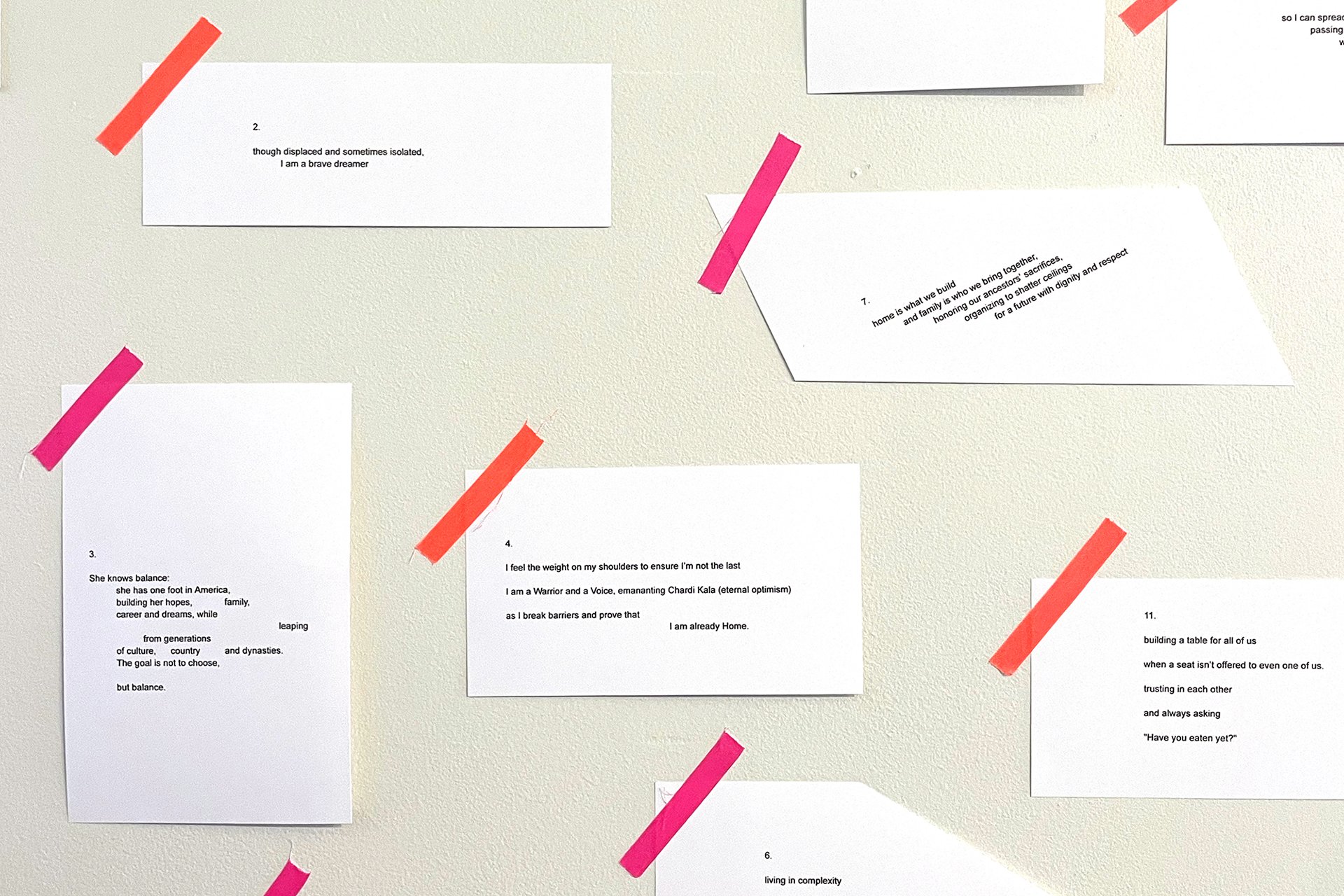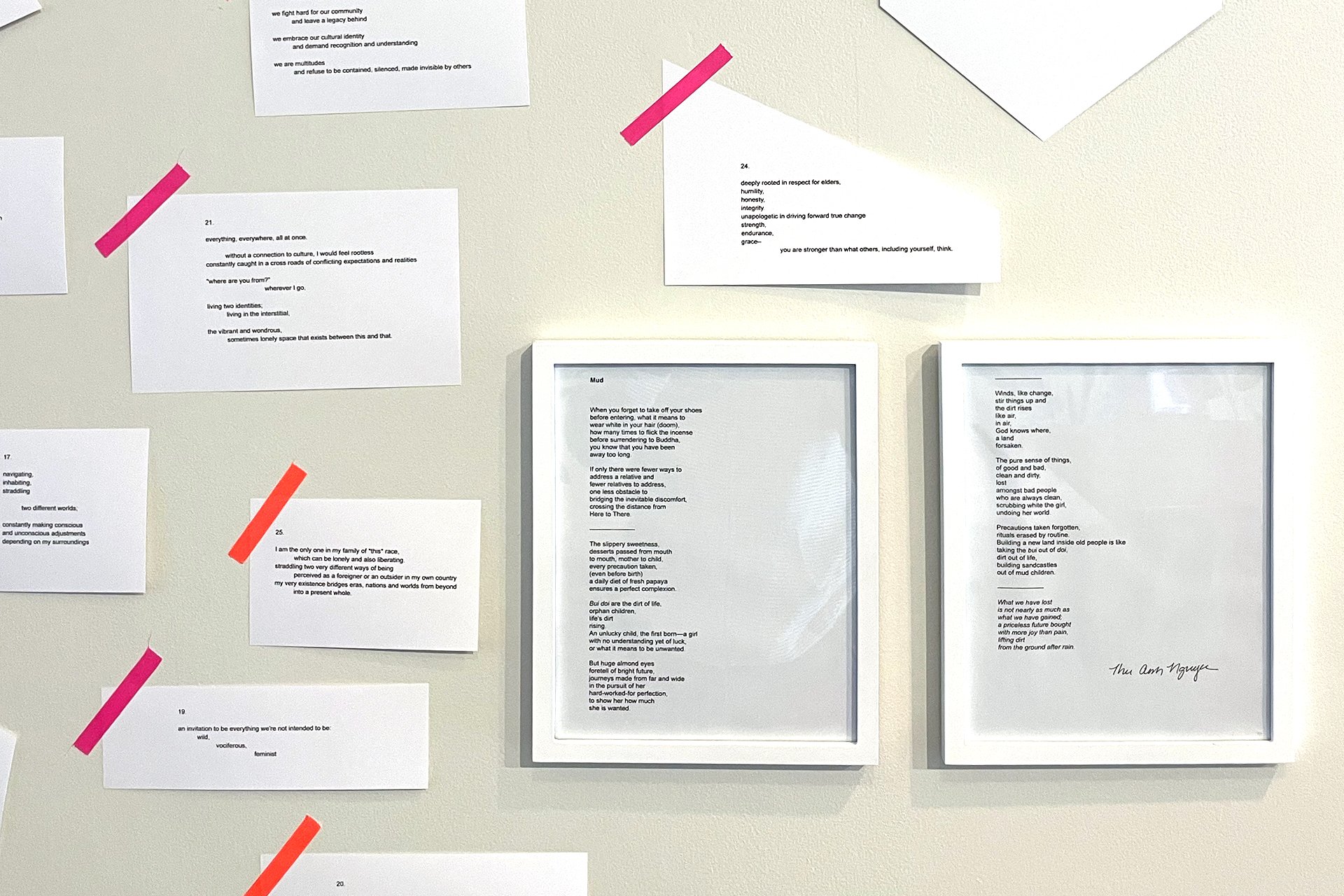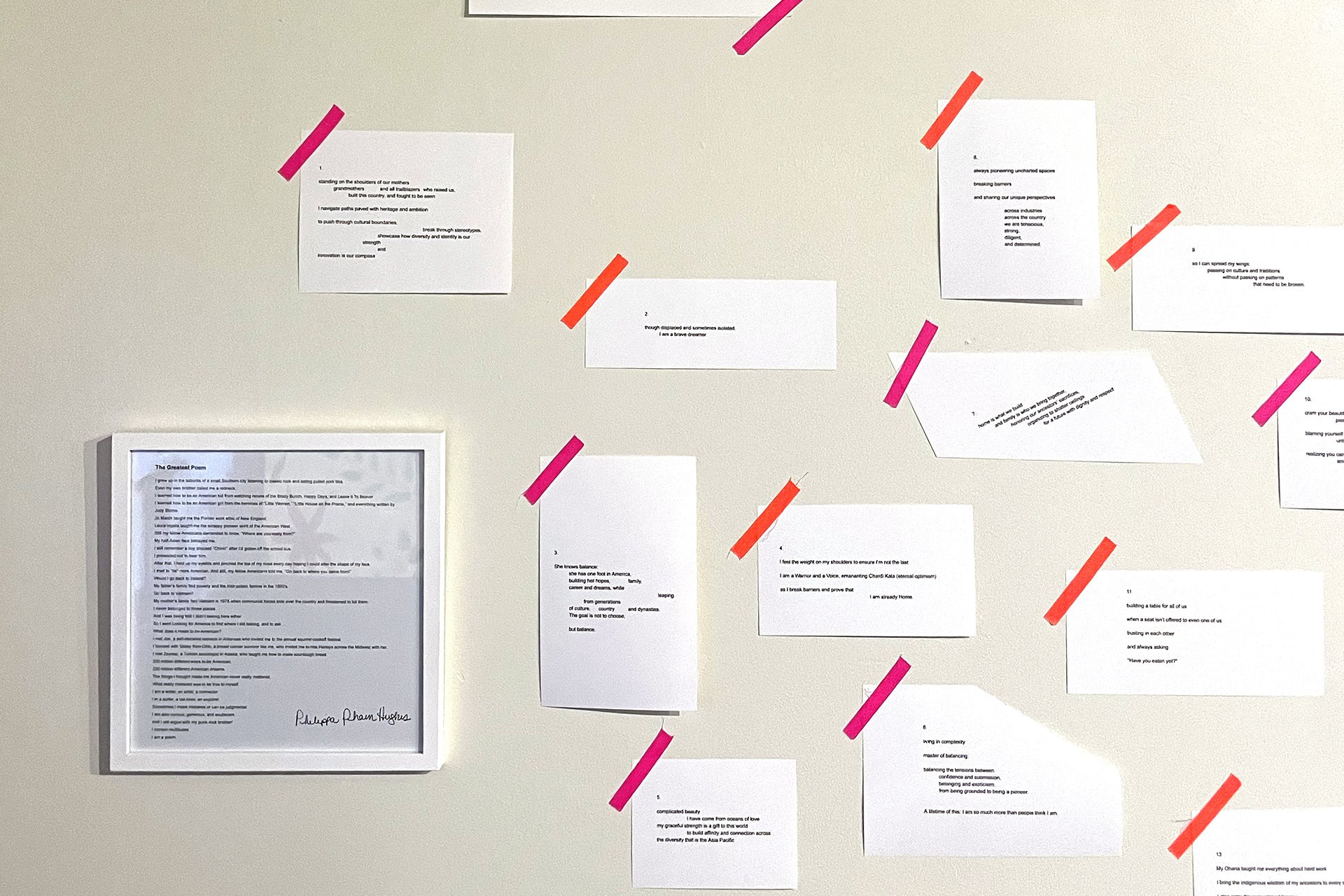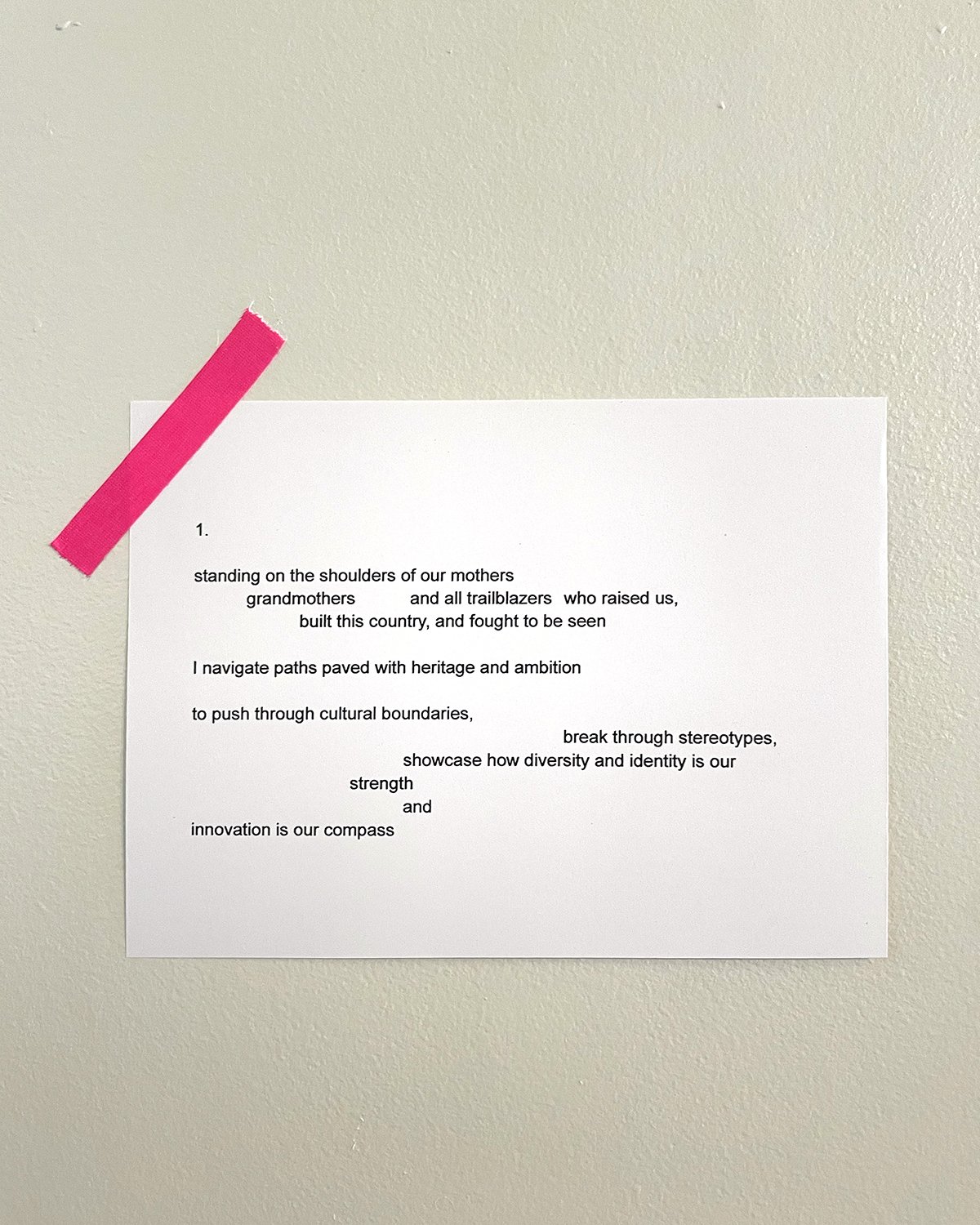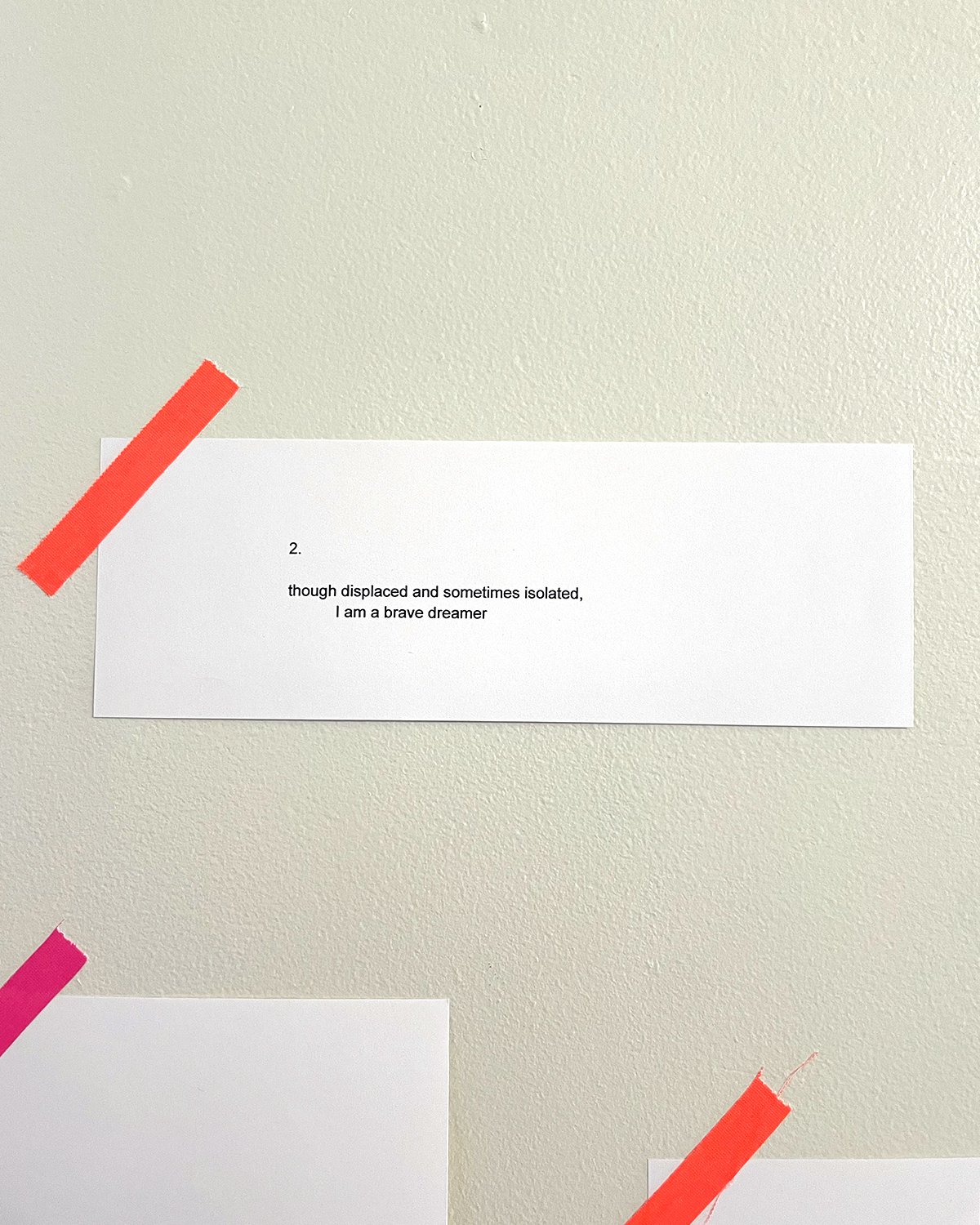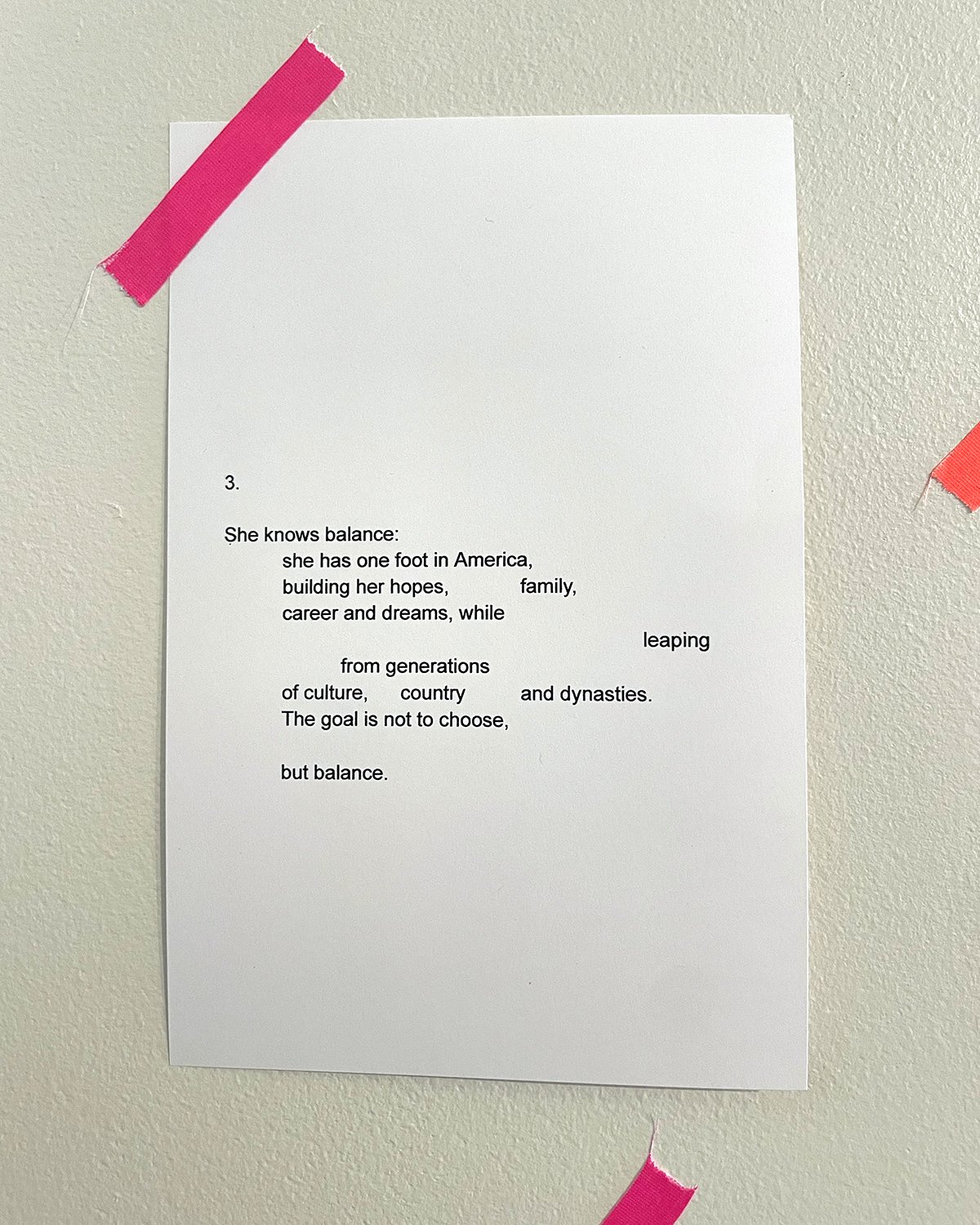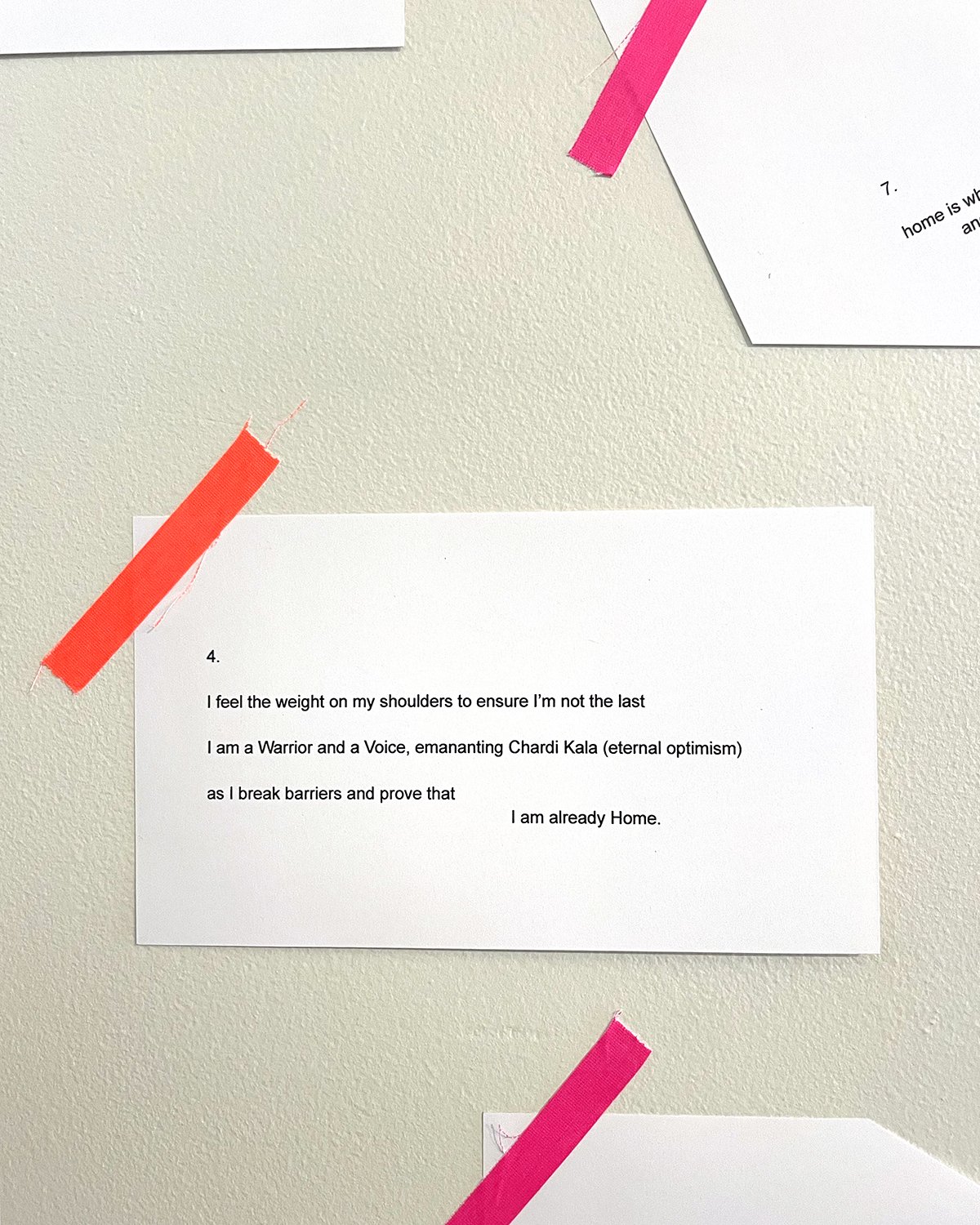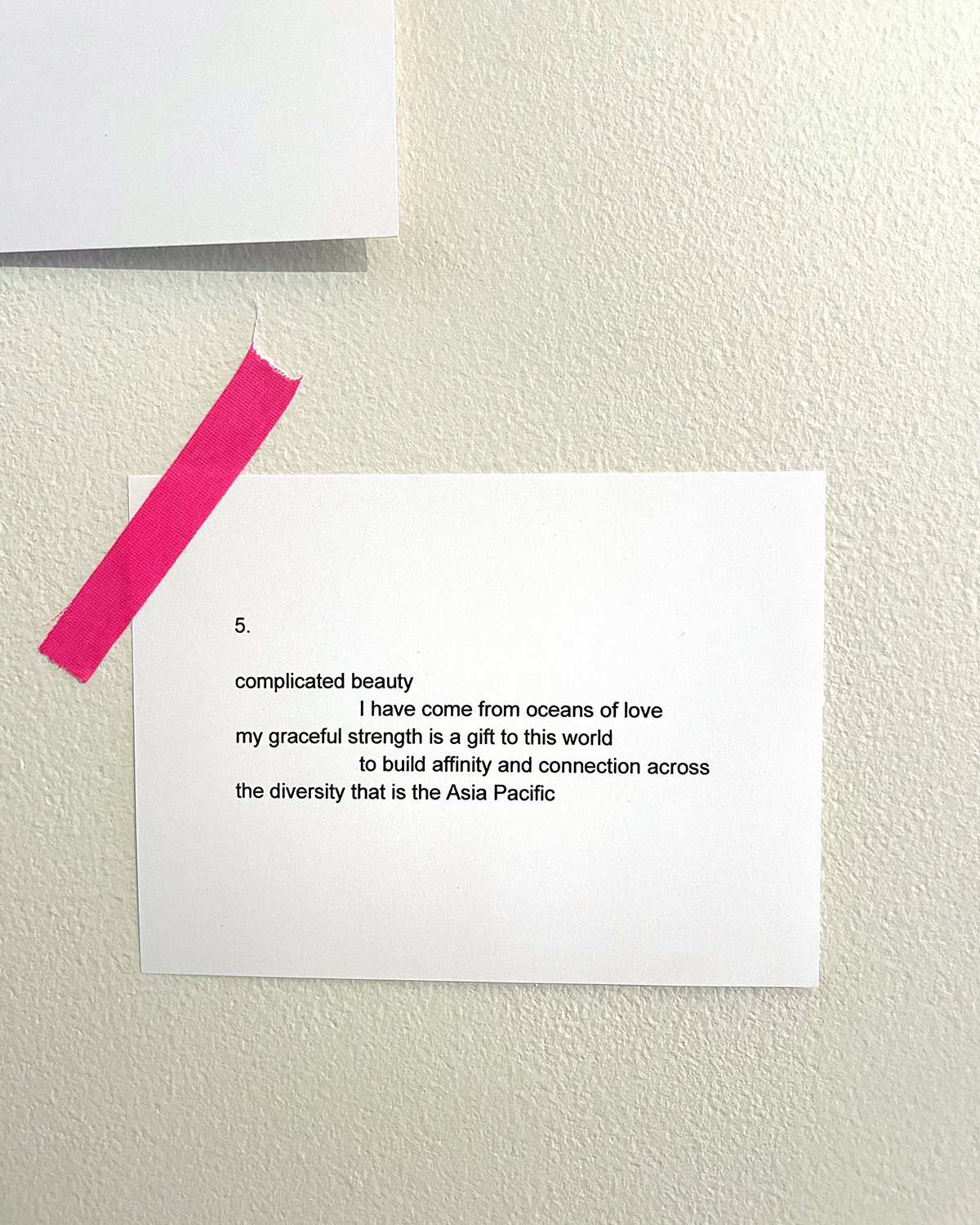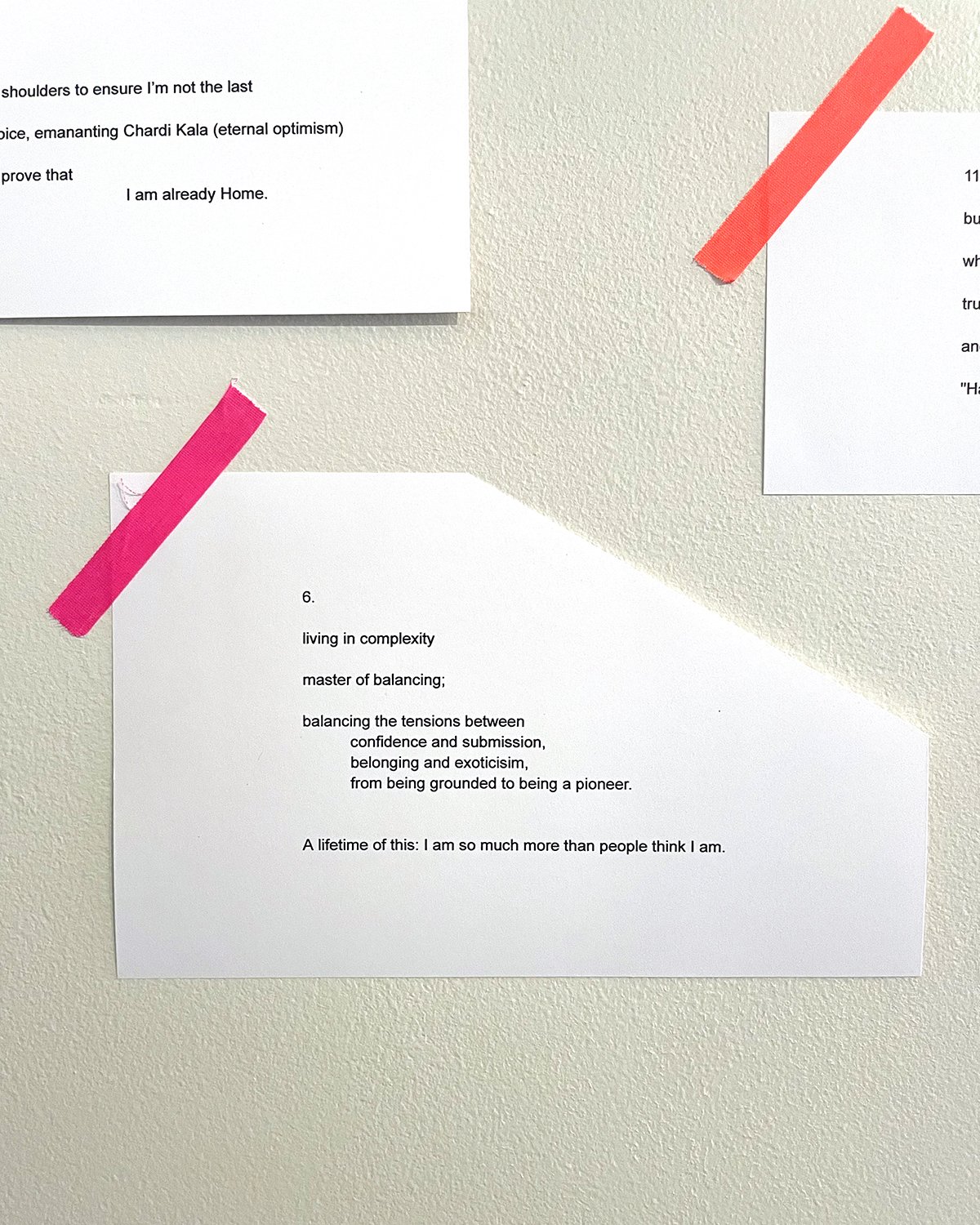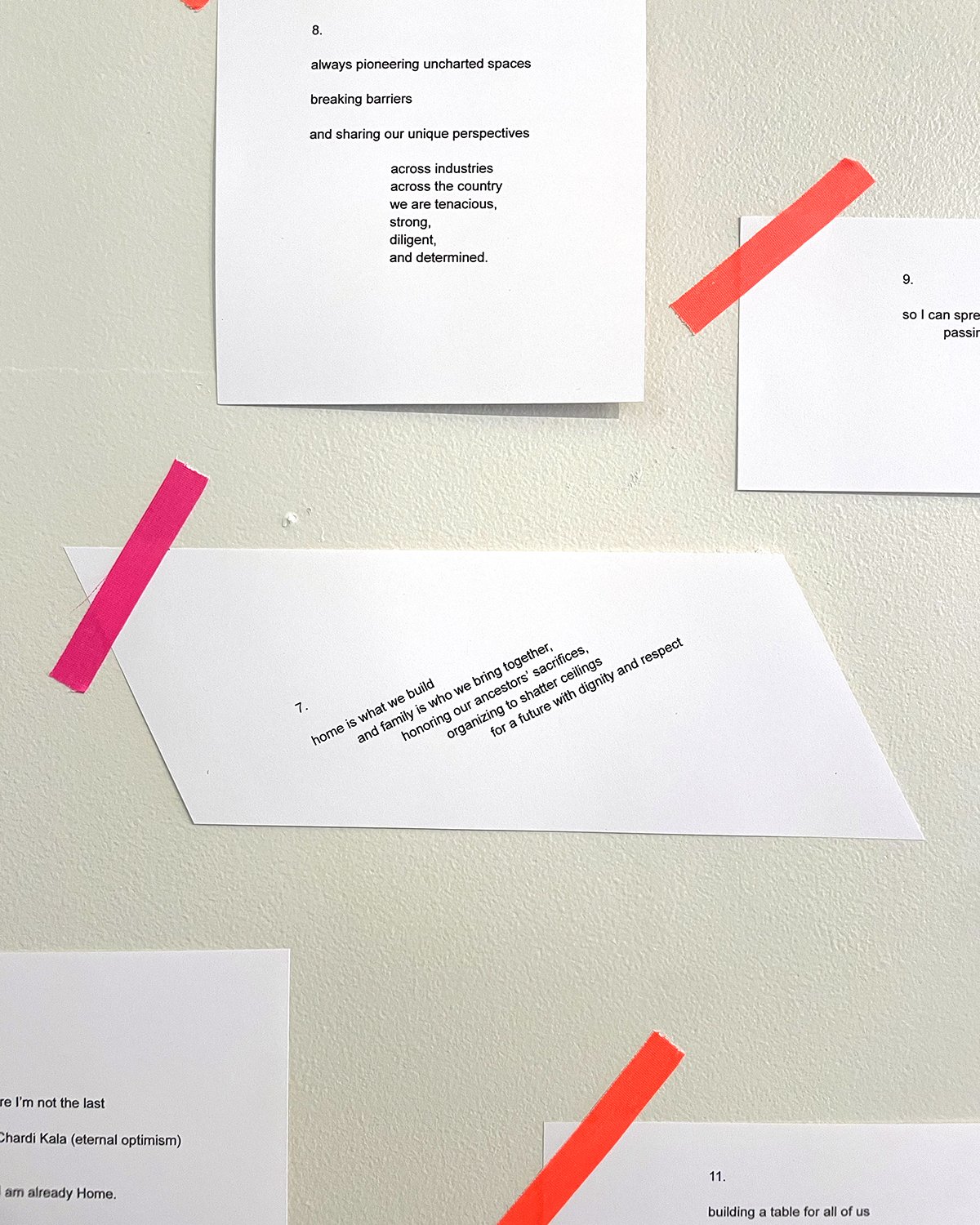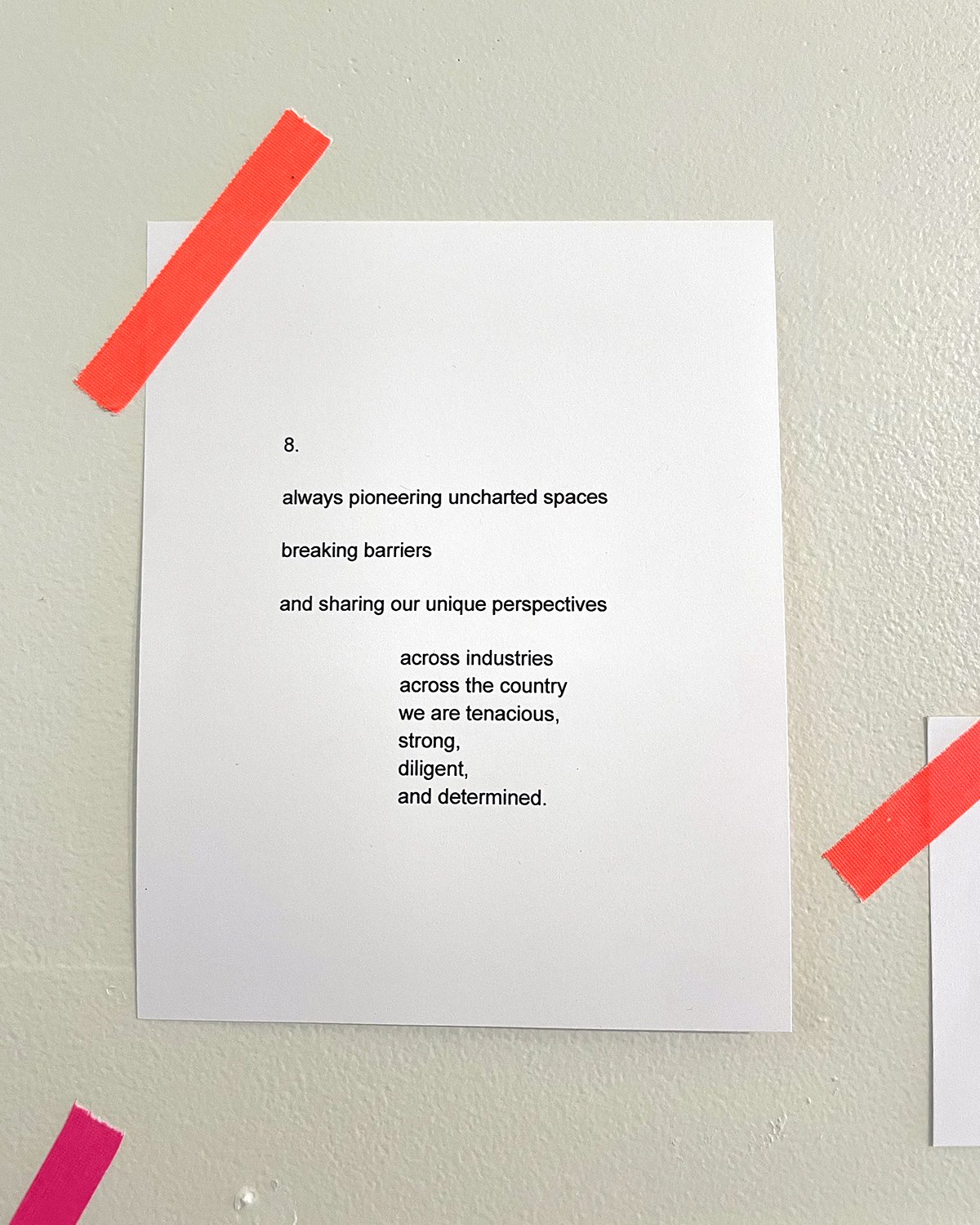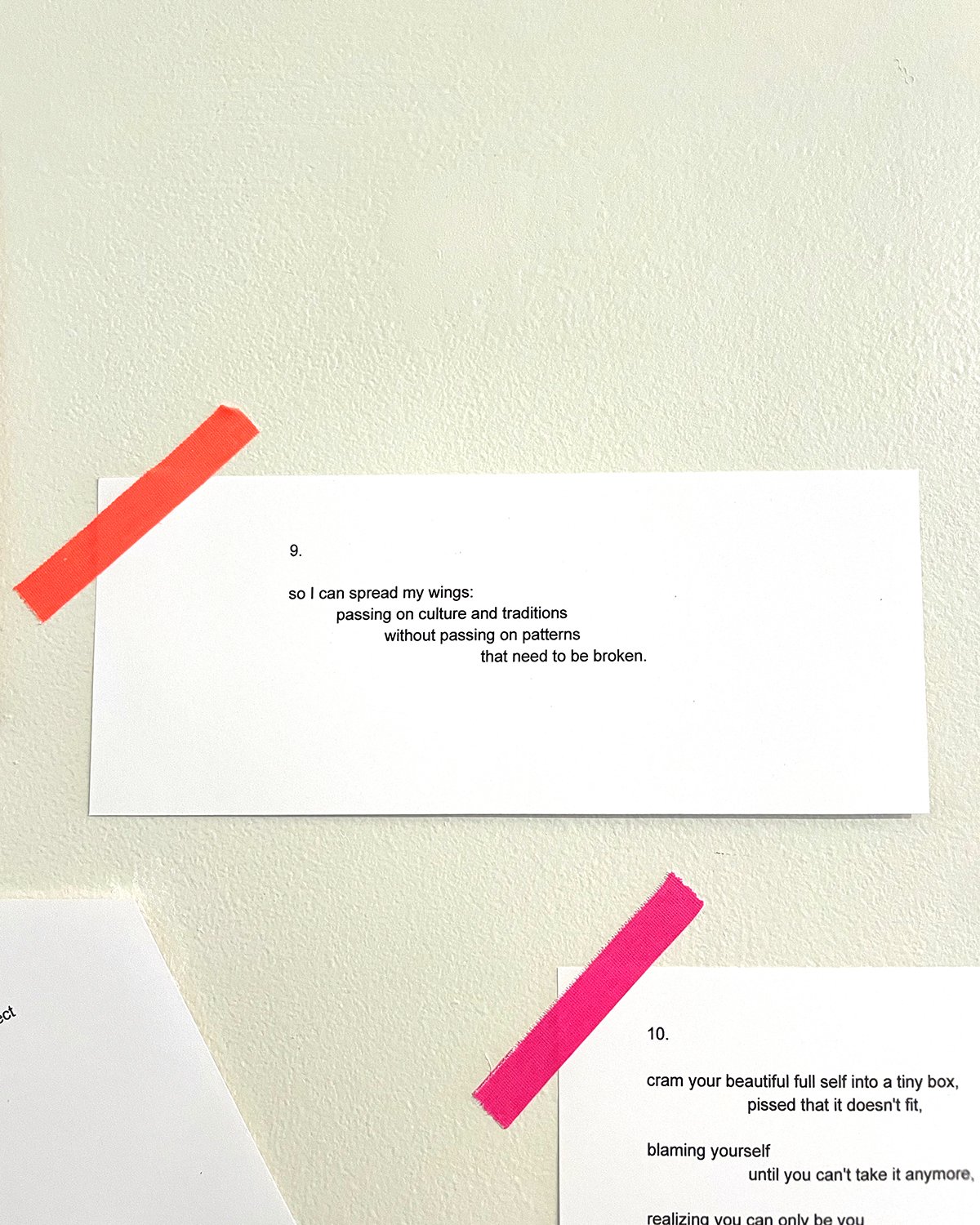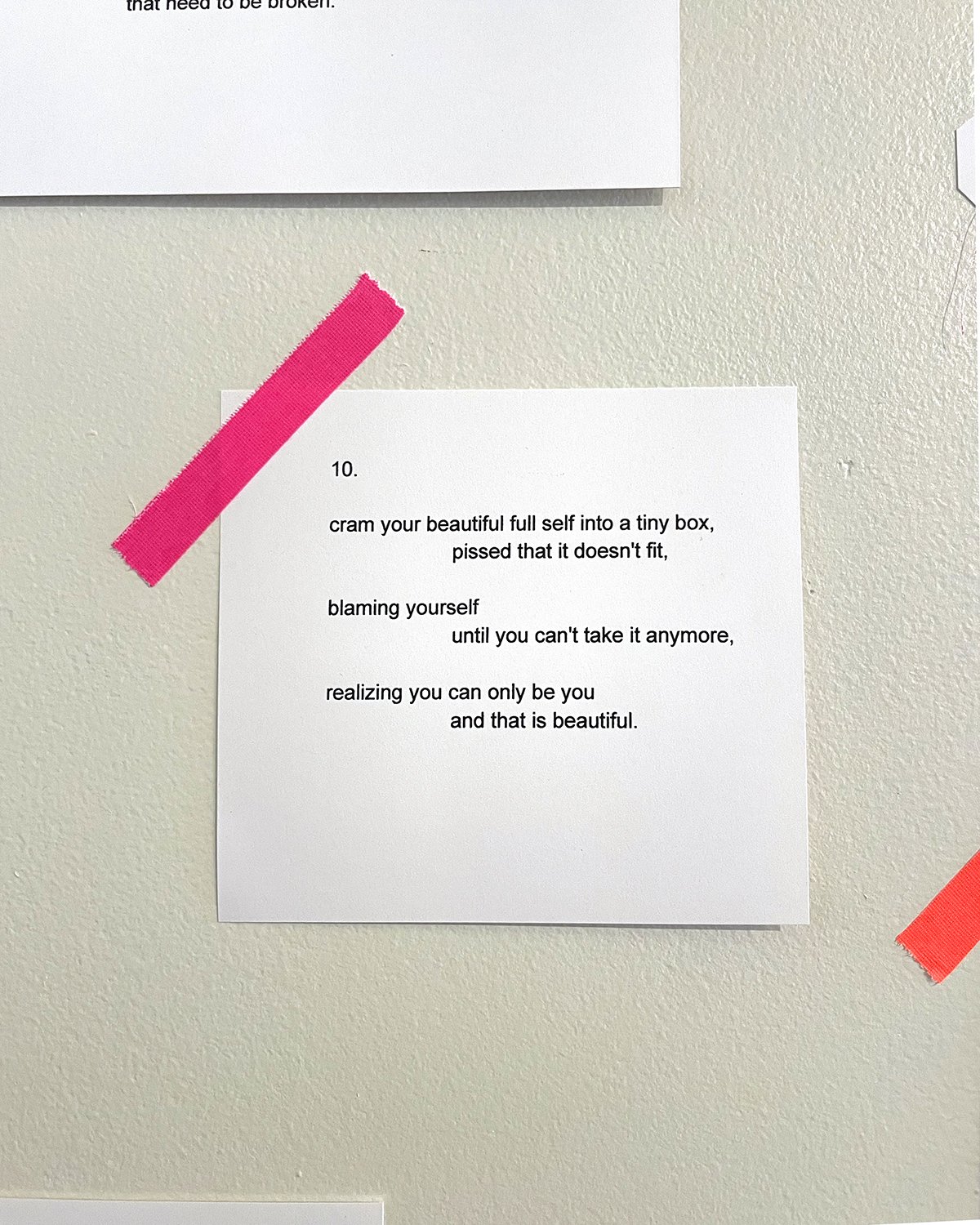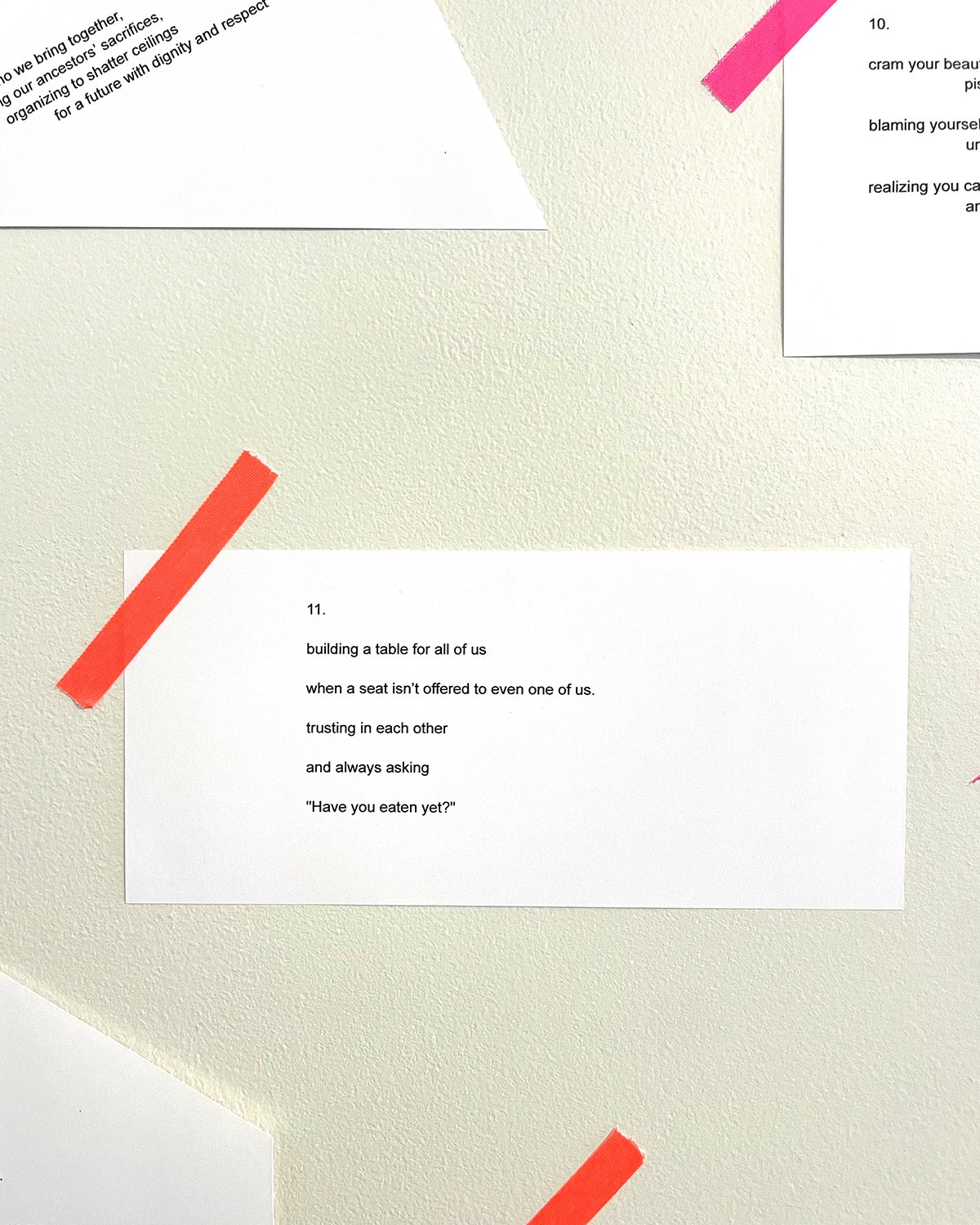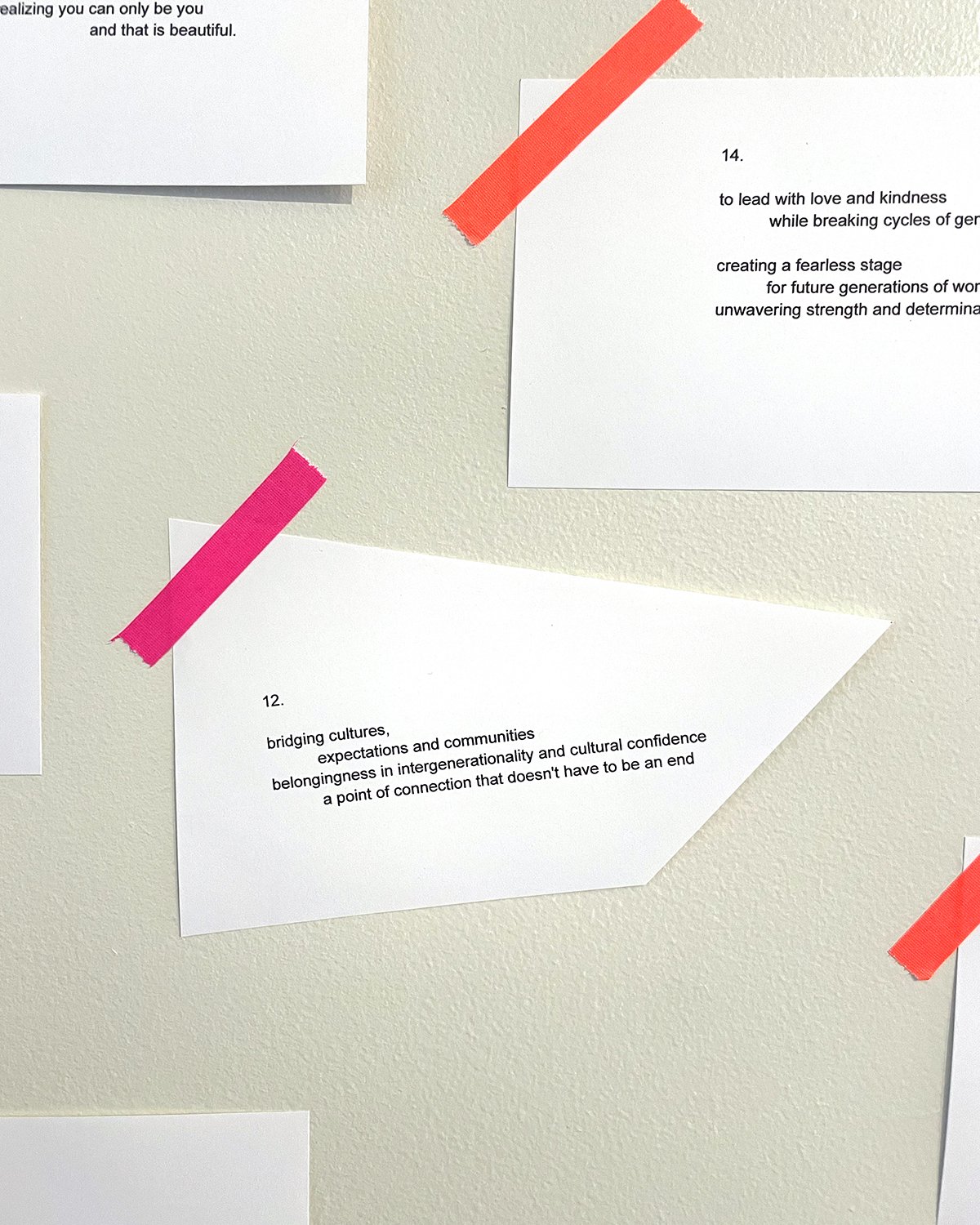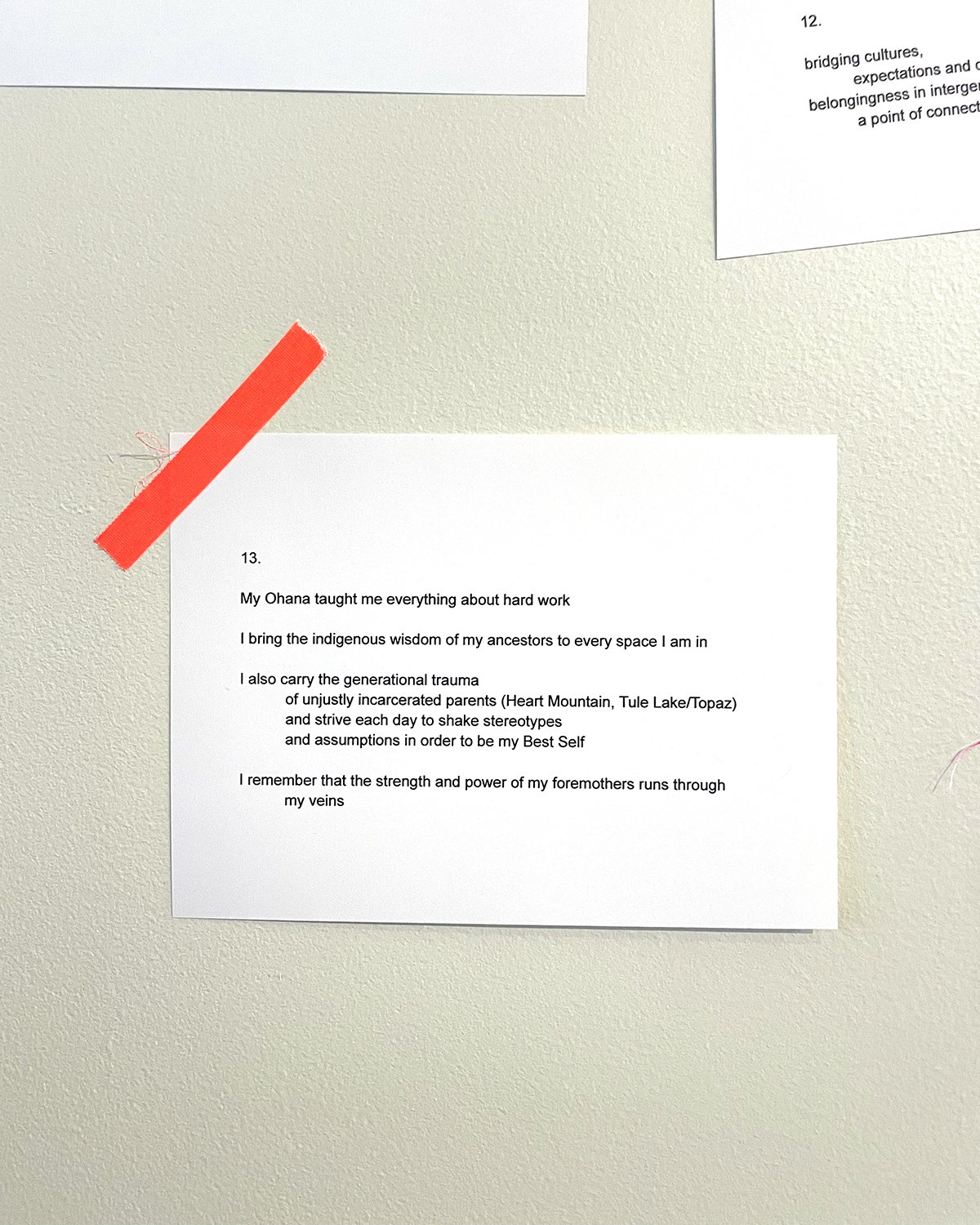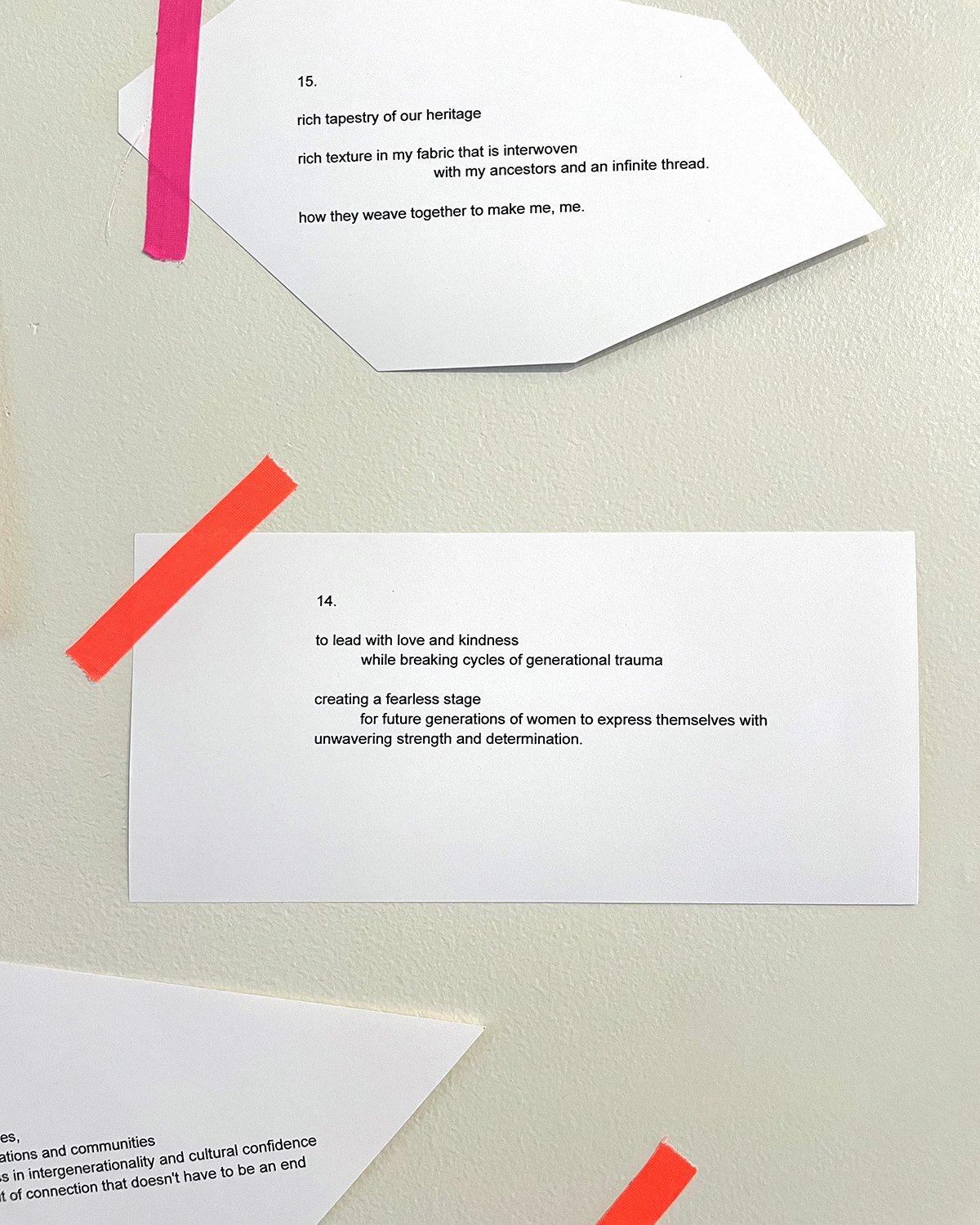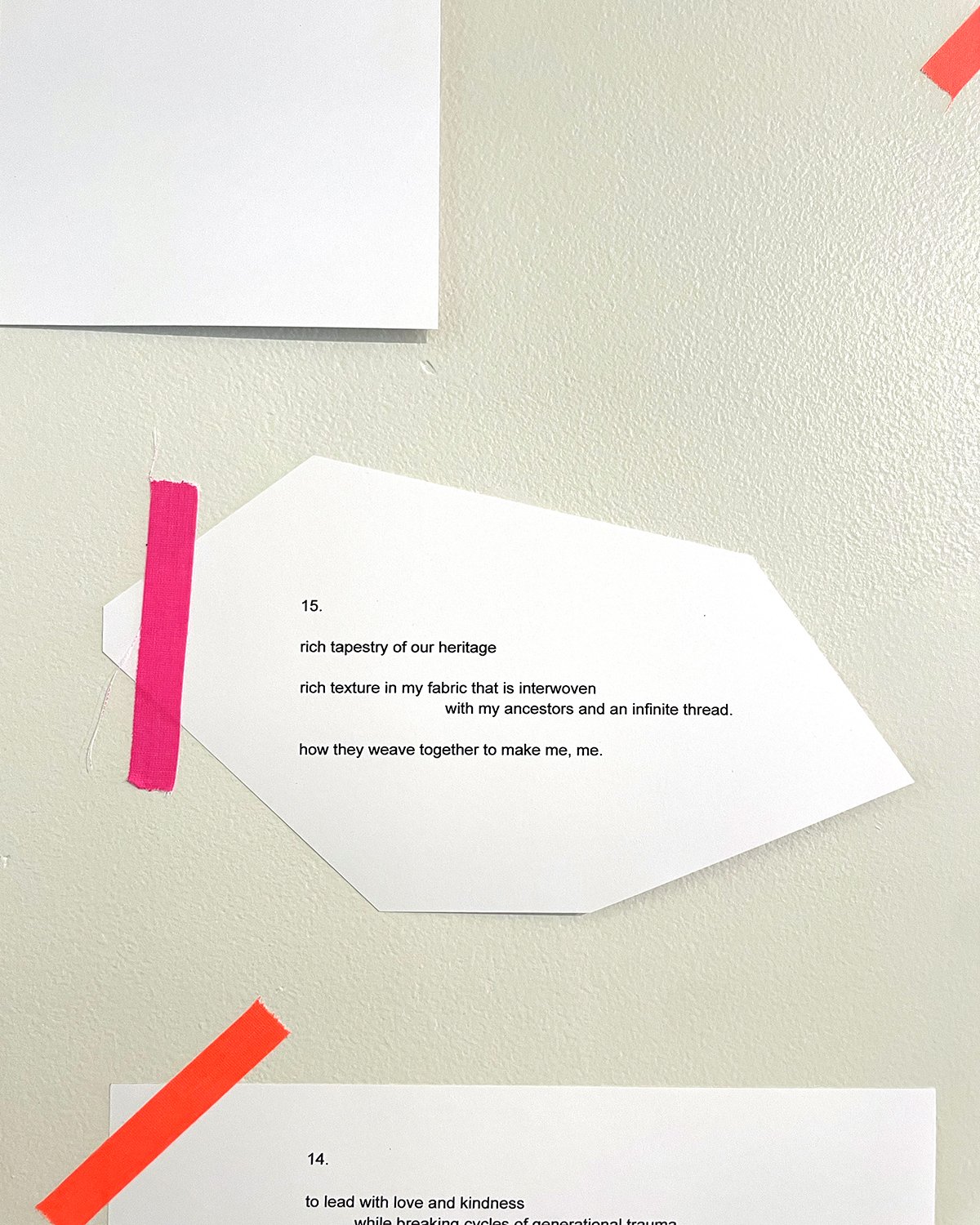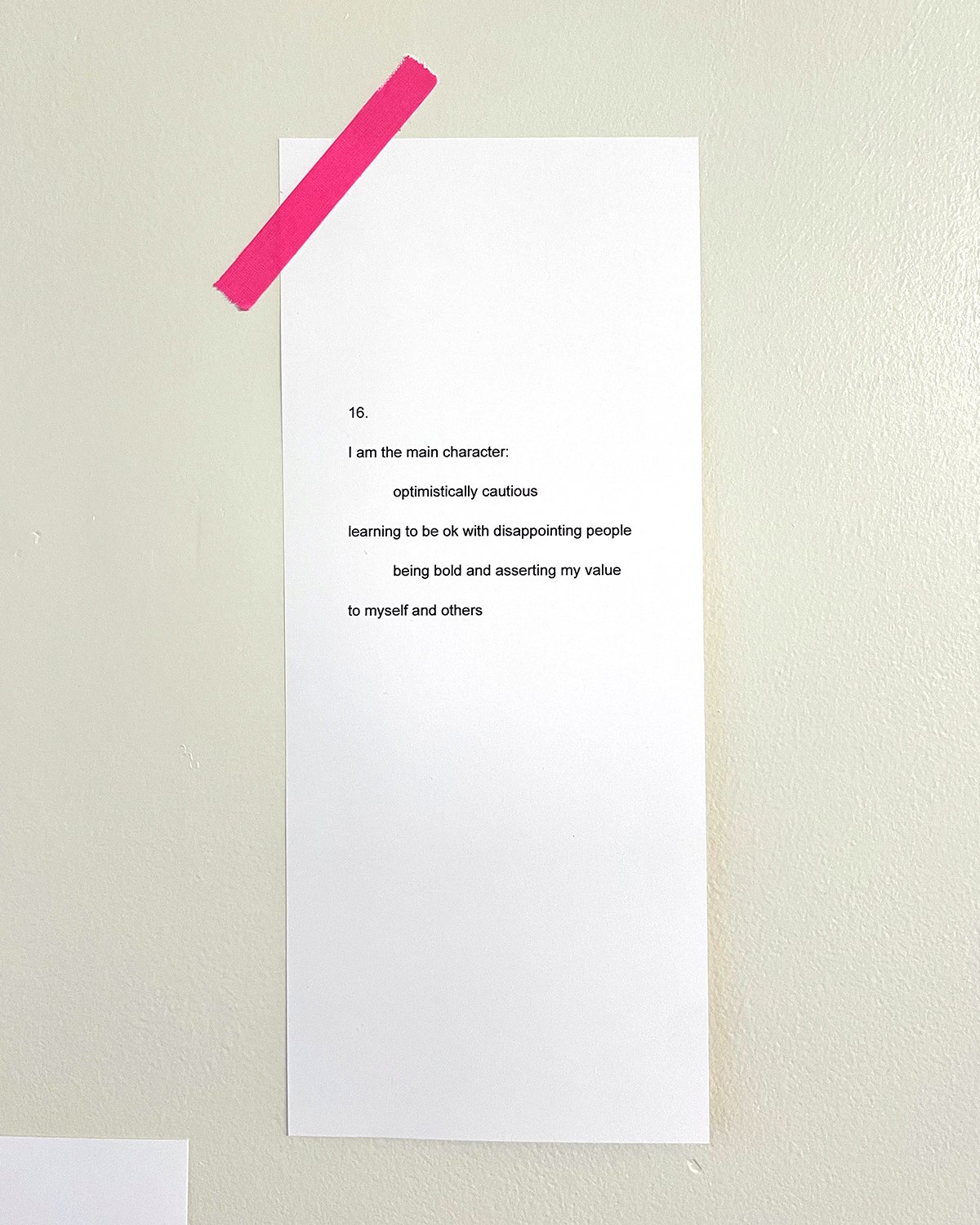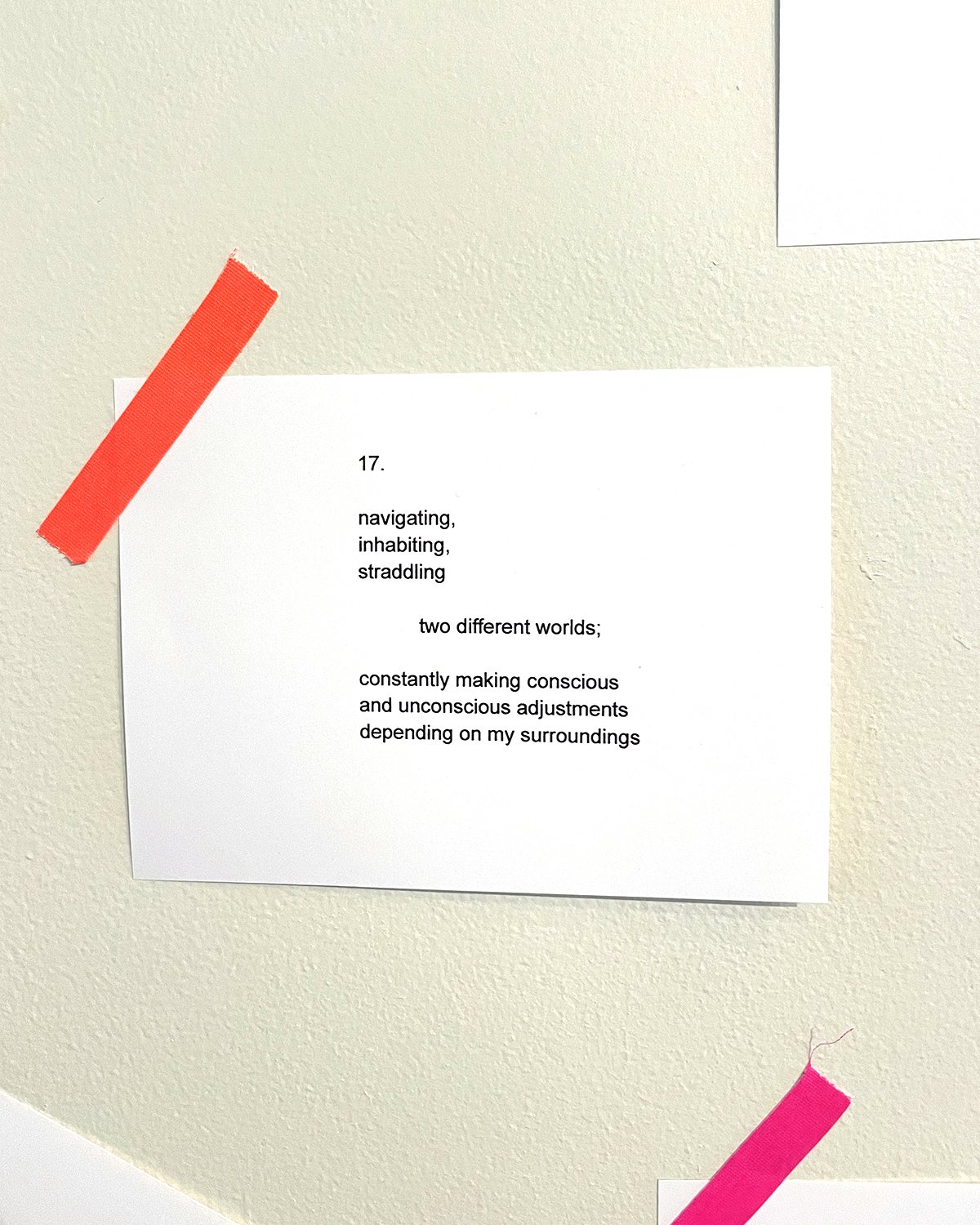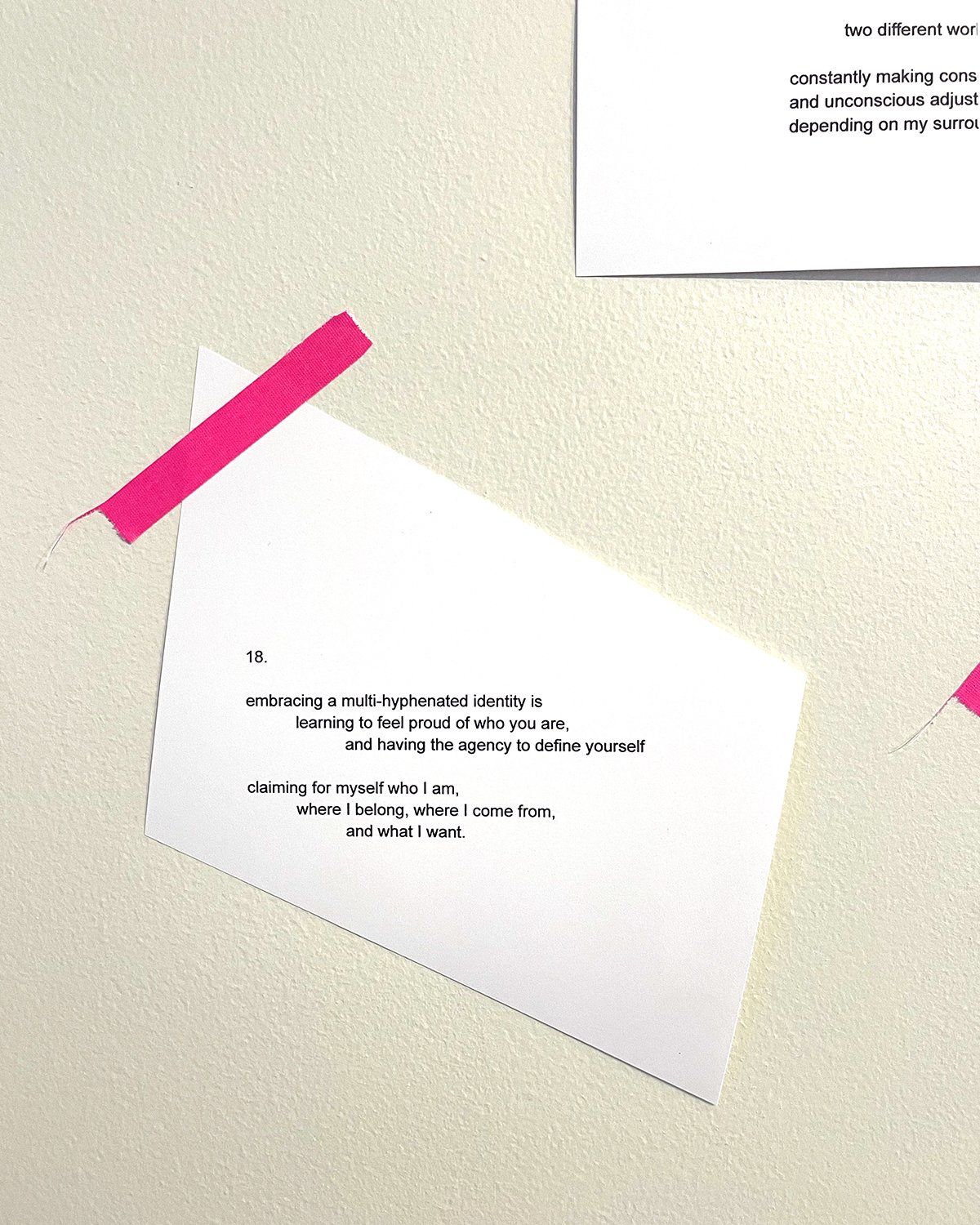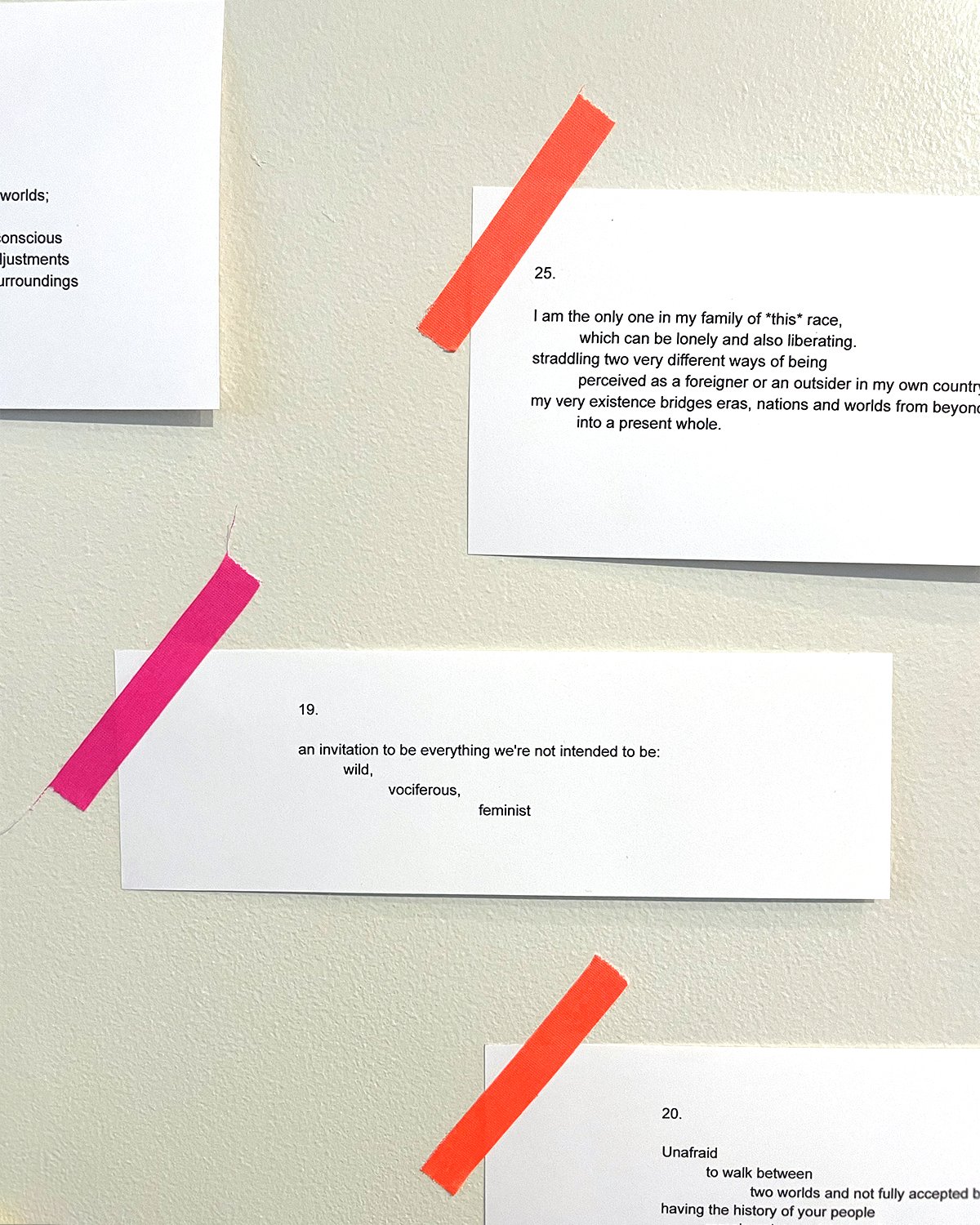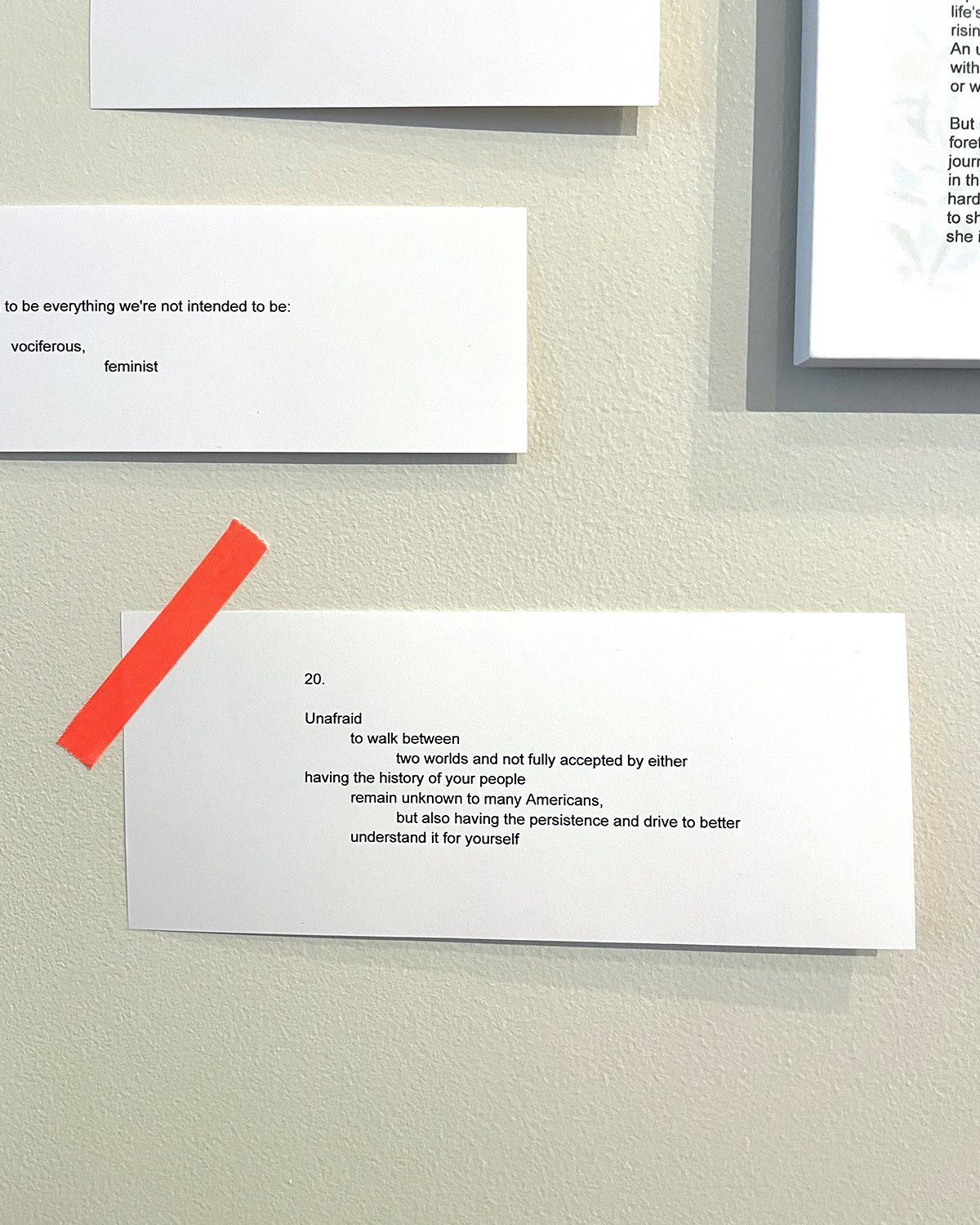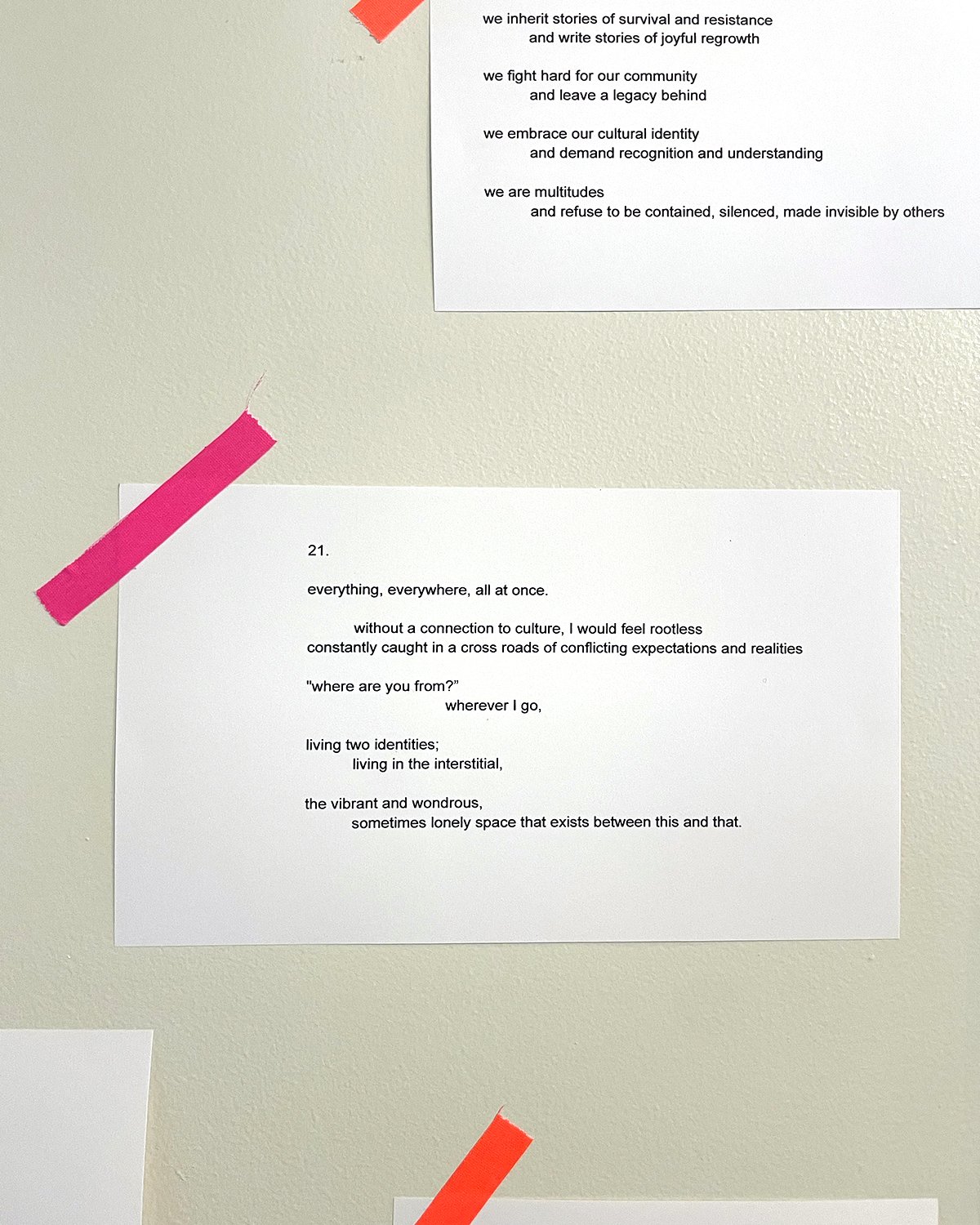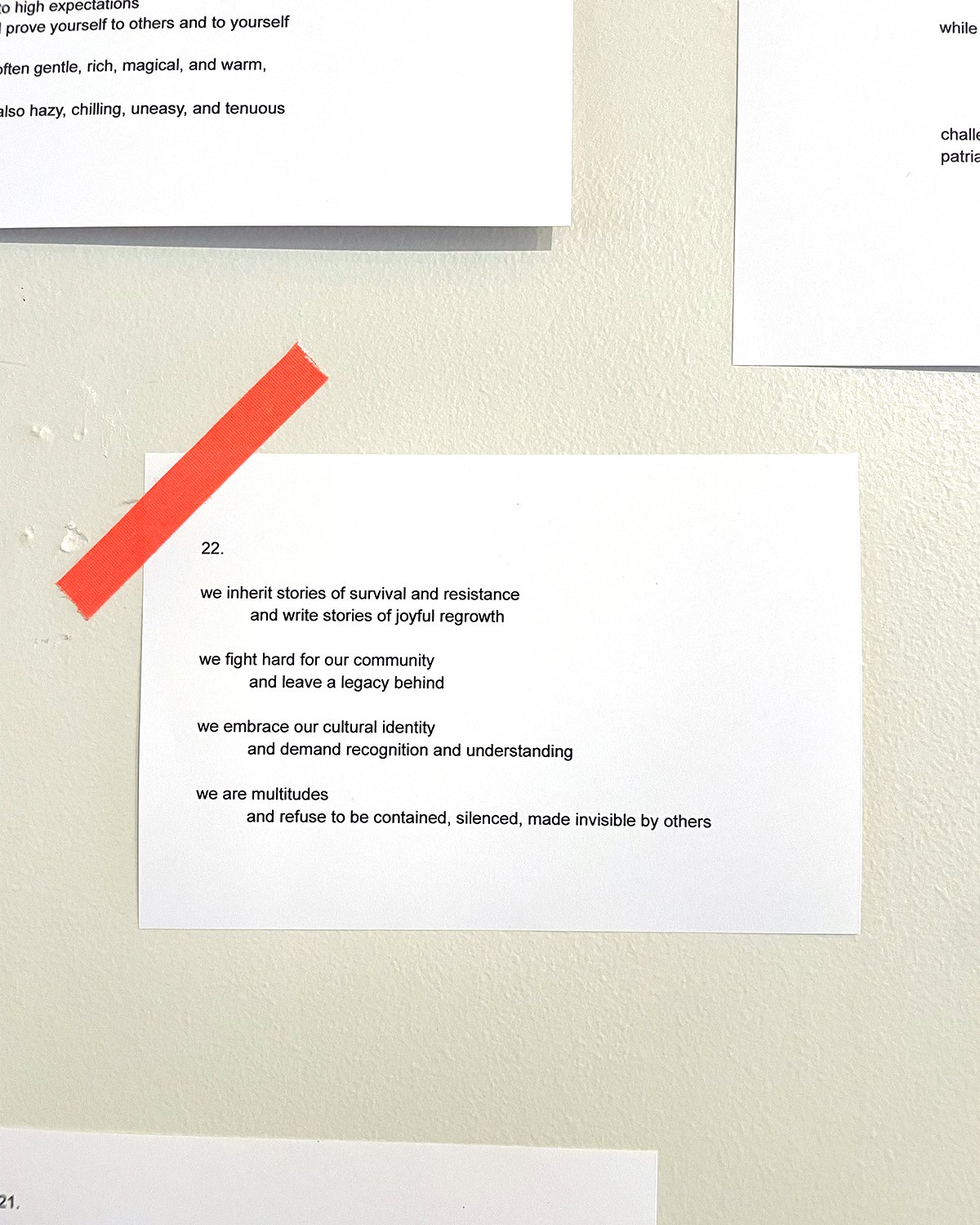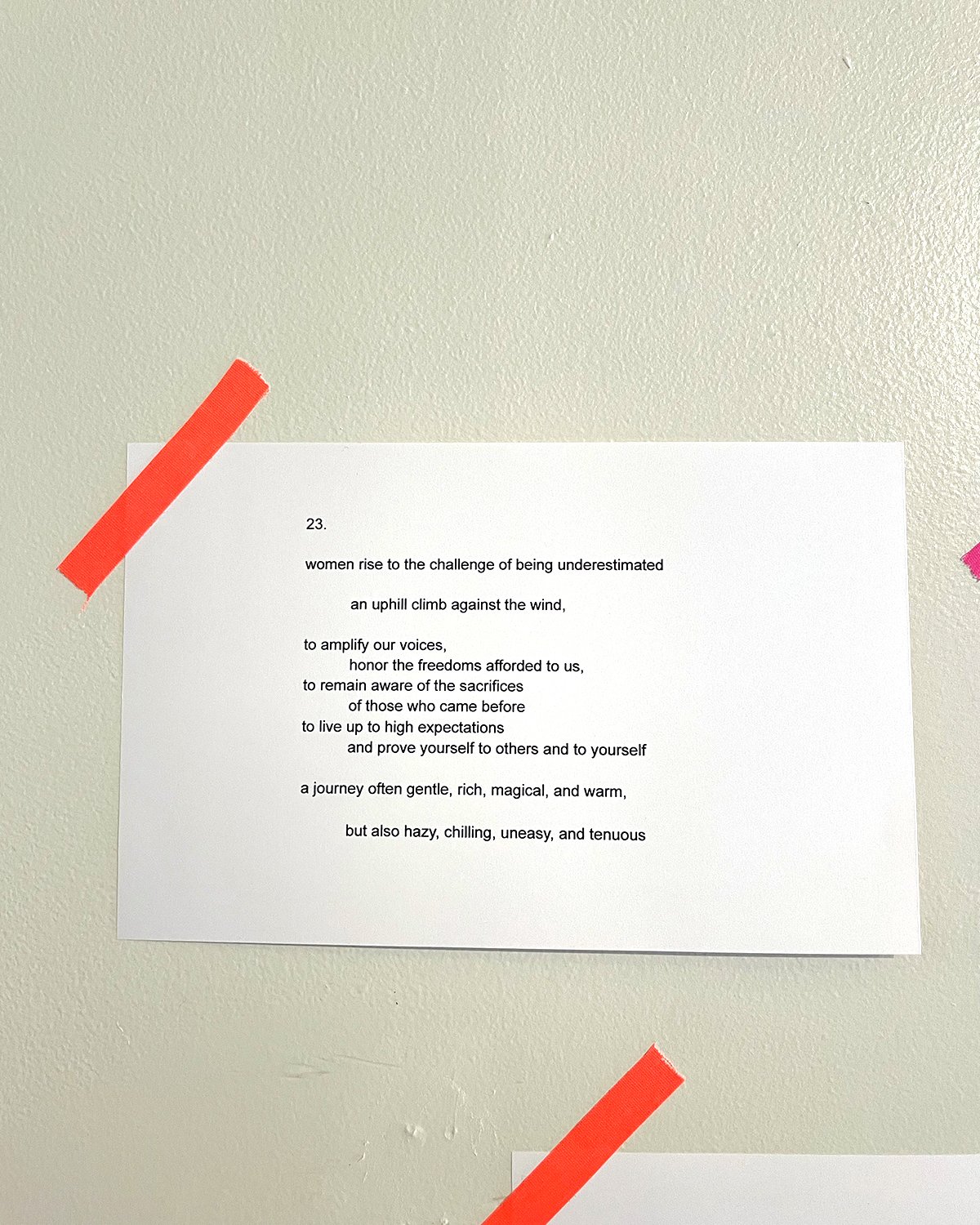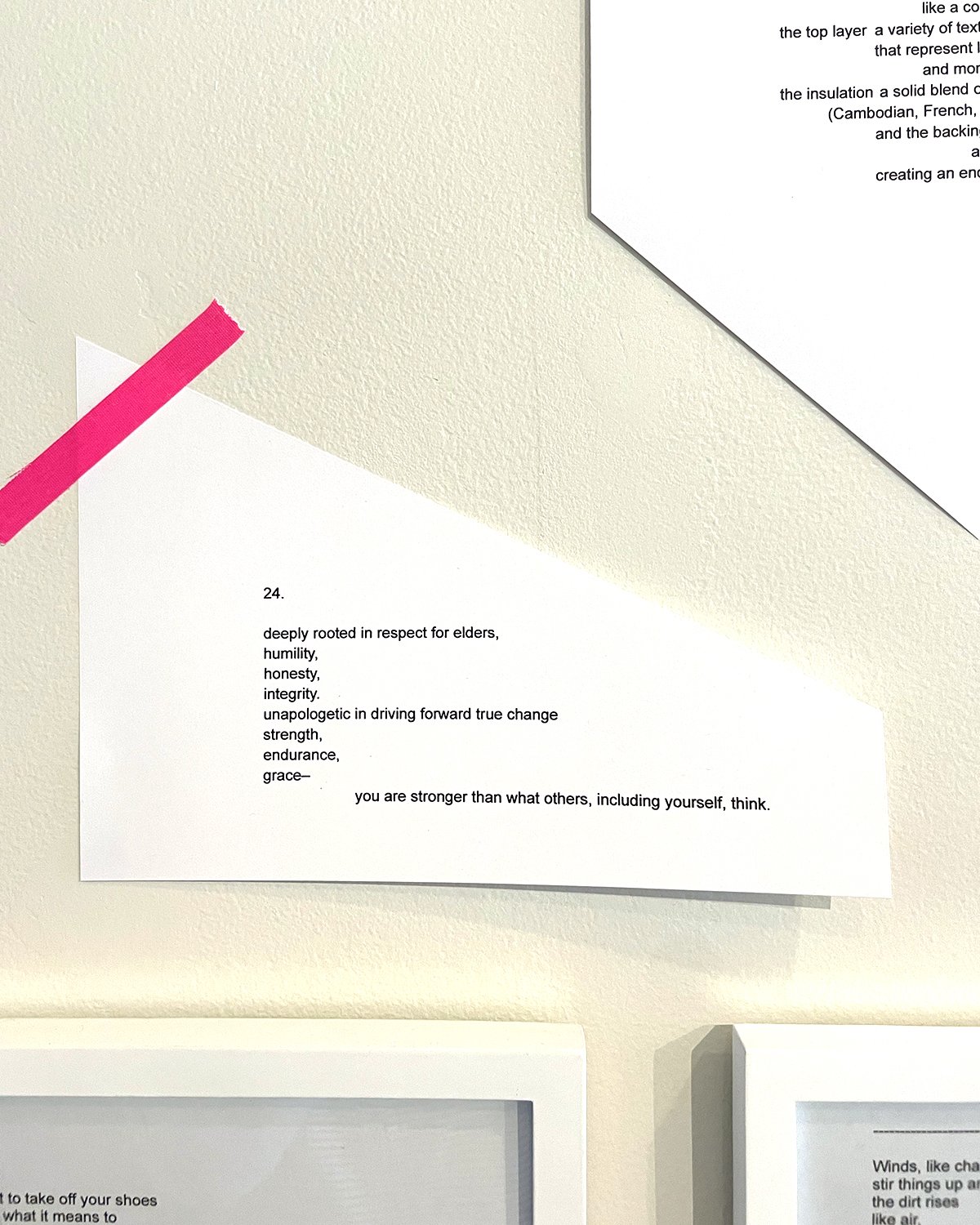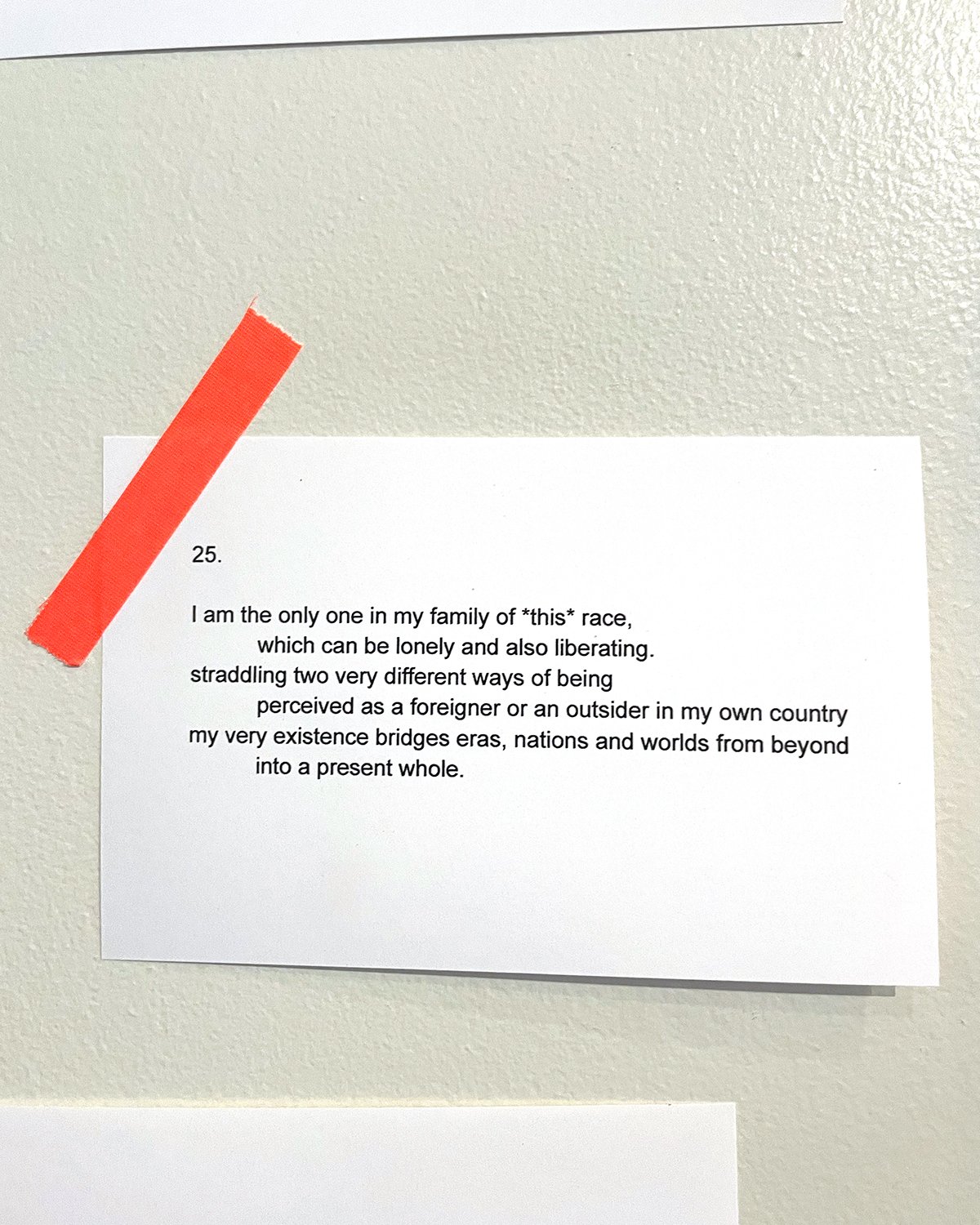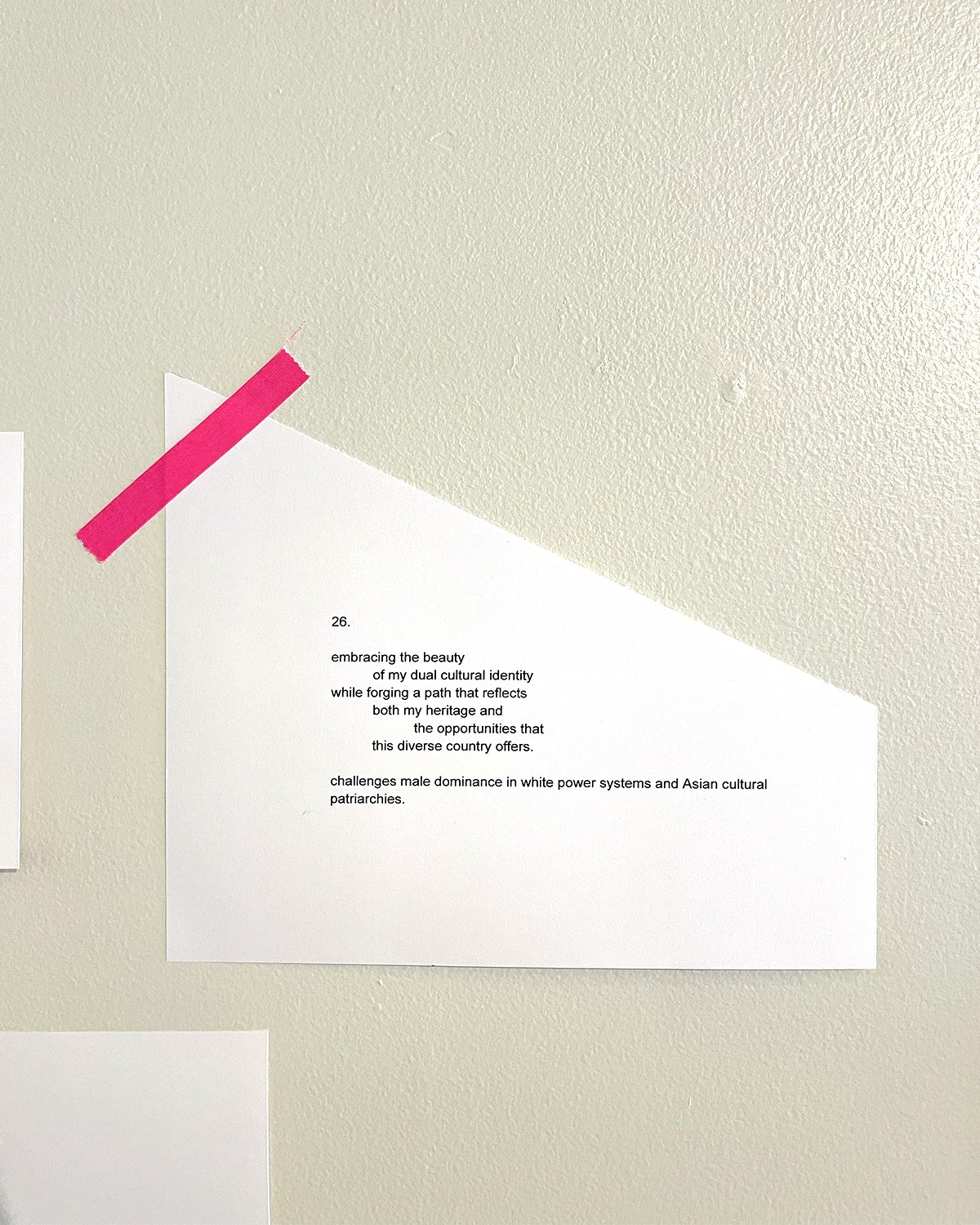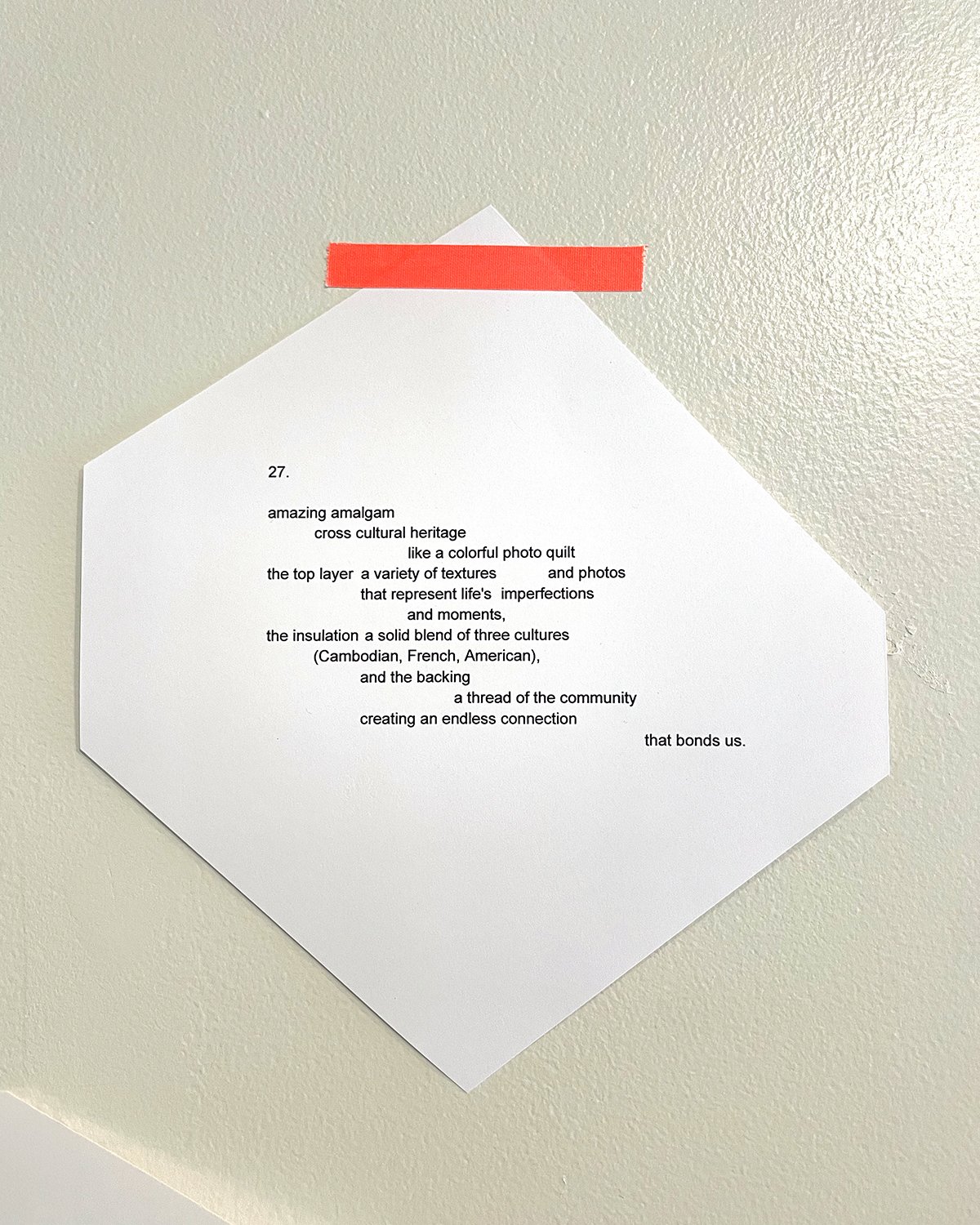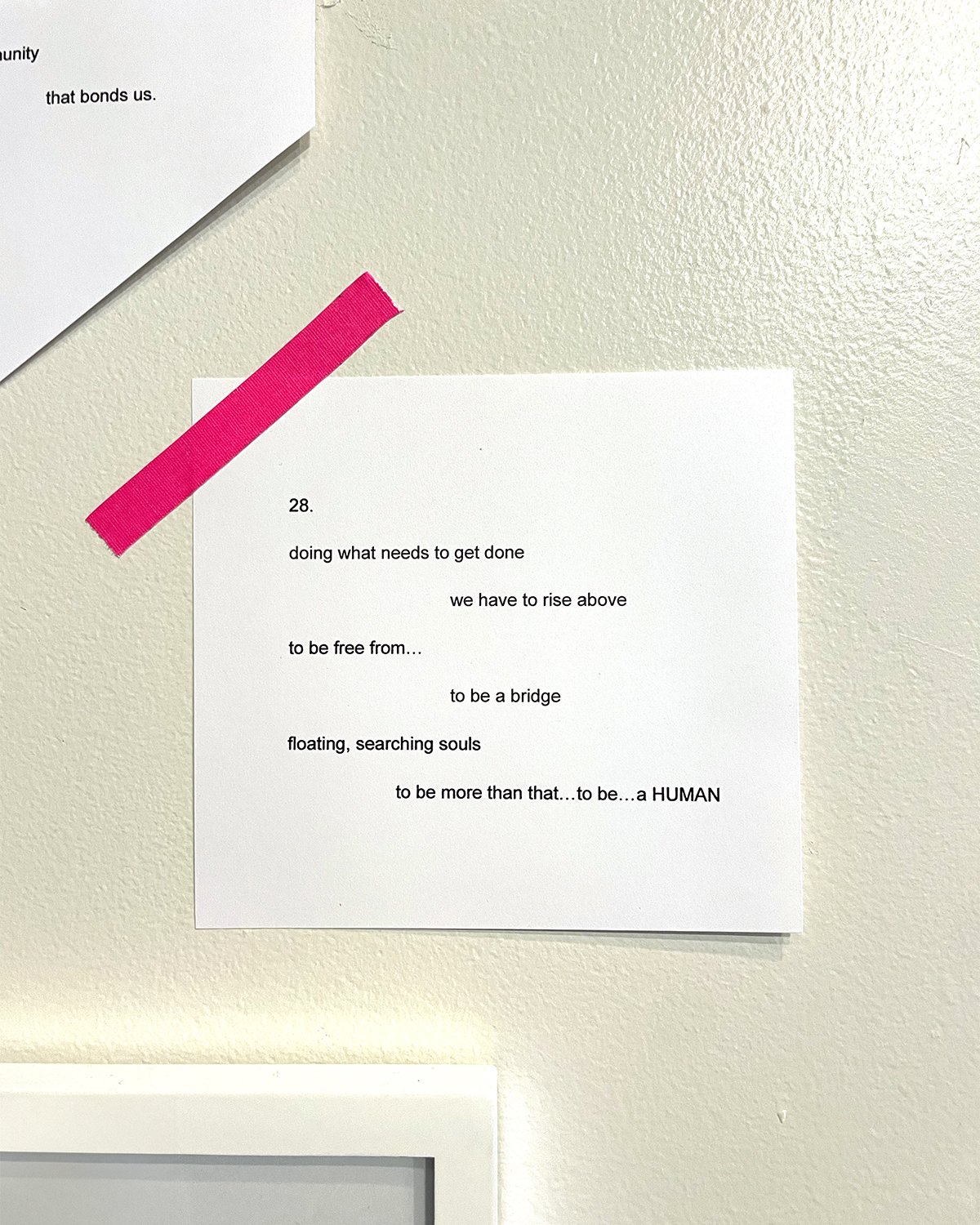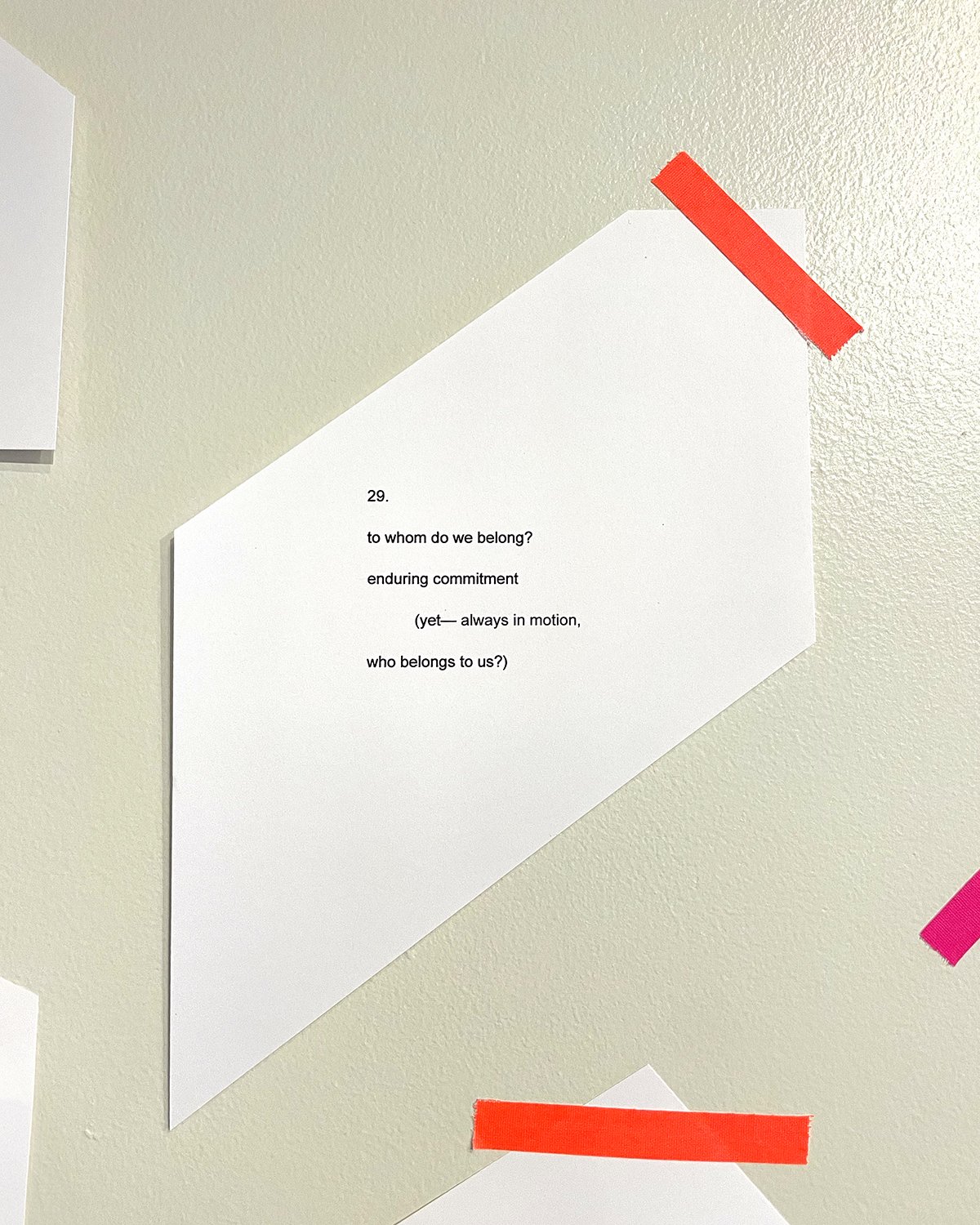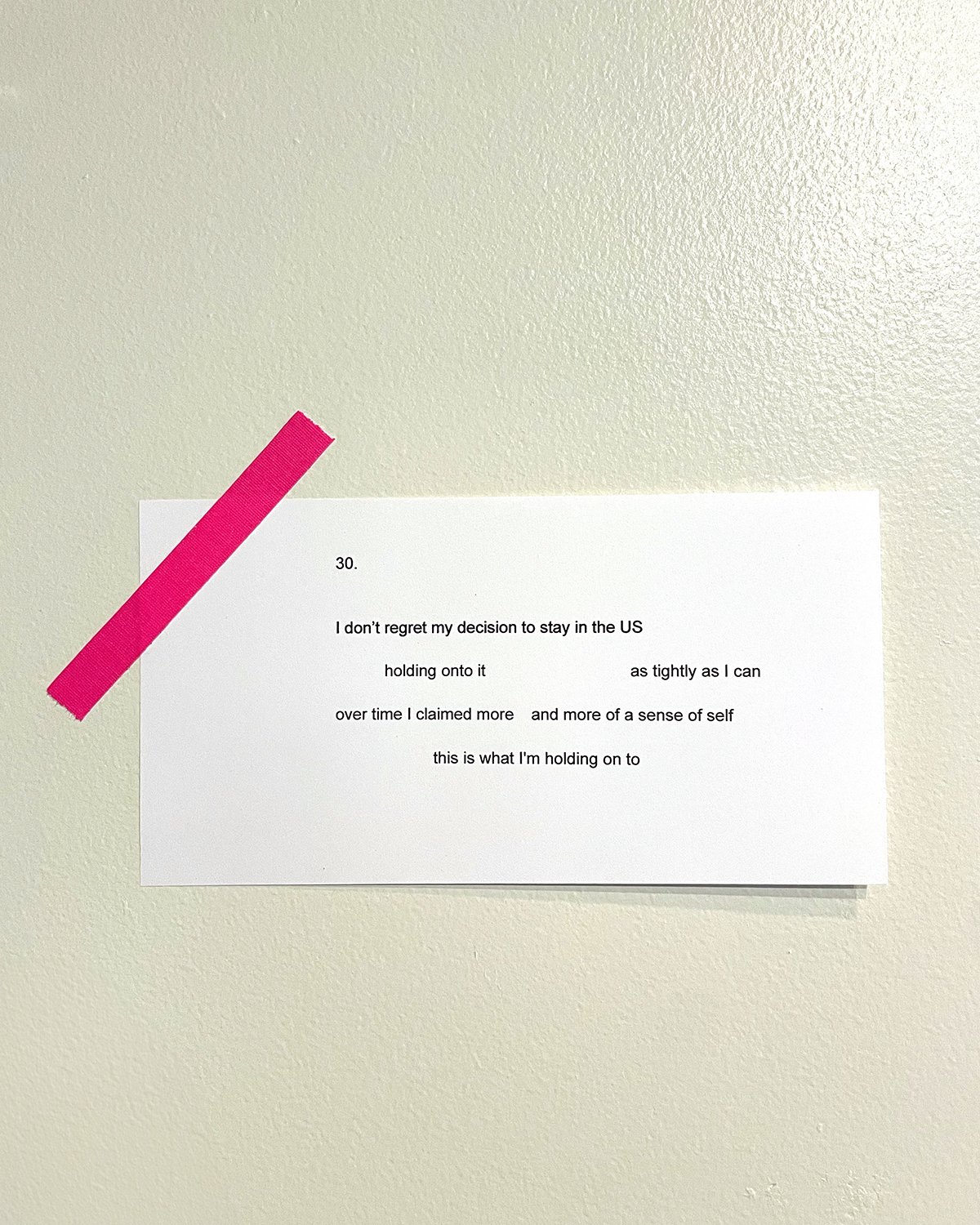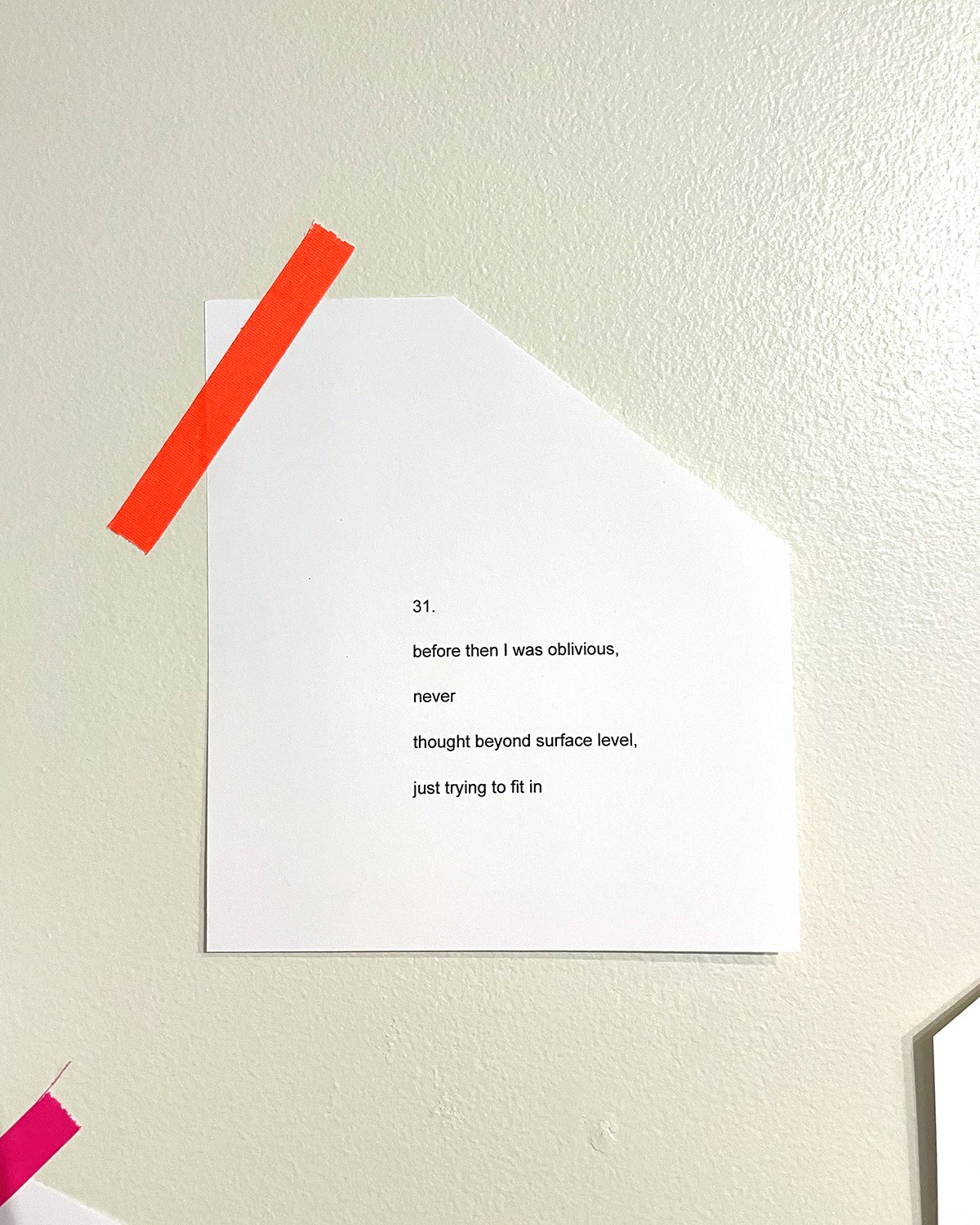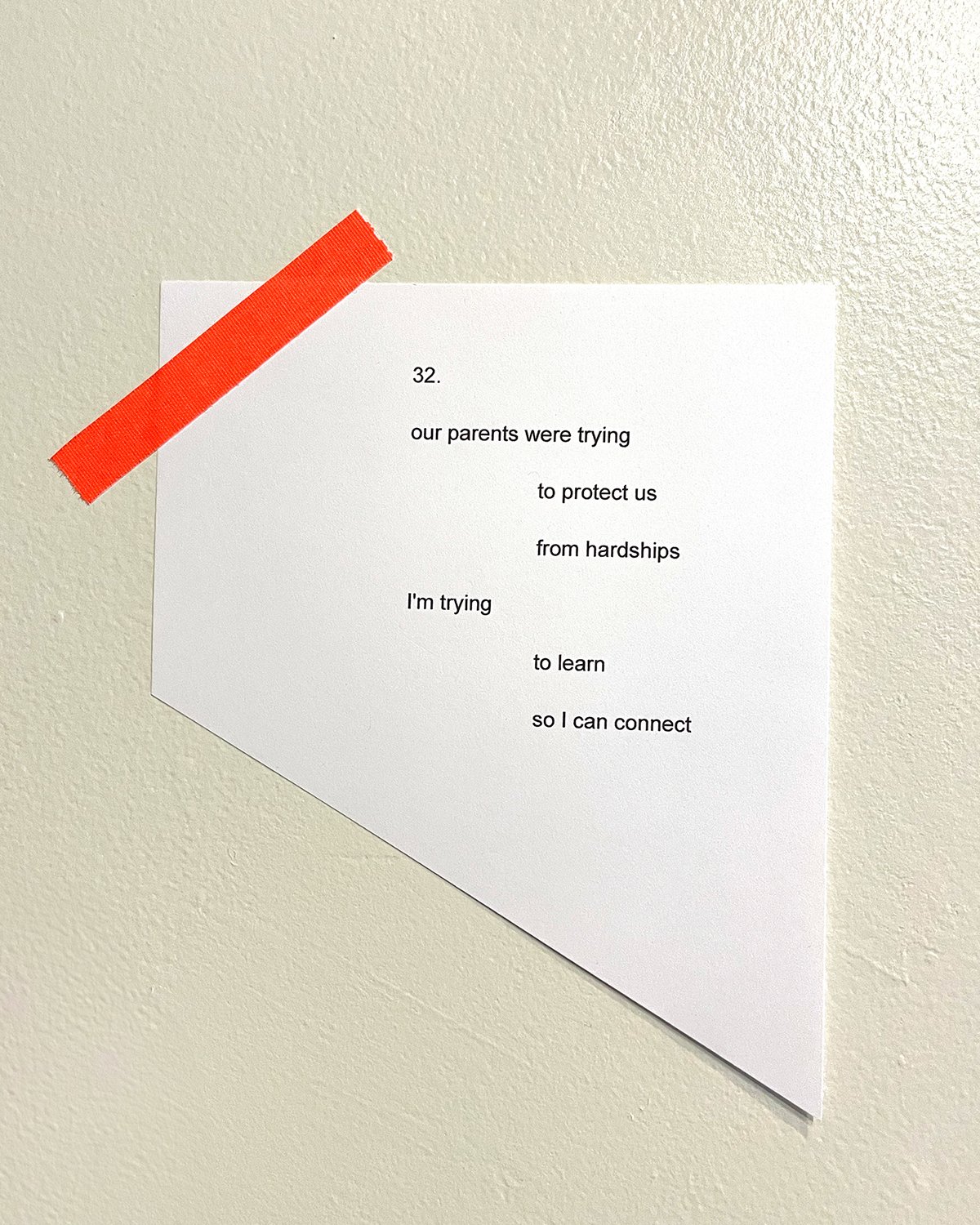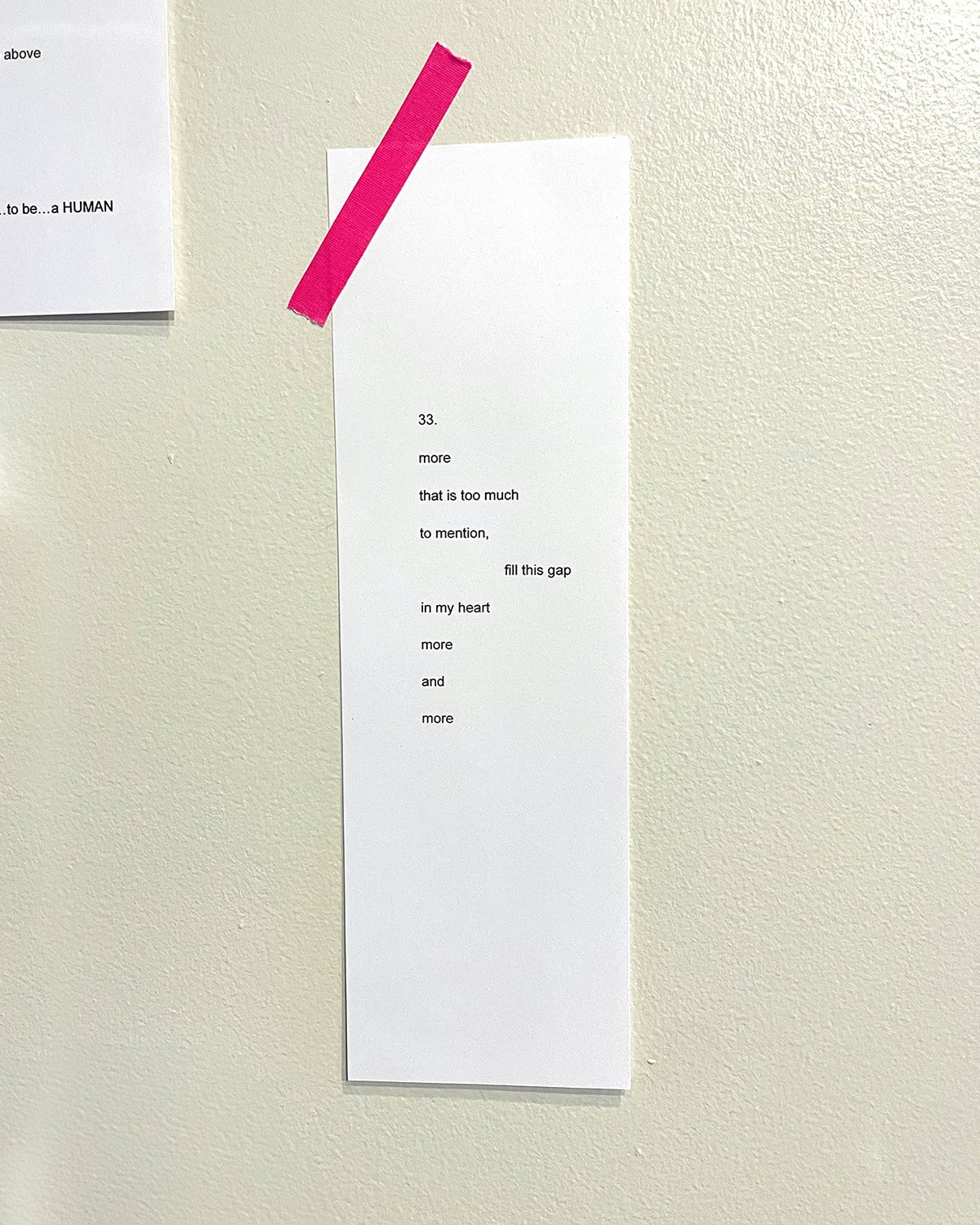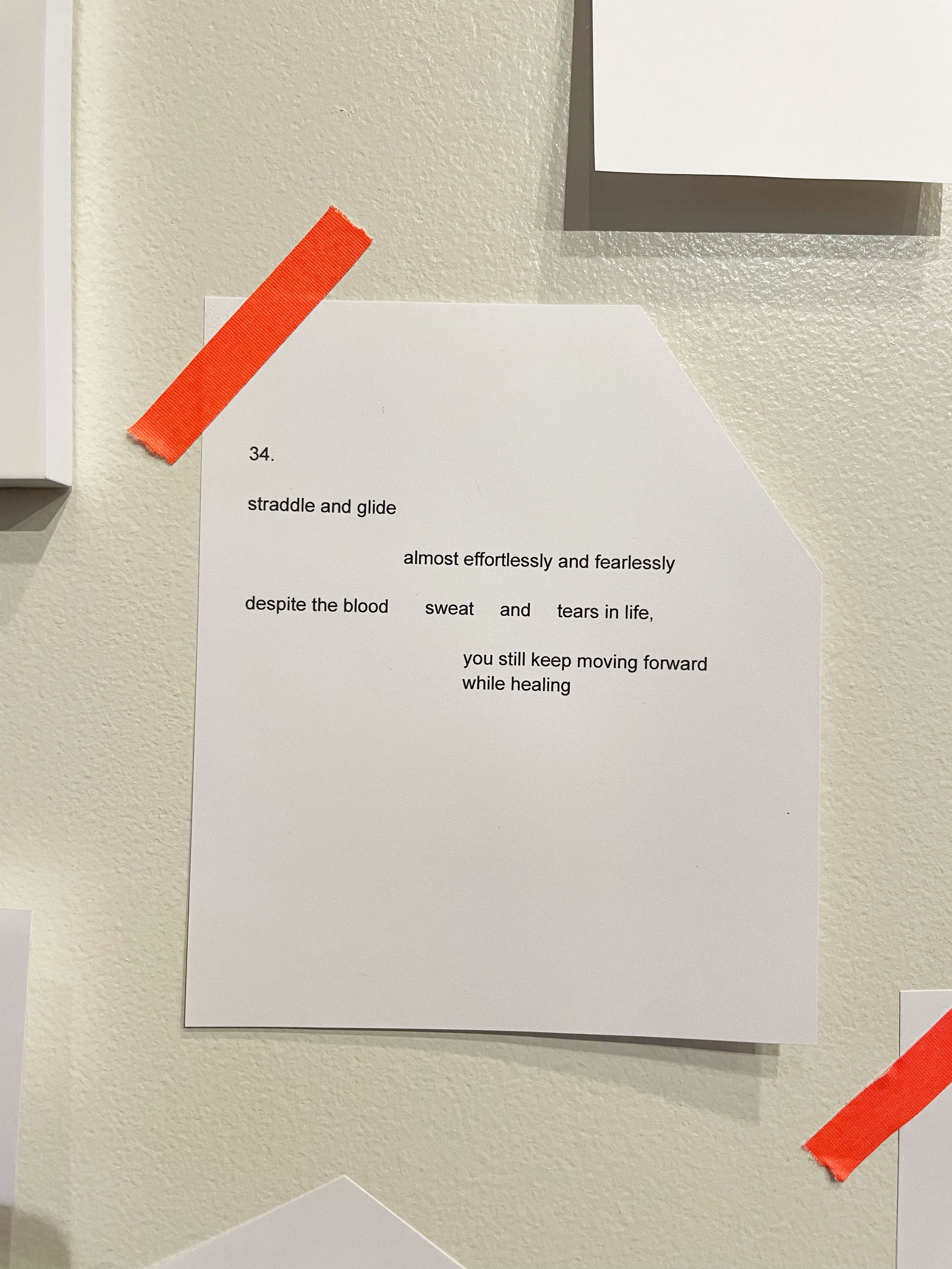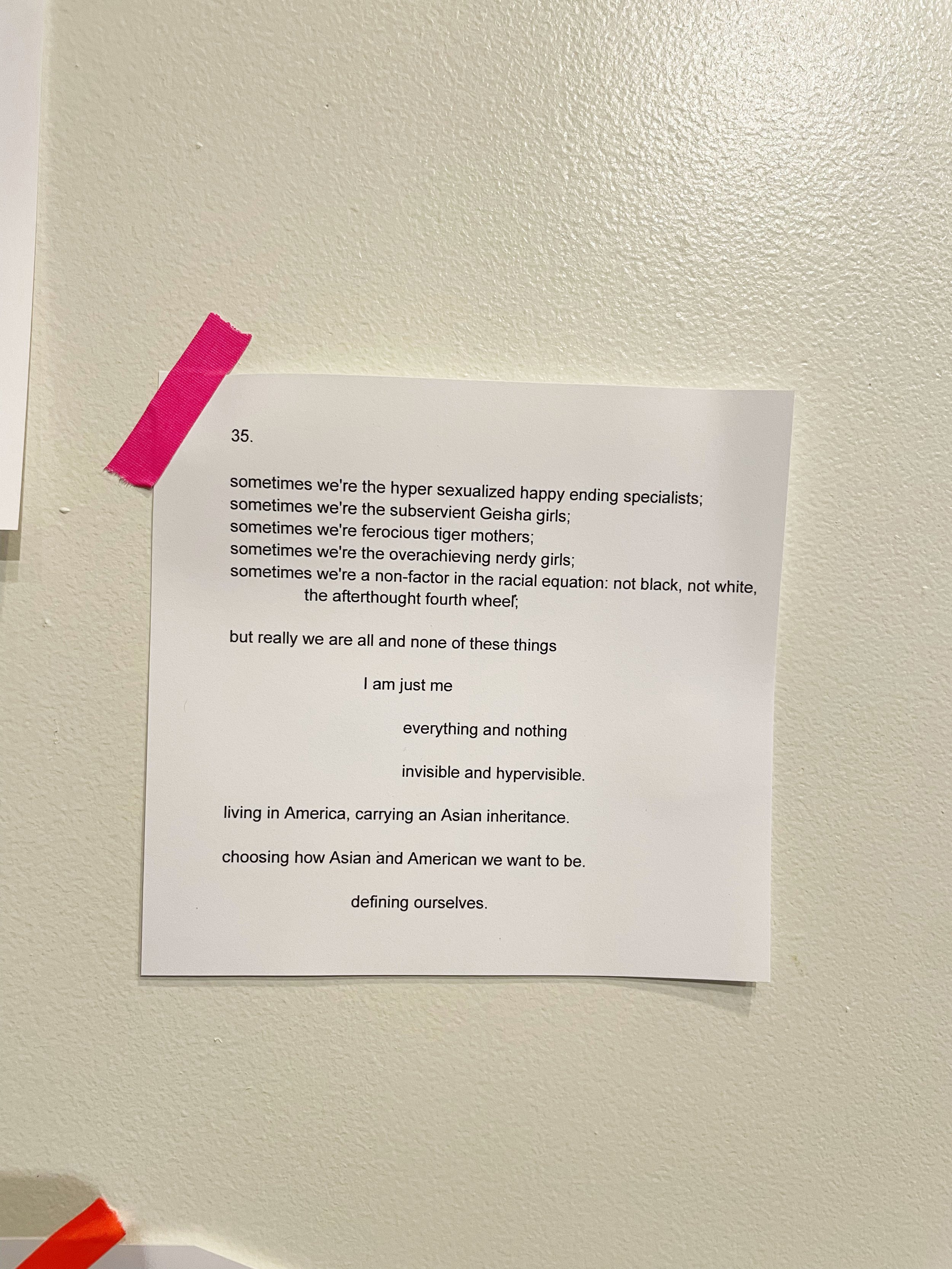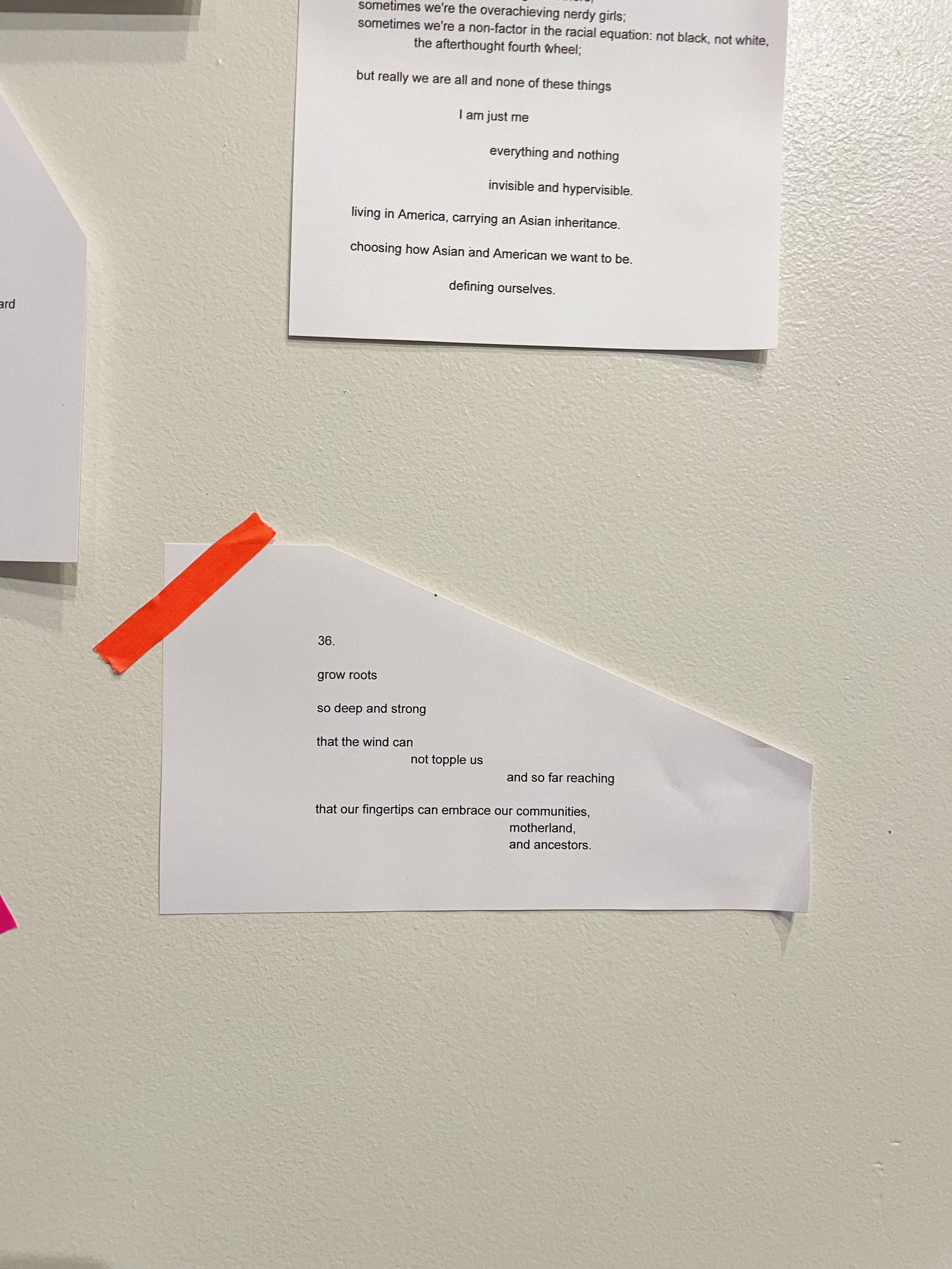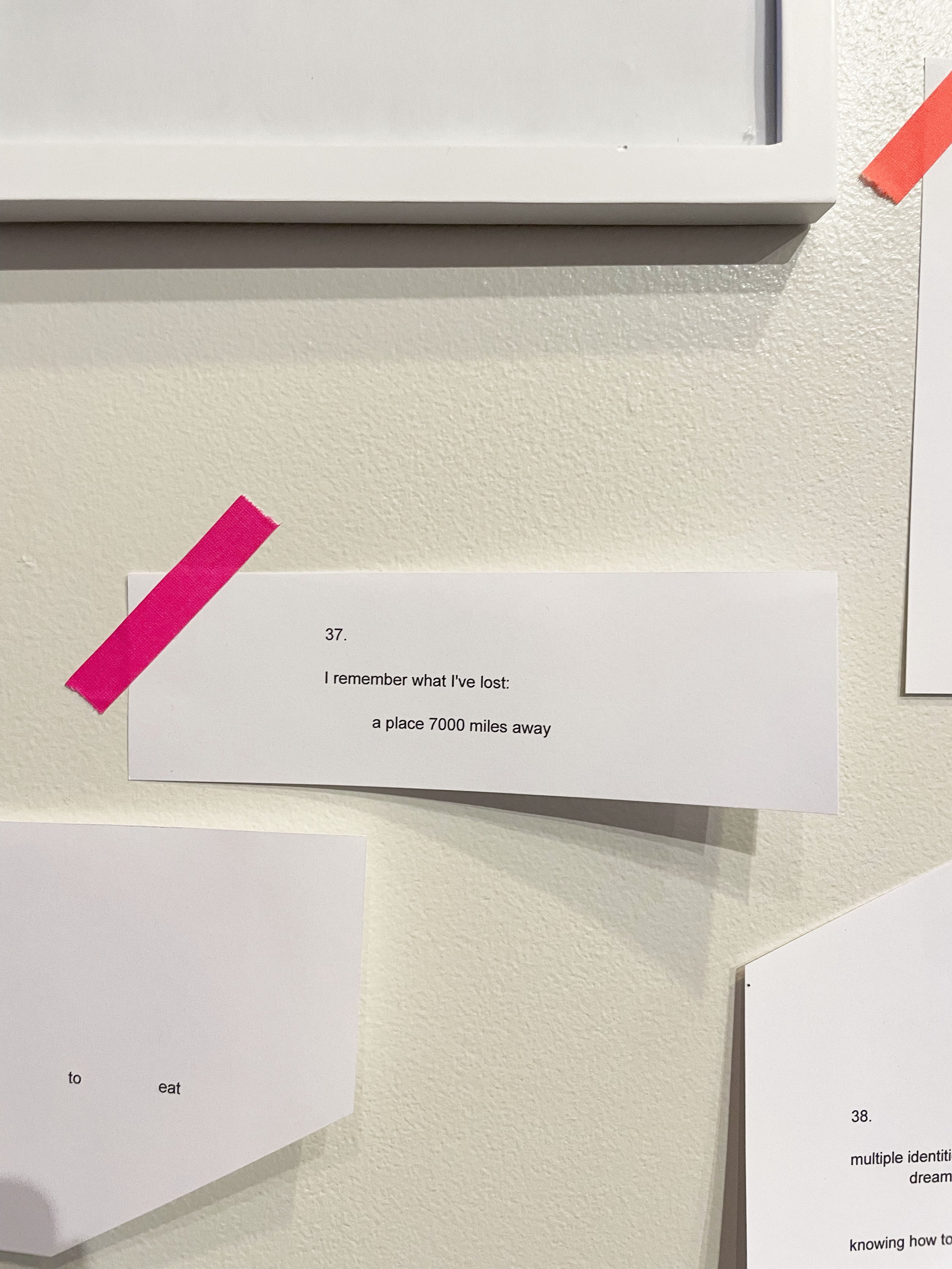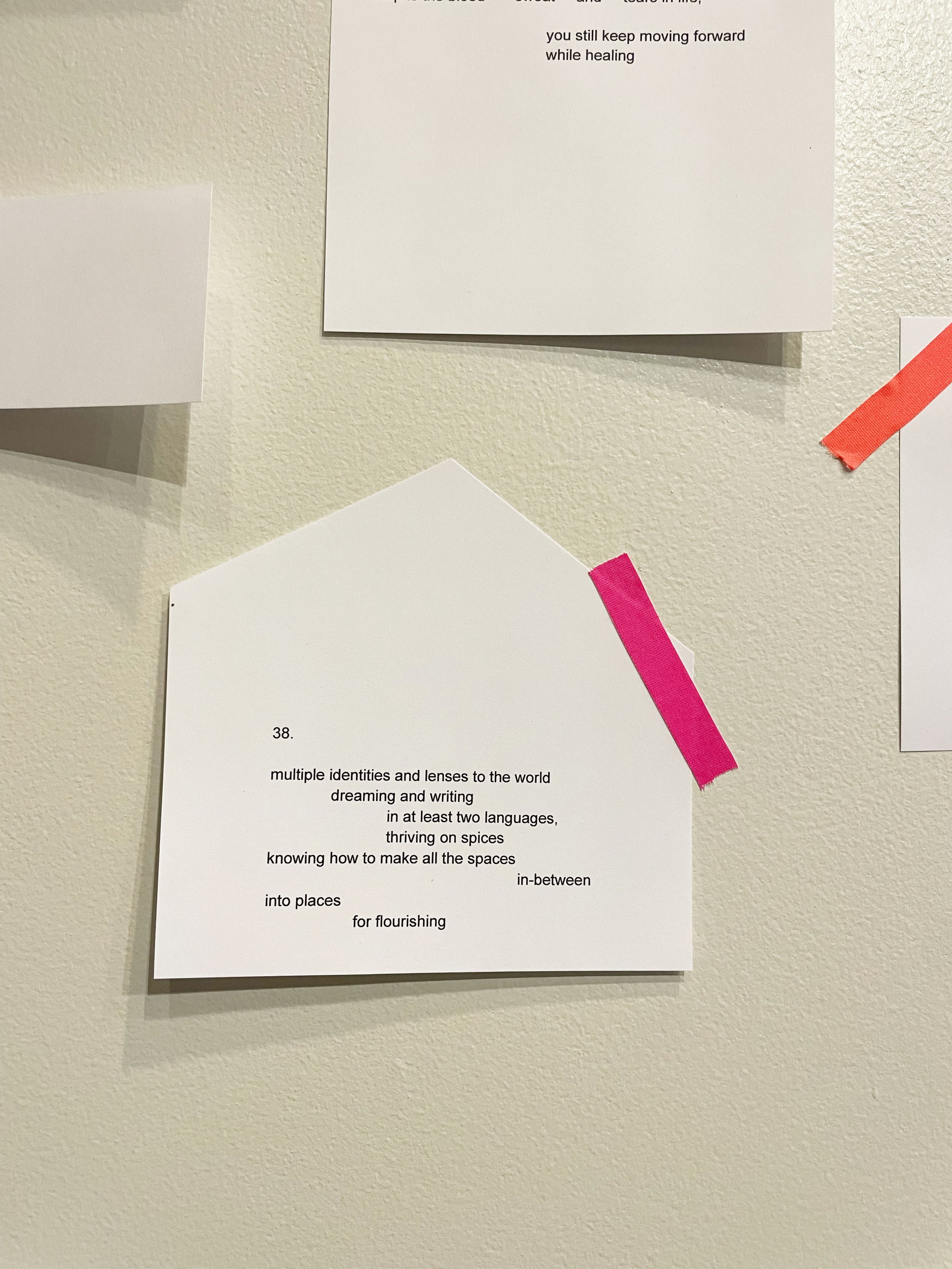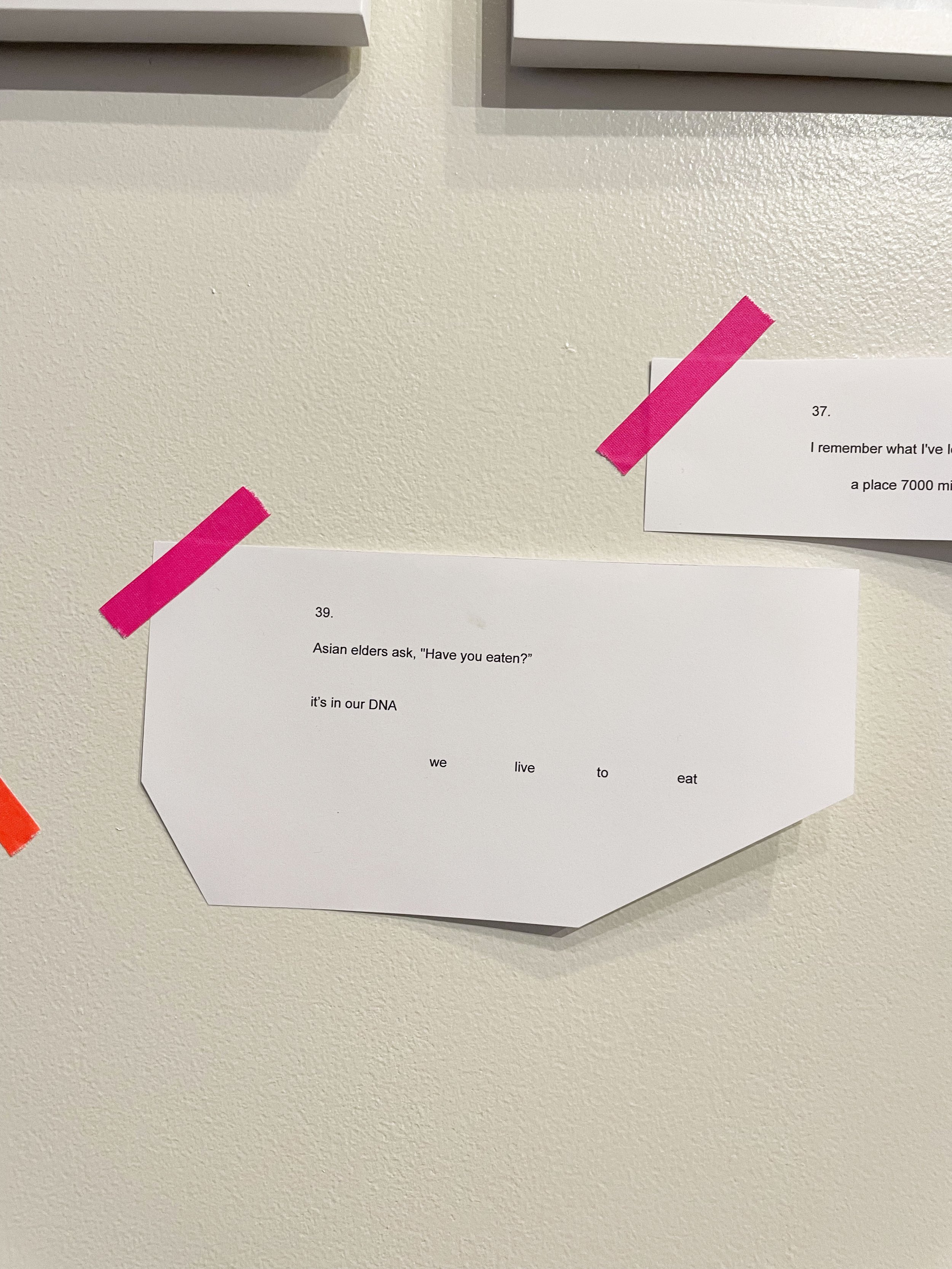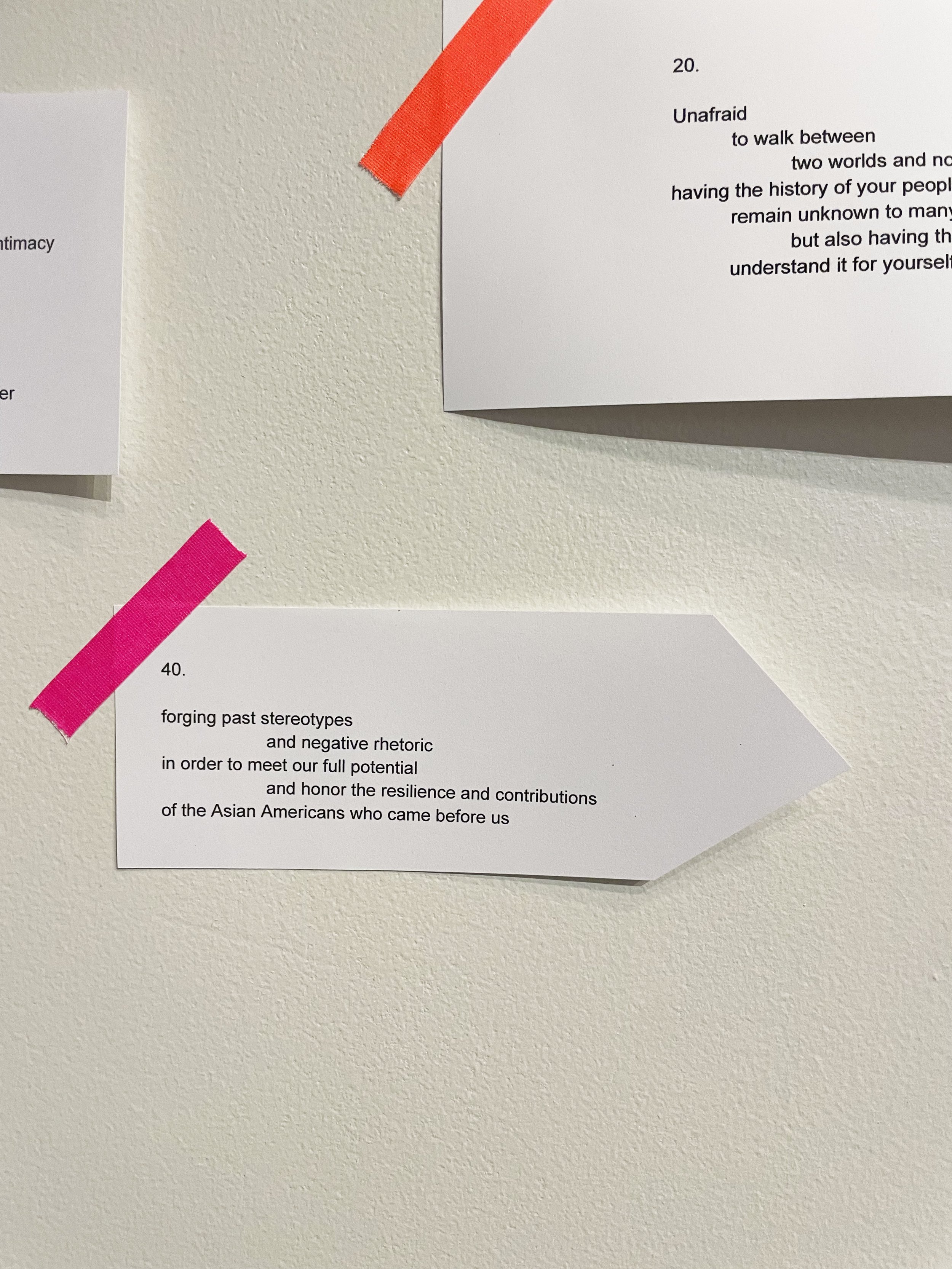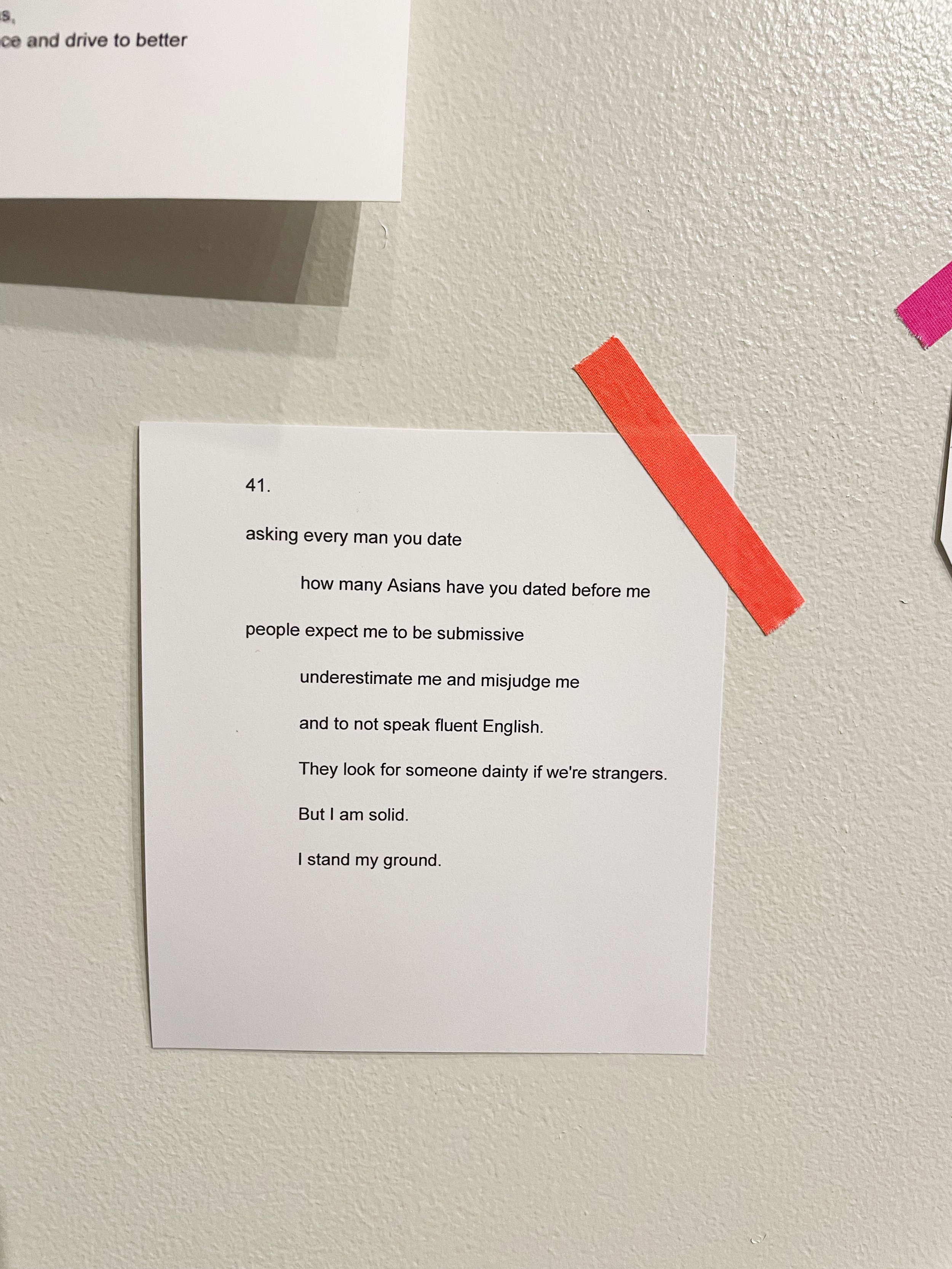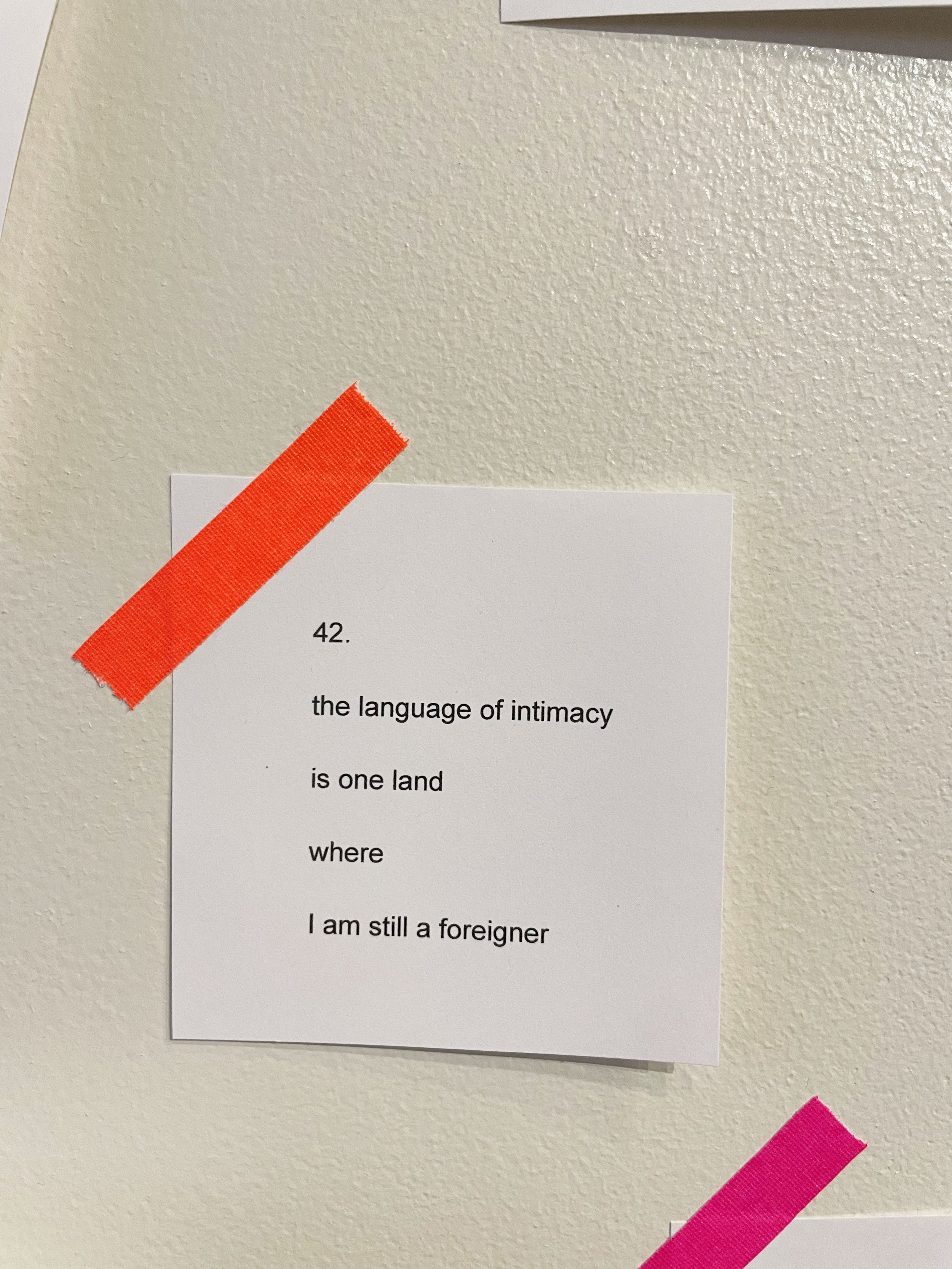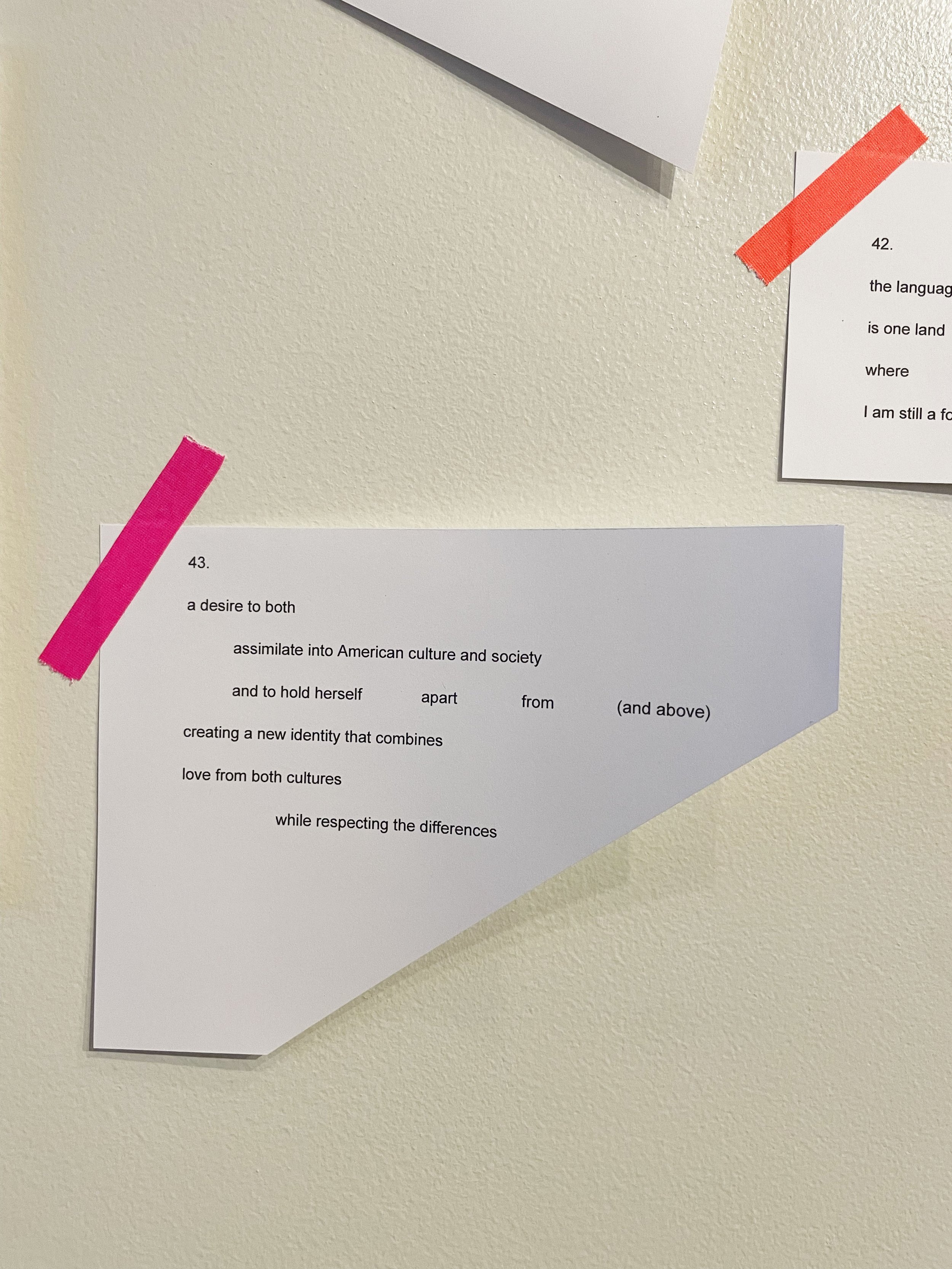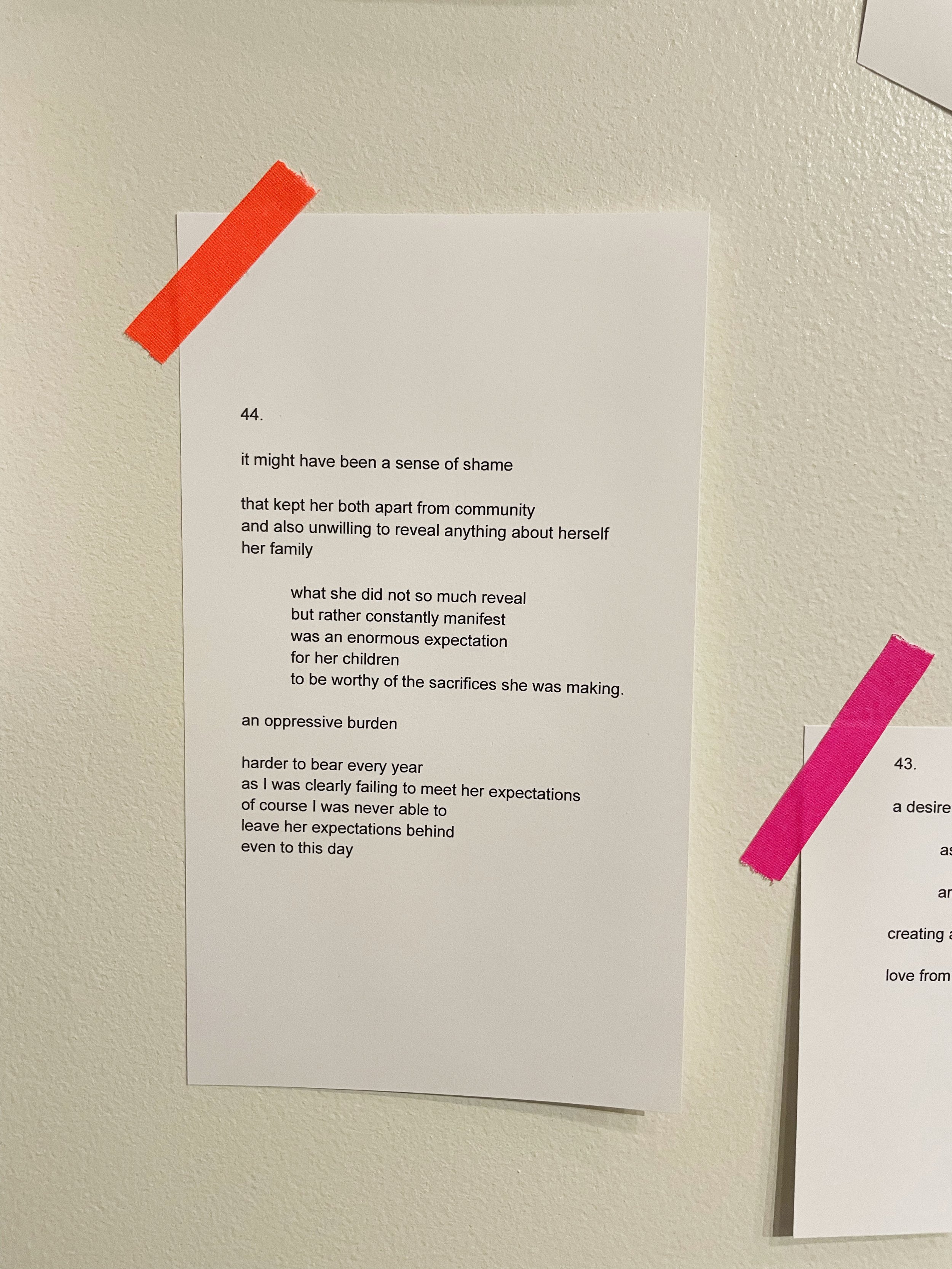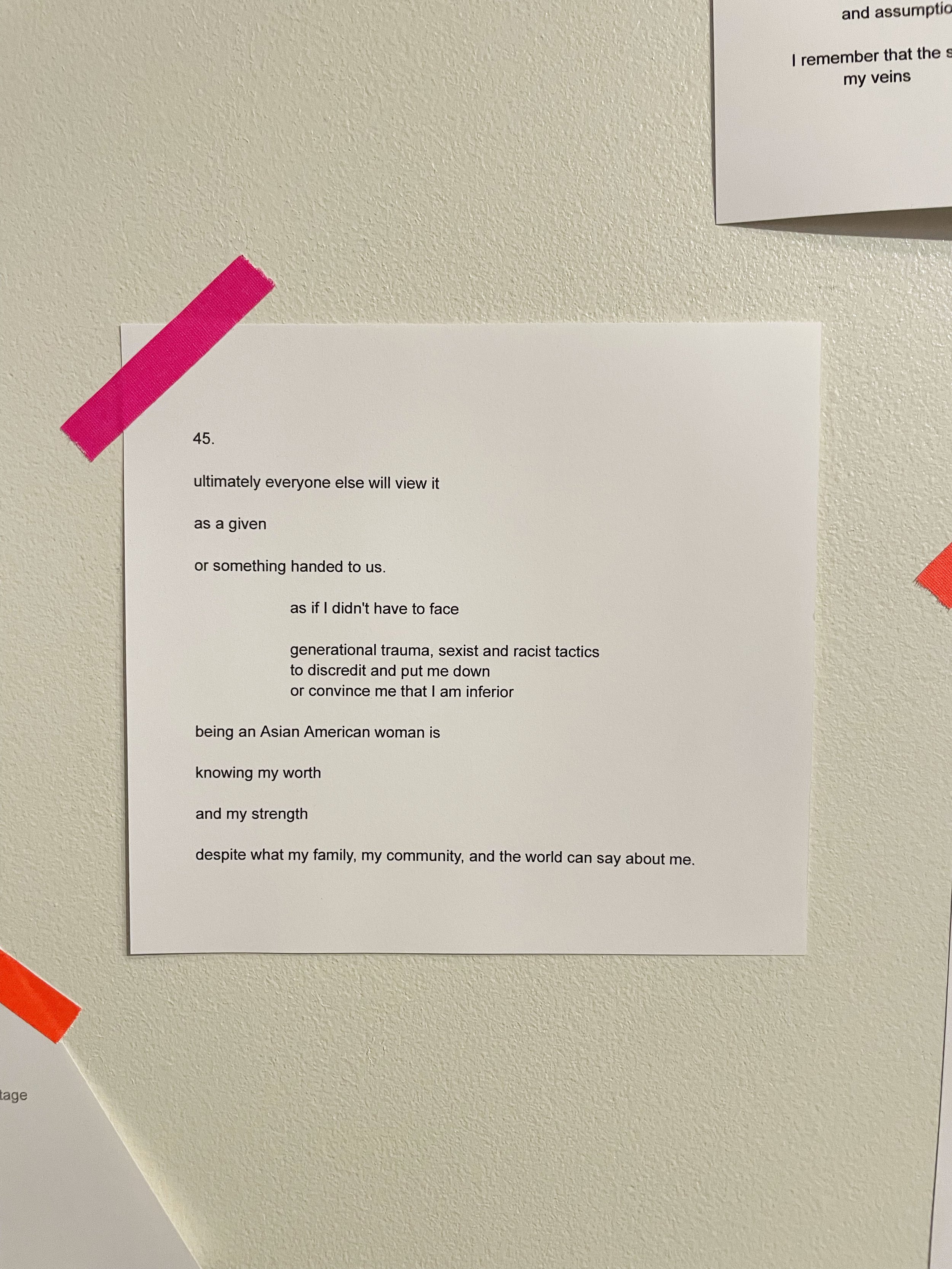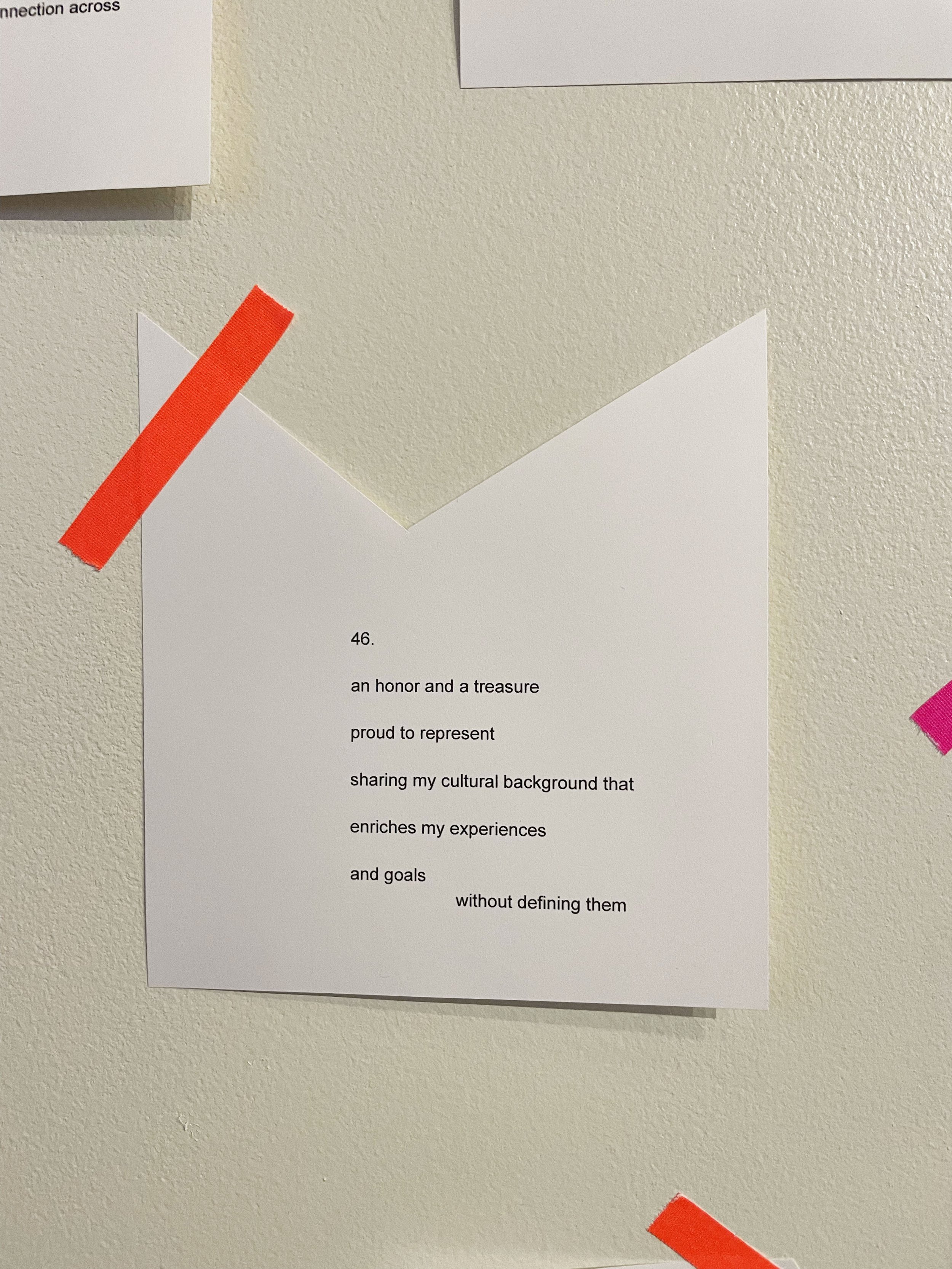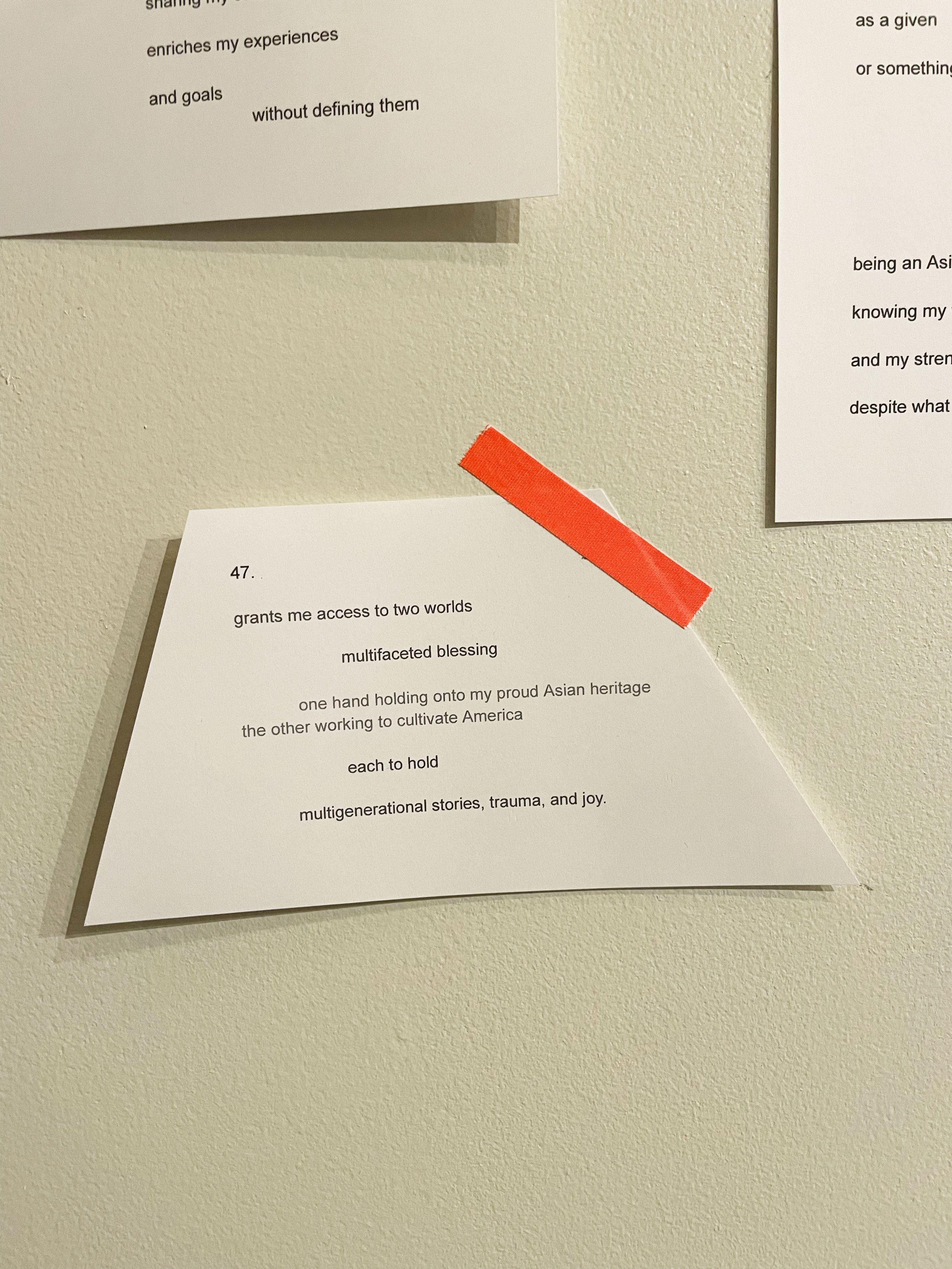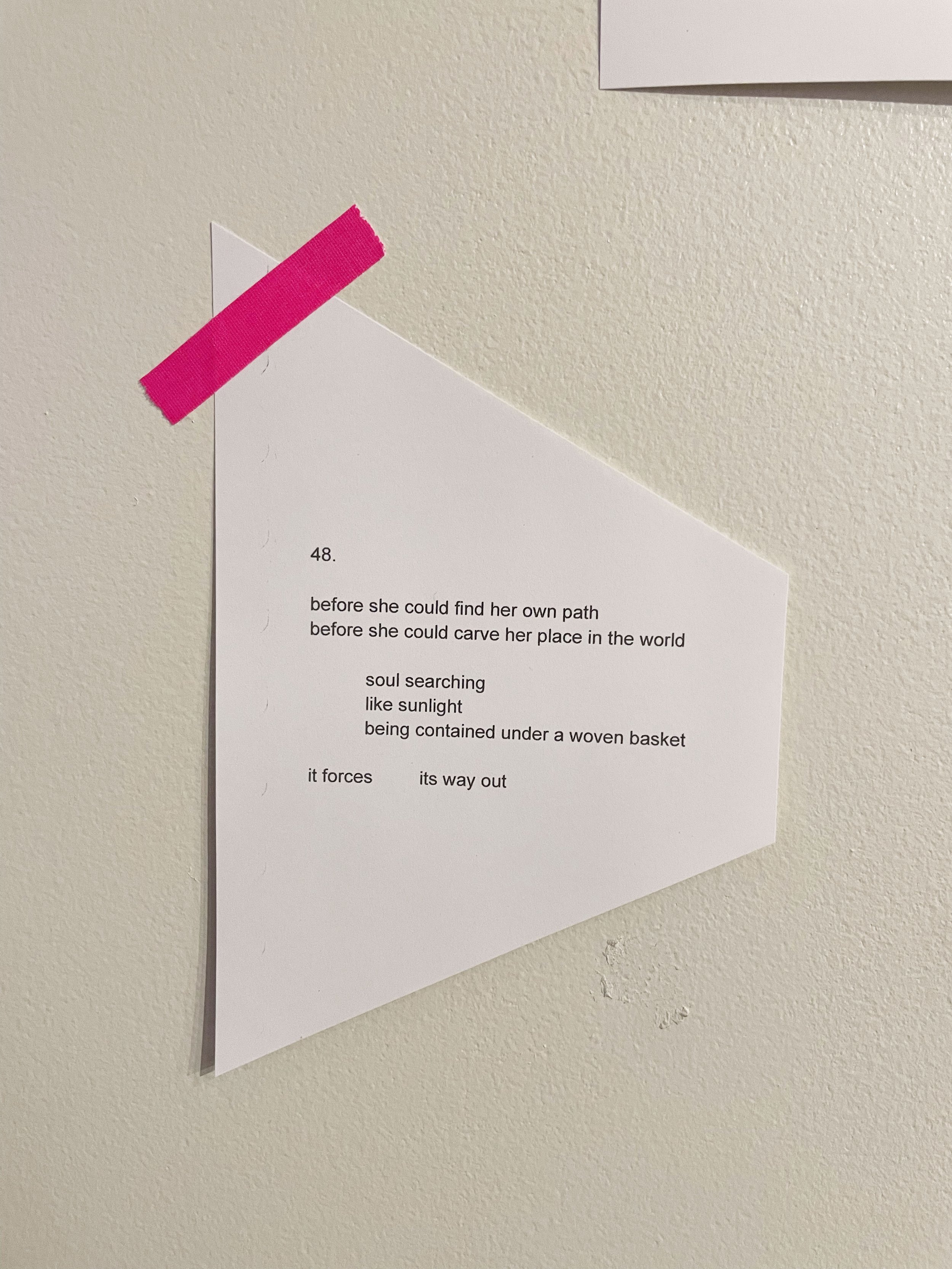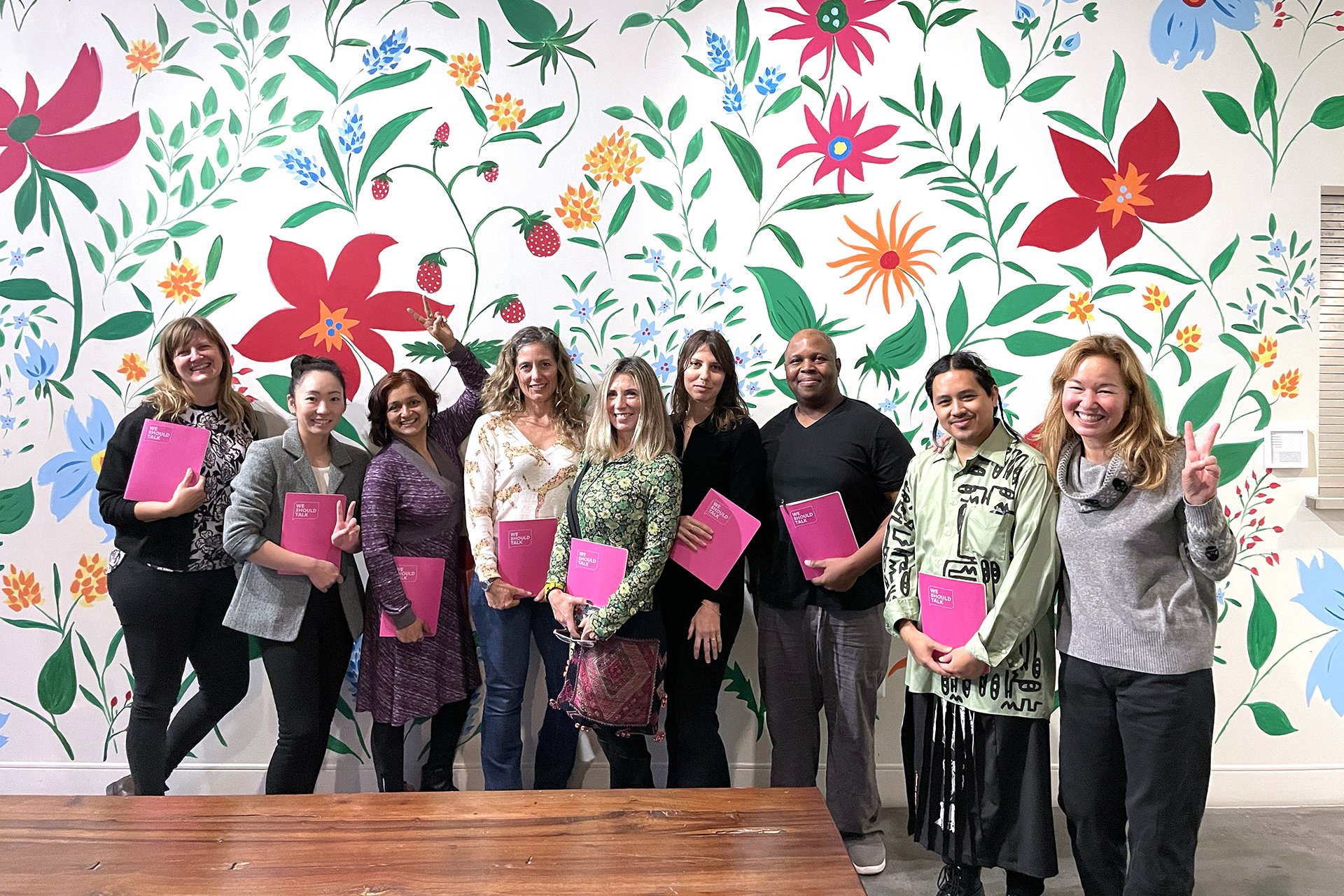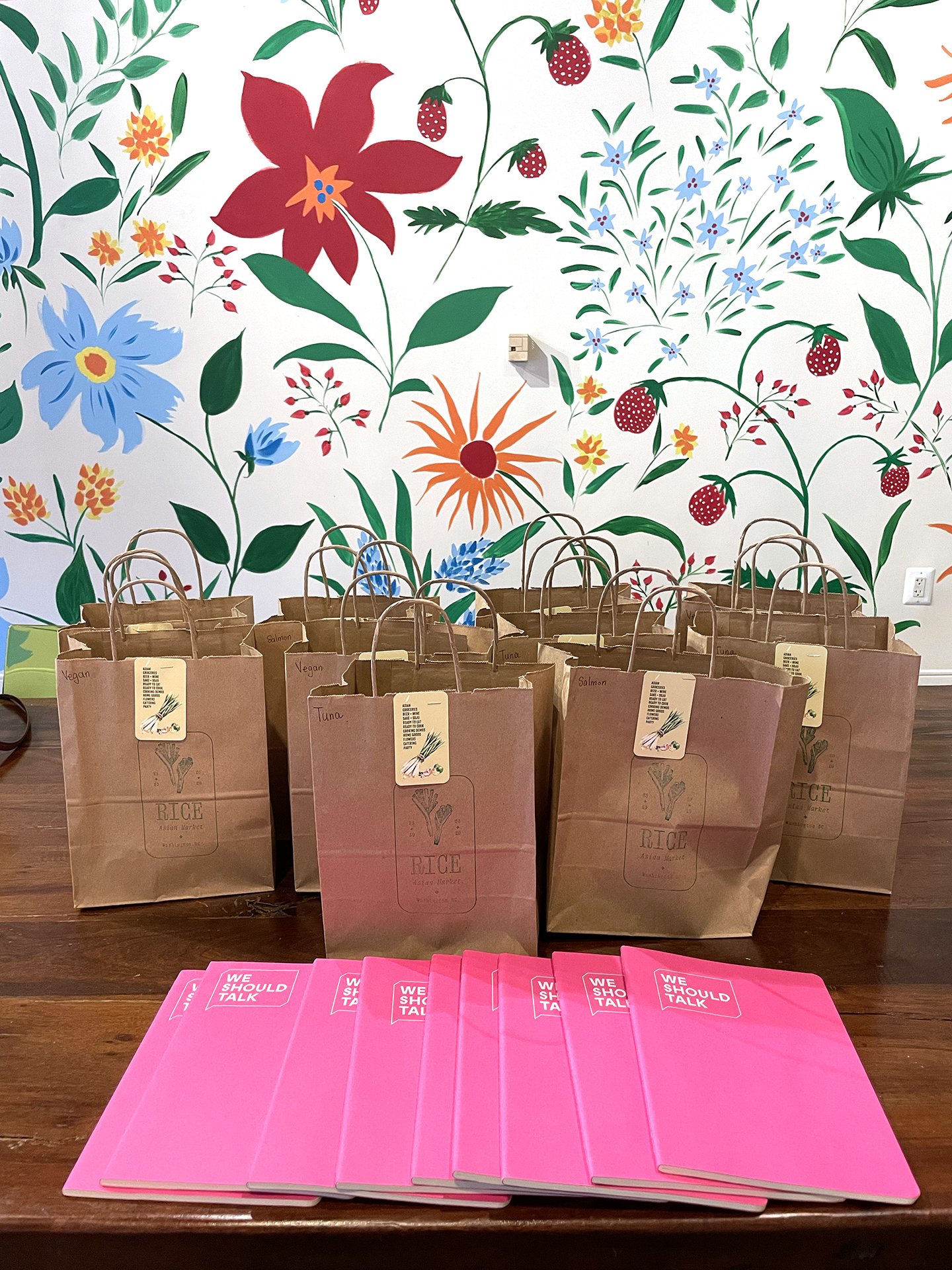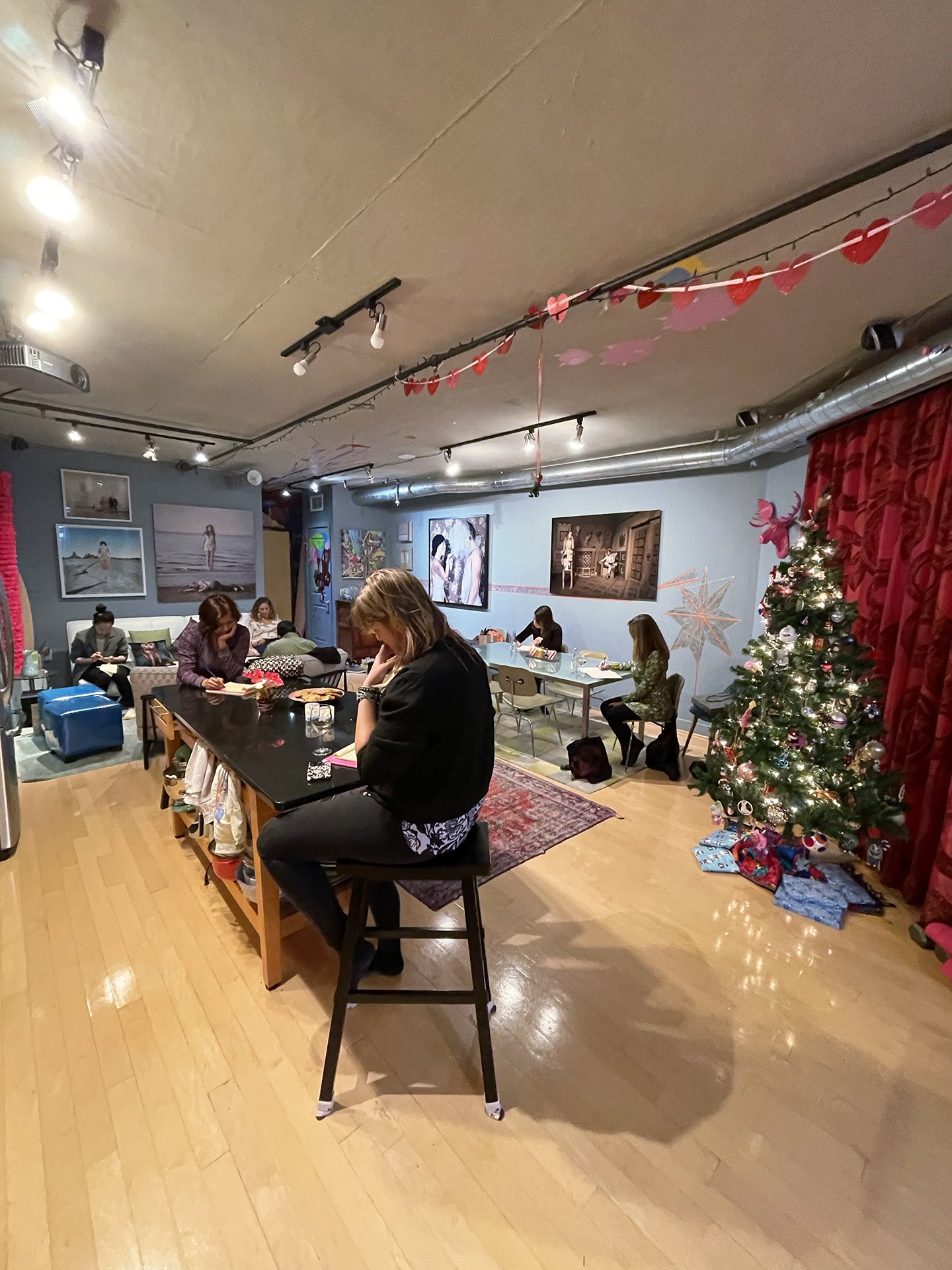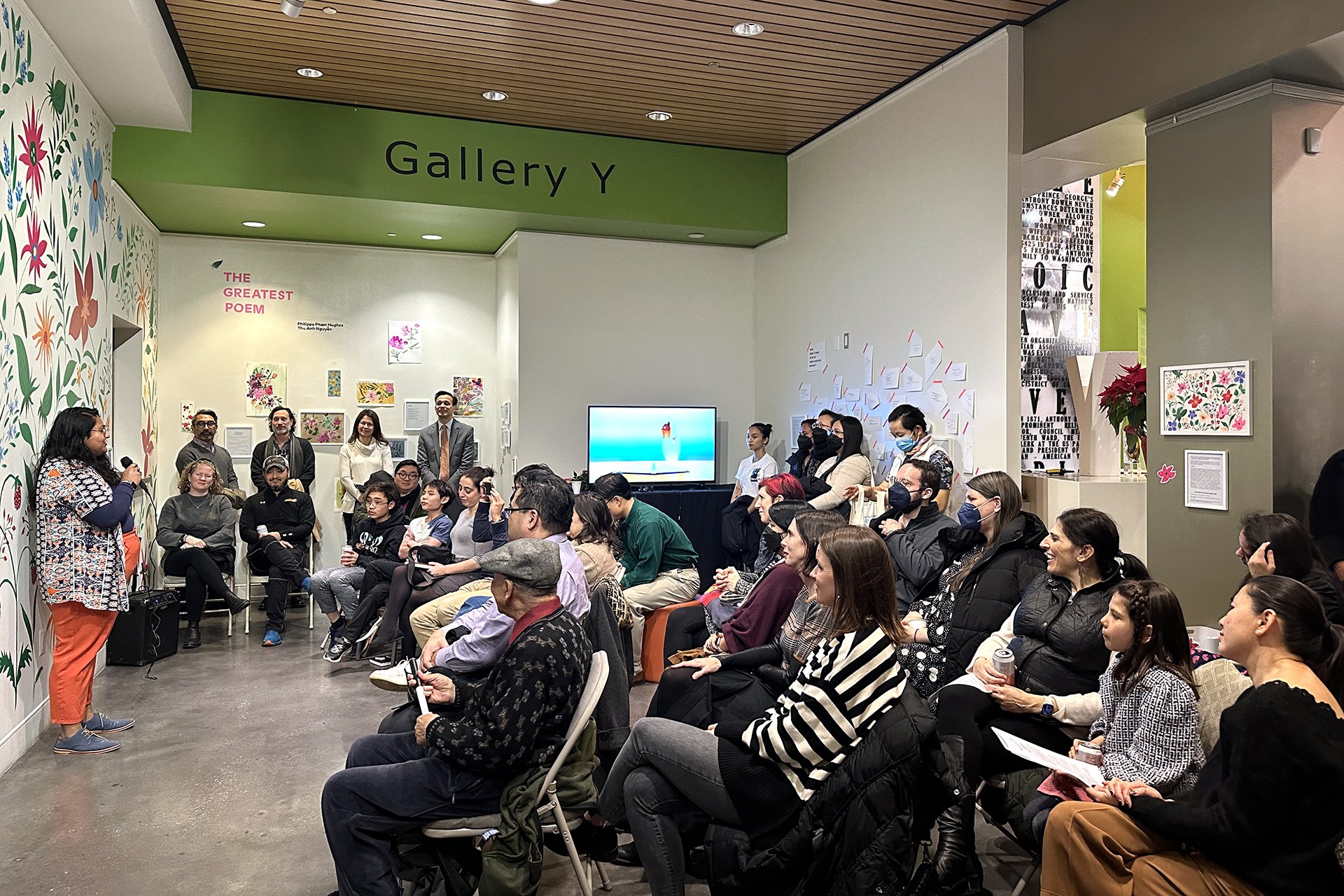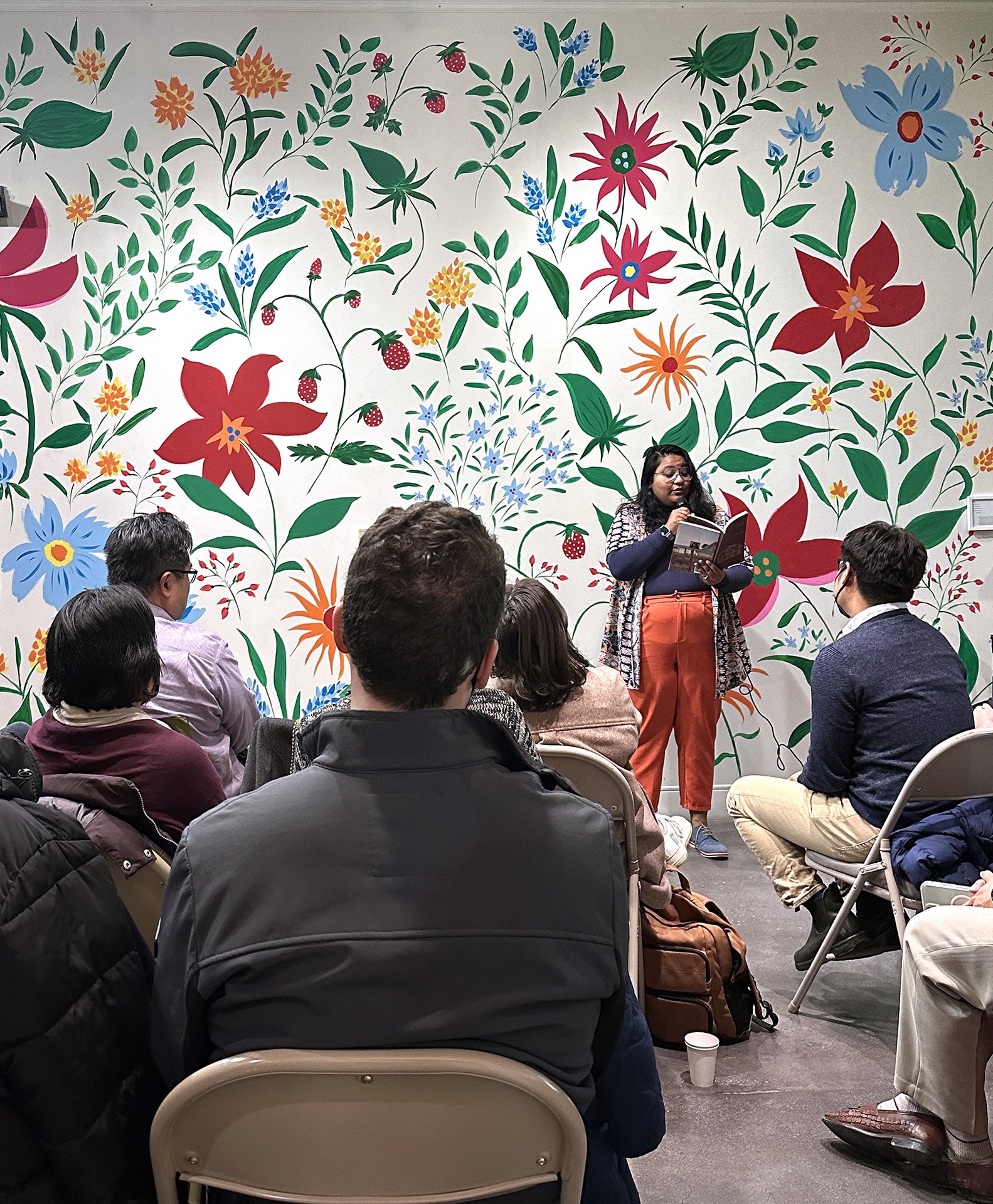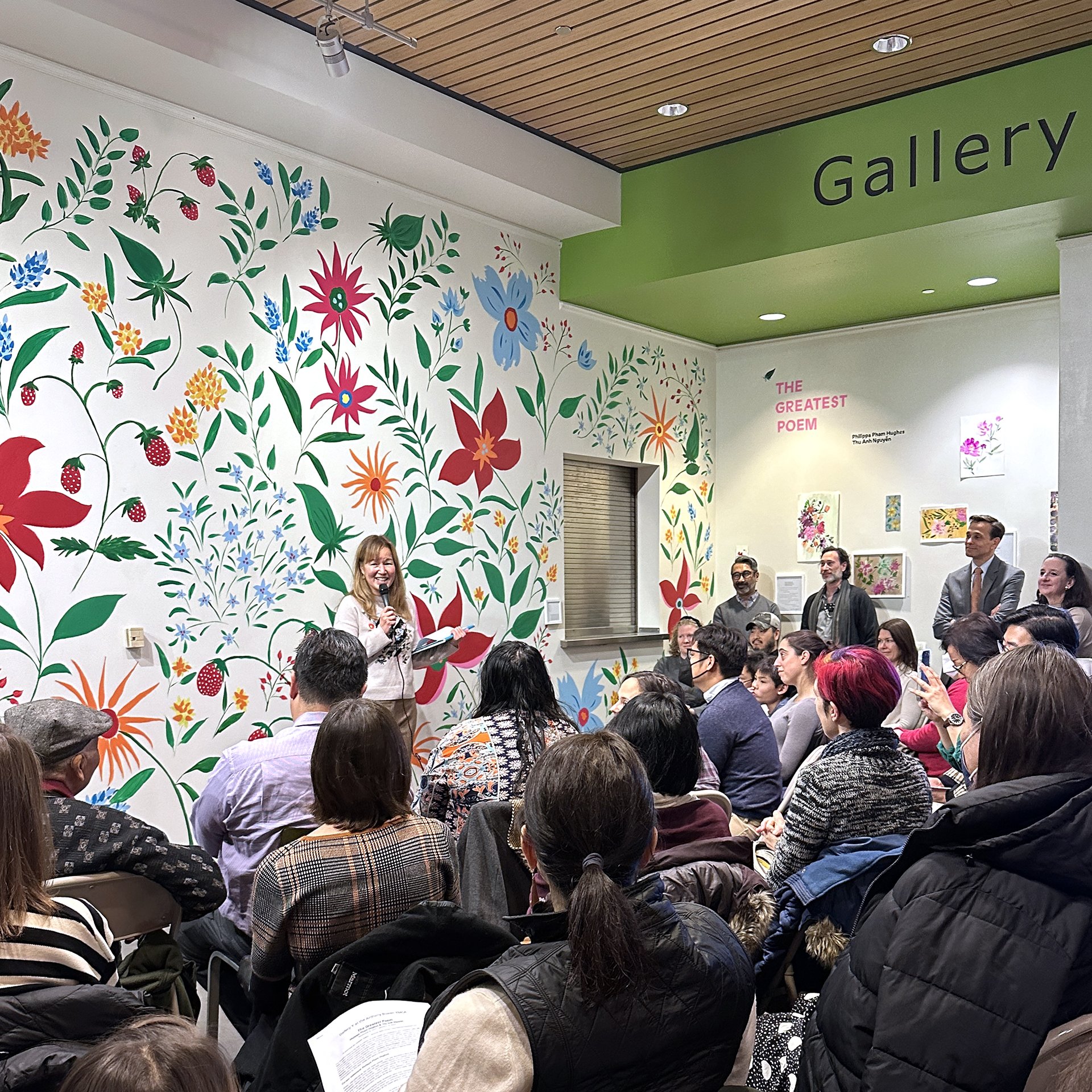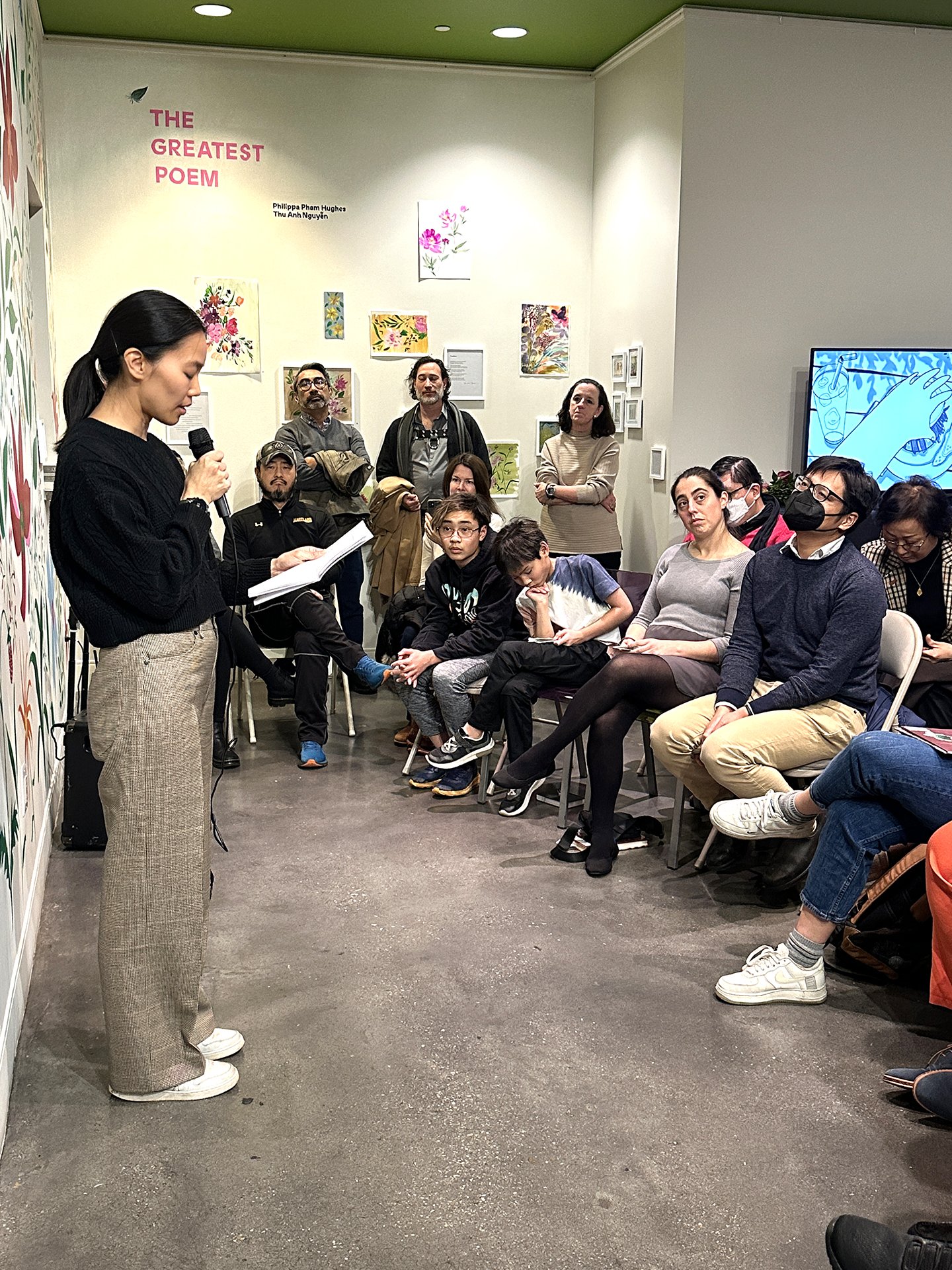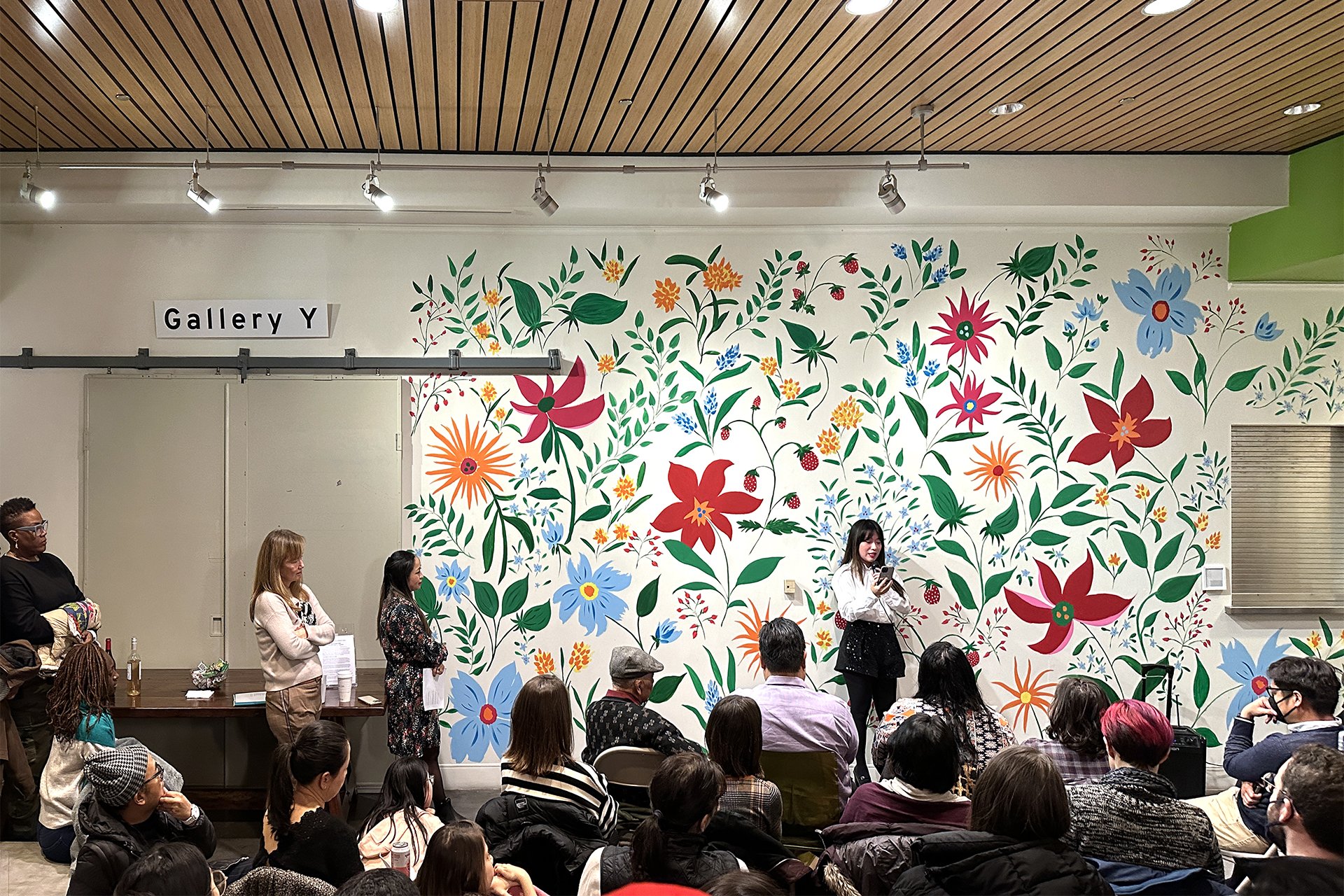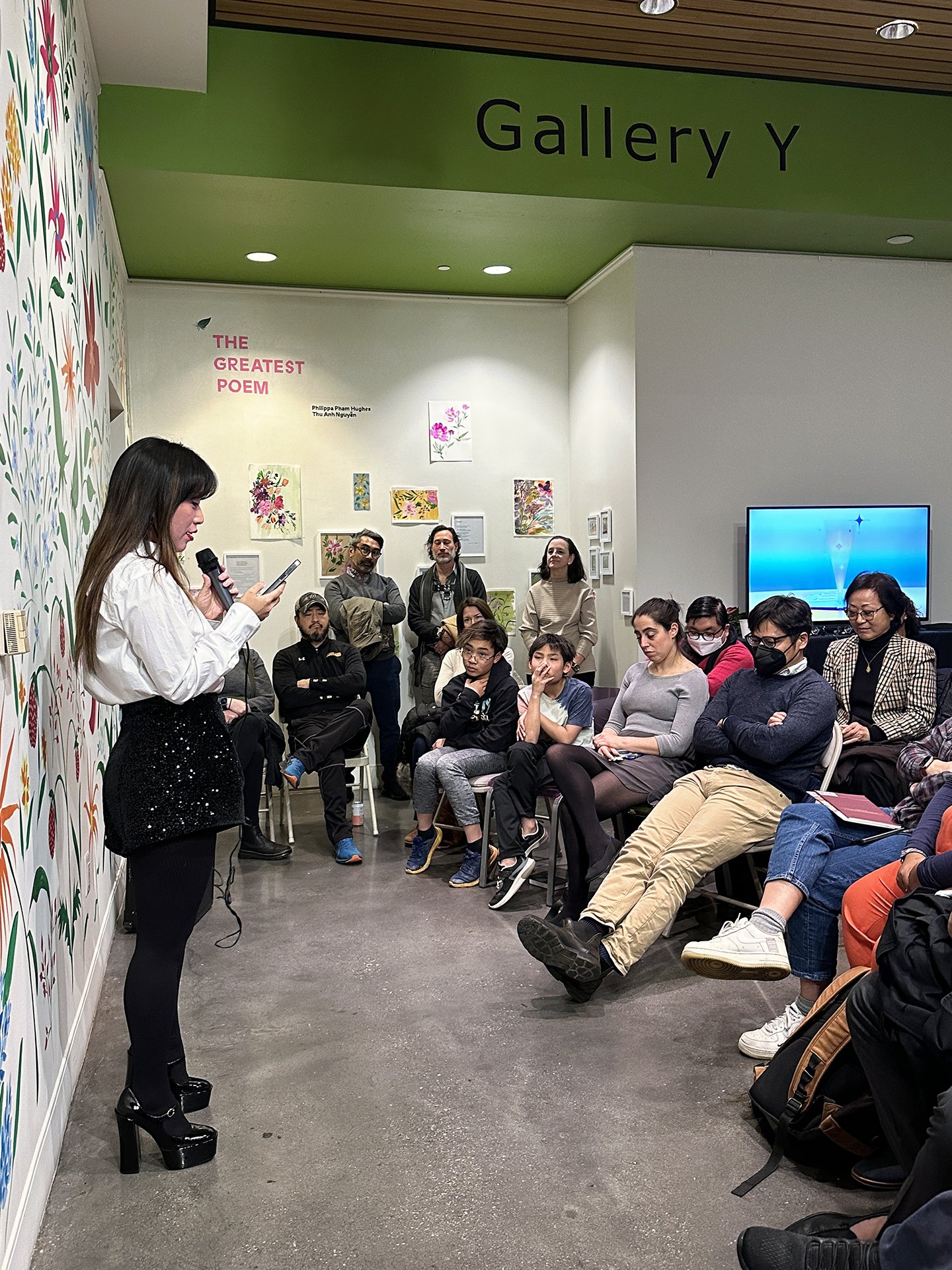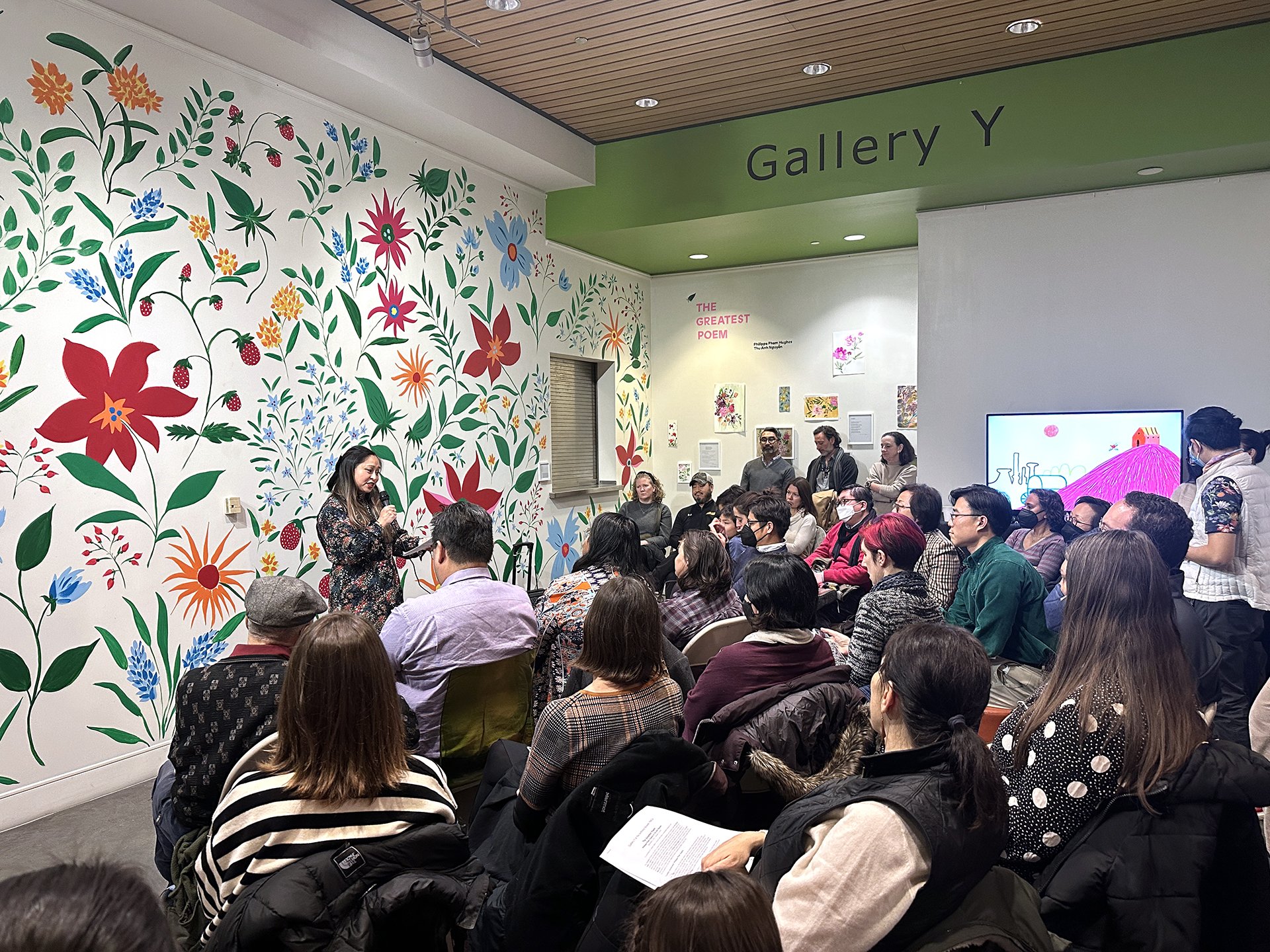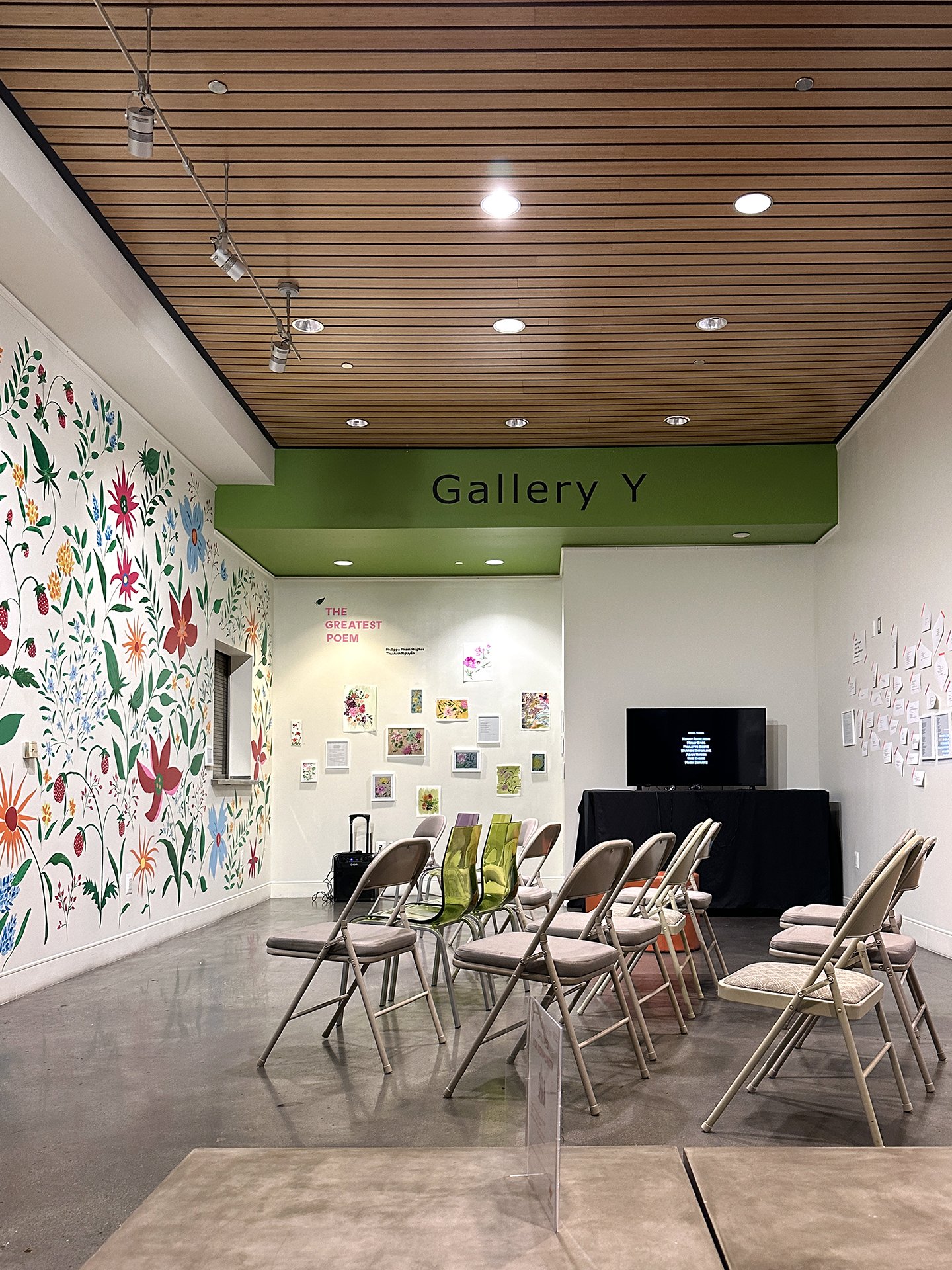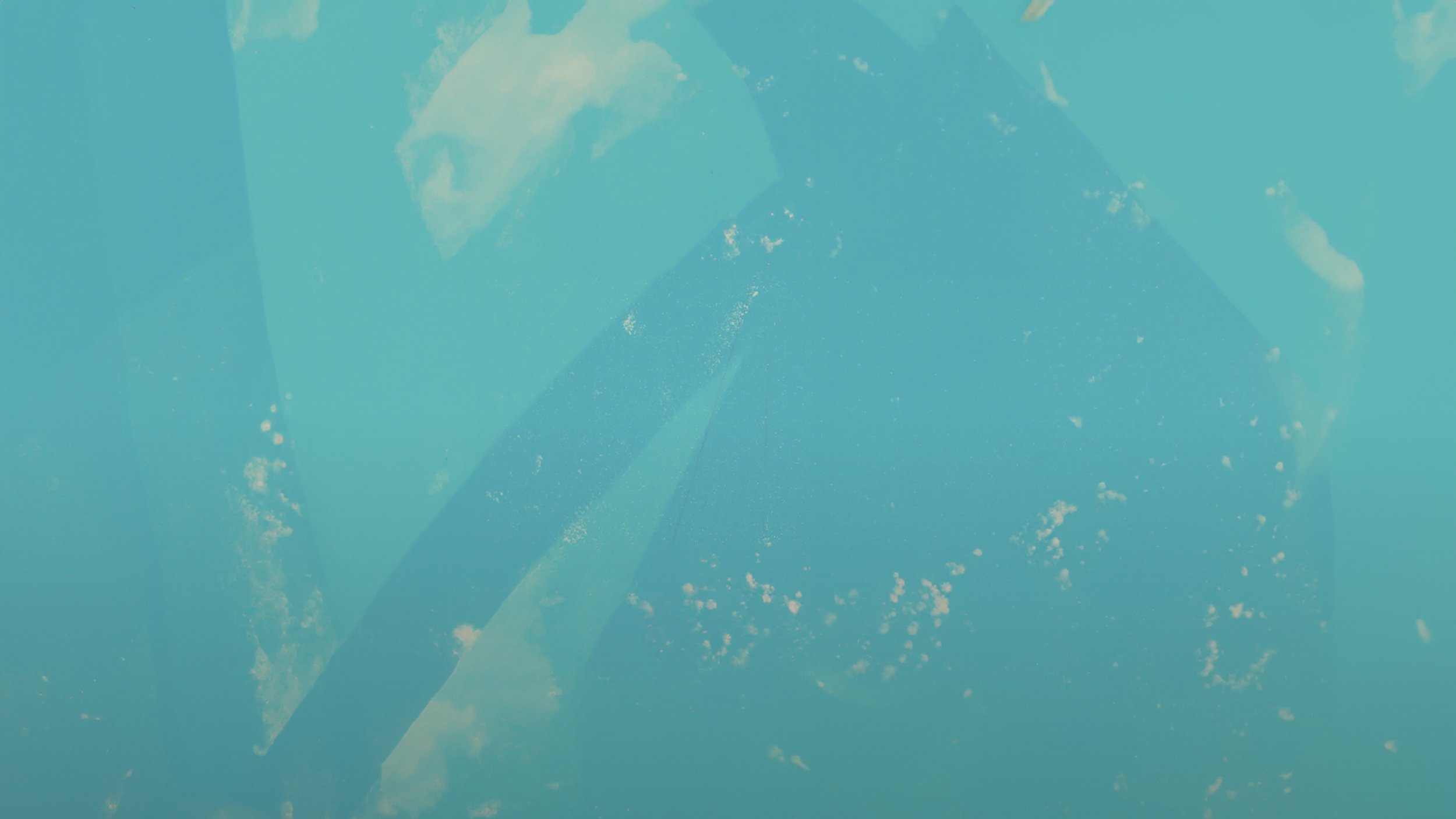
The Greatest Poem is the first in a series of multi-media art installations and programs called We Should Talk in which multi-disciplinary Asian American women artists create space to explore the nuances and complexities of what it means to be an Asian American woman.
NOVEMBER 8, 2023 – JANUARY 15, 2024
We Should Talk is led by curator and artist Philippa Pham Hughes and artists Adele 이슬 Kenworthy and Xena Ni. We apply an aesthetic of care and delight to creating relational spaces in which we share deeply and honestly, learn from one another, explore, and flourish together.
The Greatest Poem features: the paintings and poetry of Thu Anh Nguyen + micro essays and a short, animated film by Philippa Pham Hughes + expressions of Asian American identity from AAPI women across the country that have been turned into found poems by Thu Anh.
“A powerful project, ‘The Greatest Poem’ expands from considering the Asian American women’s experience to all who followed the road that led to this country, leaving behind all that shaped us — feeling here, there, but often in between.
Philippa’s animated film explores the concept of identity with touching honesty. Along with the colorful flower mural, the exhibition sends a message of hope and optimism. So, yes, let’s all talk!”
— MARIA KAREMETOU
“I really loved the incredible art and sense of community that was showcased at the event. The poems were magic — I think three times they made me turn to a stranger or someone I had just met (or drove them to turn to me) and dive into deep personal conversations about our journeys as AAPI women, and the tools and support systems that empower us to redefine ourselves.
Such a powerful demonstration of how sharing our stories can create thought-provoking and inspiring connections.”
— AYEH BANDEH-AHMADI
“In today’s world of superficial online interaction, sitting down face-to-face to share insights and ideas with a group of new friends is a rare occurrence. Philippa Hughes cultivates such environments through her artistic practice, and her recent workshop on ‘flourishing,’ complementing themes in her exhibition, ‘The Greatest Poem,’ continues to reverberate with me.
Philippa understands the power of the group and its potential to alchemize deep sharing into collective, exponential growth and impact. As I continue to explore ways to flourish in my own life, I consider ways our larger communities and ecosystems can bloom in turn.”
— SUZANNE PENDER
The short animated film The Greatest Poem was inspired by one of America’s greatest poets Walt Whitman, who said, “The United States themselves are essentially the greatest poem.” Whitman’s claim stemmed from a belief that both poetry and democracy derive their power from their ability to create a unified whole out of disparate parts. This film documents one part of Philippa’s journey to unifying her disparate parts as she discovers what it means to be American as the bi-racial daughter of a Vietnamese immigrant mother.
“The United States themselves
are essentially the greatest poem.”
— WALT WHITMAN
This film was directed by Elyse Kelly. The following artists contributed to its making: Jackson Ammenheuser, Nijah Brown, Nazli Cem, Cynthia Chu, Sofia Diaz, Selina Donahue, Katie Hackett, Angela Hsieh, Megan Jedrysiak, Mithra Krishnan, Eric Larson, Yoon Su Lee, Matea Losenegger, Catalina Matamoros, Rohan McDonald, Anna Mouyis, Dorca Musseb, Jen Pague, Sara Spink, Zoe Soriano, Dena Springer, Raechel Wong. This film was originally commissioned and presented by Arena Stage in 2022 and curated by Shanara Gabrielle for Arena Riffs.
AAPI women across the United States continue to share their expressions of Asian American identity with us by responding to the question: What does it mean to be an AAPI woman? Thu Anh Nguyen turns their beautiful words into found poems.
What is a found poem? Found poems take existing texts and refashion them, reorder them, and present them as poems. They are the literary equivalent of a collage. The words of the poem remain as they were found, with few additions or omissions. Decisions of form, such as where to break a line, are left to the poet.
What does it mean to be an AAPI woman?
stay up to date!
Subscribe to our mailing list to learn about We Should Talk programs and updates throughout the series.
DECEMBER 2, 2023
Reflective Writing Workshop on Flourishing
A small workshop in which participants reflected on what it means to create a flourishing world. We shared personal stories and wrote together as we envisioned a future in which everyone can flourish.
JANUARY 11, 2024
Poetry Reading
THE POETS
Ishanee Chanda
Sooji Choi
Thu Anh Nguyễn
Nida Sophasarun
Curator Statement: Philippa Pham Hughes
When I was growing up, the only Asian people I ever saw depicted in films and television were caricatures: the trope of the wise old sage, childlike figures who needed rescuing, and outright racist stereotypes meant to be ridiculed. I can’t remember reading books written by Asian American authors or featuring Asian American heroines. I had no Asian friends. My extended family lived in Vietnamese enclaves in Northern Virginia and Houston, while I grew up in a small Southern suburb of White people. When I spent time with my family, they’d remark on how different I looked from them and were always surprised when I ate particularly pungent things like a shrimp paste called mắm tôm.
Everything I learned about being Asian American came from misleading depictions that treated people with Asian faces as anything but American. Everything I learned about being Vietnamese was associated with a shameful war. I rejected the Asian and Vietnamese parts of me. I tried to be someone I wasn’t. It was only when I began to embrace all the truest parts of myself that I began to flourish, that I began to create myself.
I’ll never be a “real” Vietnamese person. I’m trying to figure out what it means to be American. I’m still learning what it means to be human and to be me from Thu, Adele, Xena, and all the other powerful women in my life. It’s a lifelong journey and this garden of flowers and poetry I’ve cultivated is one small step along the way to creating a world in which everyone flourishes, blossoming and growing together.
ABOUT THE ARTIST
Philippa Pham Hughes is a Social Sculptor, Cultural Strategist, Curator, Visiting Fellow at the SNF Agora Institute at Johns Hopkins, and Resident Artist at the University of Michigan Museum of Art. She applies relational thinking and an aesthetic of care and delight to her work in democracy building, civic engagement, and repairing the social fabric of our country one creative conversation at a time. Philippa draws from the arts and humanities to design spaces for honest conversations across political, social, and cultural differences. She has produced hundreds of creative activations since 2007 for people who might not normally meet to engage with one another in unconventional and meaningful ways. She also curates multi-disciplinary art exhibits & experiences. These relational experiences build social capital, social cohesion, and social discourse. She is a curious and lateral thinker whose multi-disciplinary practice is informed by sociology, psychology, philosophy, political science, history, community organizing, design thinking, creative placemaking, art, and humanities.
Philippa has spoken internationally, including SXSW, TEDxAmericanUniversity, Placemaking Week Amsterdam, University of Michigan's Penny Stamps Speaker Series, Fort Worth Women's Policy Forum. Her work has been featured by artnet, CNN, PBS Newshour, CityLab, and The Washington Post. Philippa’s mission: to create a society in which all humans flourish.
Photo by Jared Soares for The New York Times
Artist Statement: Thu Anh Nguyen
Everything I do is rooted in my Vietnamese American, immigrant experience. When I was very young, I noticed that so many Vietnamese women, including my aunts and cousins, were named after flowers. I knew my name was not a flower. When I asked my father about it, he told me that when he named me, he wanted my name to be more than decorative and that my name meant ‘wisdom.’ He hoped I would grow up to become a scholar.
So much of my immigrant experience has been trying to live up to my parents’ expectations — tending to those strong roots they planted — and also growing into myself, and blossoming where I found sun. First, I became a scholar like my father wanted, and I studied and taught poetry. Then, because art has always helped me express my identity most fully, I became a painter. I paint in the language of florals because they are part of the history of my people. Flowers have mythological significance across cultures. In Hamlet, we have rosemary for remembrance and daisies for innocence. Some of us give red roses to symbolize love. Celebrations are often overflowing with flowers. And when someone is sad or needs comfort, we turn to flowers as well.
Even though my parents decided to break with the tradition of naming me after a flower, I am somehow circling back to it in my work. Traditions aren’t so easy to break, after all. Our names are flowers, our songs are flowers, our food is flowers. If I could paint a woman, her mouth would be open and flowers would be spilling out of it. I have painted all these flowers for you, for us.
ABOUT THE ARTIST
Thu Anh Nguyen is an educator and writer whose work centers around equity and justice. Thu is currently on the National Staff of SEED (Seeking Educational Equity and Diversity). The National SEED Project partners with communities, institutions, and schools to develop leaders who guide their peers in conversational communities to drive personal, institutional, and societal change toward social justice. SEED leaders design their SEED seminars with the flexibility to adapt them to their own local needs. They include personal reflection and testimony, listening to others' voices, and learning experientially and collectively, in the context of each participant’s intersecting identities. Through this methodology, SEED equips participants to connect our lives to one another and to society at large by acknowledging systems of power, oppression, and privilege. Thu is also facilitating one community-based SEED group with her co-facilitator Rebecca Farnum.
Thu has taught English, Creative Writing, and History for almost twenty years, most recently at Sidwell Friends School in Washington, DC. Thu Anh has led workshops and writes essays about cultural competence and literacy. She is also a published poet. Her writing has been published in Literacy Today, the Southern Humanities Review, the Cider Press Review, and the Crab Orchard Review. She has been honored with a Writing Residency from the InnerLoop Writers Series in Washington, DC. When she is not teaching or writing, Thu Anh is also a watercolor painter and calligrapher who paints large-scale floral powers for social justice movements such as Black Lives Matter and Say Her Name.
CURATOR
Philippa Pham Hughes
MURALIST & POET
Thu Anh Nguyen
PROJECT MANAGEMENT
Rosana Vollmerhausen
ARTIST ASSISTANTS
Nalee Kim
Ashley Jaye Williams
“WE SHOULD TALK” TEAM
Philippa Pham Hughes
Xena Ni
Adele 이슬 Kenworthy
DESIGN
Ashley Wu
GALLERY Y DIRECTOR
Beth Ferraro
CONTRIBUTORS
Amrith Kaur Aakre, Faye Alexander, Beverly Au, Amanda, Anonymous, Marissa Baccam, Aerica Shimizu Banks, Melissa Bisagni, Monica Jehan Bose, Naomi Macalalad Bragin, Brinda, Kate Chang, Sally Chen, Alex Chester-Iwata, Melissa Chimera, Jennifer Cho, Julia Chon, Elaine Hsieh Chou, Rep. Judy Chu (CA-28), Tram Colwin, Monica Conroy, Sarah Du Kinder Cook, Catherine Denniston, Kristy Drutman, Dr. Ramani Durvasula, Bay Fang, Helen Gym, Harriet, Alessandra Hodulik, Giuliana Hodulik, Harmony Hoogs, Hannah Hoong, Eunice How, Alice Hu, Isabella Hughes, Karin Hung, Natalie Hung, Rep. Pramila Jayapal (WA-7), Siny Joseph, Laura Kadi, Monica Kang, Manjit Kaur, Jane Kim, Nalee Grace Kim, Reth Kim, Rep. Young O. Kim (CA-40), Chris Kohatsu, Tanya Lee-Koller, Sherin Koshy, Sweta Kumar, Grace Dahye Kwon, Hosan Lee, Tanya Lee, Amazin LeThi, Karen "Ten-Ten" Lin, Joanne Liu, Bernadette Loyola, Shilpi Malinowski, Madalene Isabel Manalo, Xuan-Trang Mielke, Pallavi Mittal, Nancy Miyahira, Anu V. Nanjappa, Jay Newton-Small, Nancy Ngo, Catherine Thuy Nguyen, Xena Ni, Serin Oh, Maria Olsen, Aryani Ong, Shin Yu Pai, Valerie Plesch, Mari Putney, Sheilla Sajady, Yasameen Sajady, Dina AZ Salem, Cicie Sattarnilasskorn, Christina Sevilla, Aman Kaur Shergill, Stacey Sagara Shigaya, Yukari Simpson, Harleen Singh, Nikki Singh, Deb Sivigny, Christina Soontornvat, Mea Aloha K. Spady, Leina Ramos Stowers, Linda Sun, Daranee Teng, Tanya Sangpun Thamkruphat, Naina Singla, Dr. Julie Tran-Olive, Doris Truong, Kotoe Tsukiyama, Tina Villadolid, Christina Vo, Rosana Hemakom Vollmerhausen, Dr. Purnima Voria, Alice Wong, Kim J. Wong, Tina Worden, Roberta Yang, Angel Yau, Deborah En-Qi Yim, Laura Young
This project received Federal support from the Asian Pacific American Initiatives Pool, administered by the Smithsonian Asian Pacific American Center.
VENUE
Gallery Y at the Anthony Bowen Branch YMCA


